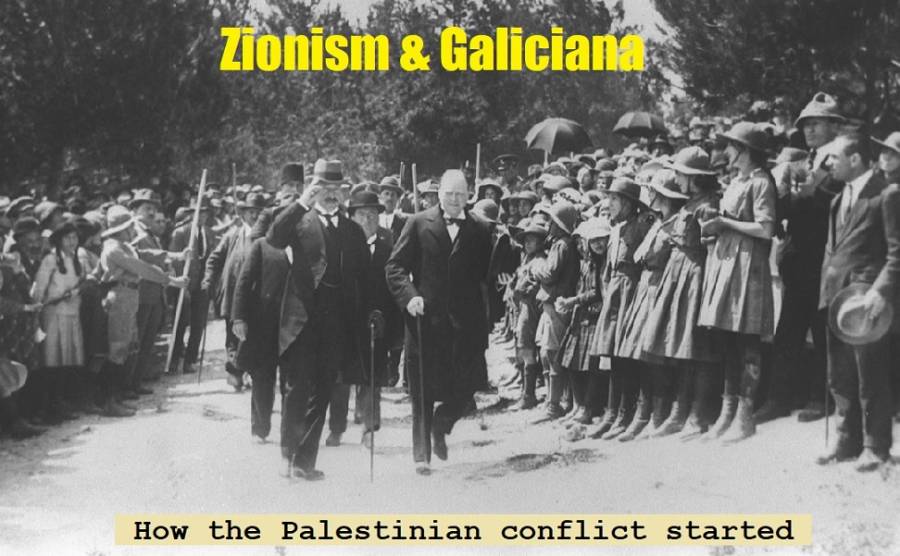
Winston Churchill and Sir Herbert Samuel (1921). Source: Times of Israel. Public Domain.
Author: Eduardo Freire Canosa

Author: Eduardo Freire Canosa
The object of this webpage, "Zionism & Galiciana," is to offer a novel backdrop to the gestation of the modern State of Israel. Selected excerpts from four classic Zionist works are juxtaposed with clippings of contemporary Galician newspapers.
The four Zionist authors are Moses Hess (1812-1875), Leon Pinsker (1821-1891), Theodor Herzl (1860-1904) and Ziv Jabotinsky (1880-1940).
Their classic works are "Rome and Jerusalem" (1862), "Auto-emancipation" (1882), "The Jewish State" (1895) and "The Iron Wall" (1923). The first three were originally written in German, and the fourth in Russian. The source of a translation to English or to Spanish is the Internet Archive for "Rome and Jerusalem," Araucaria for "Auto-emancipación," Masuah for "El Estado Judío" and the Jabotinsky Institute in Israel for "The Iron Wall." All Spanish text is translated to English by the author.
"Galiciana" is the name of the online Digital Library of Galicia. The website is managed by the Central Library of Galicia and is sponsored by the regional government. Xunta de Galicia launched the project officially on June 15, 2012. By the close of 2013 the digital library boasted more than 147,000 pages of monographs, charts and pamphlets, and more than 87,000 pages of historical Galician periodicals and newspapers. The access to the collection is free and open to everyone.
The government of Spain was not interested in the events of Palestine or the progress of Zionism over the historical period covered by this work, and secular Galician newspapers reflected this.
Only the Catholic press displayed keen interest in both topics after the fall of Jerusalem in 1917 and the onset of the British Mandate in 1919. The main concern of the Roman Catholic Church was its diminished influence in Palestinian affairs and the second-class status given to its enclaves and sanctuaries under the Mandate. Well-informed Galician newspapers and periodicals of Catholic stripe subsequently criticized Zionism sharply together with the unqualified British support for it.
Lengthy articles and news stories hearken back to events at least a hundred years old. The focus is on the plight of the Jews in Europe, on Judaism, Zionism and Palestine. This "News from Galiciana" section runs from April 10, 1813, to December 1, 1923.
Whether you are pro- or anti-Zionist or indifferent, the data presented, the news reports and the arguments given will probably rivet your curiosity.
IndexClicking on a number will take you to the corresponding chapter right away |
|
1. Years 1813-1859: Death throes of the Spanish Inquisition
2. Moses Hess 3. Years 1867-1882: The French haven 4. Leon Pinsker 5. Years 1883-1892: The English haven 6. Theodor Herzl 7. Year 1897: Zionist Congress in Basel 8. Years 1898-1900: What do Zionists want? 9. Years 1902-1906: Diary of a Spanish pilgrim to the Holy Land 10. Years 1907-1911: Eighth Zionist Congress 11. Year 1912: Benito F. Alonso 12. Year 1913: Colonel Alfred Redl. Mendel Beilis. 13. Year 1914: Benito F. Alonso (II) 14. Years 1914-18: The First World War in Palestine 15. Years 1919-23: The British Mandate of Palestine 16. Ziv Jabotinsky 17. Can England have fared better in Palestine? |
April 10, 1813. Los guerrilleros por la religión, la patria y el Rey, diario polémico-religioso de la Coruña, month IV, number 74, pages 195-96.
Adiáforo. You said prior some stuff about tolerance, Philaleto, wanting to insinuate that a bit of this methodology seeps into the paper of the abbé of Valdeorres.1
Philaleto. Read what the pamphlet full of piffles says, Adiáforo, and you will see that on pages 43 and 44 its learned author stamps a dark libel on the good inquisitor Lucero,2 presents as fact that the Inquisition 3 hangs Jews from the pulleys merely for being Hebrews and likes this Jewish people of today to be still the one of whom God said, "Israel is my son." It is apparent that the good Doctor has not read holy Scripture much and that he stands in need of Franklin 4 teaching him a few lessons. If Jews are the sons of God they must be so through the flesh because they descend from Abraham, but what does the Apostle say? "Not all those tallied as Israelites are Israelites nor all those who descend from Abraham are his sons, but only they who receive the promises delivered by God to Abraham; however these branches are presently cut off from their trunk, propter incredulitatem fracti sunt" (Rom. II). Who then gave our Doctor of new lights licence to tag "son of God" a people whom God censured for their disbelief and stubbornness? And why is this illuminato so generous to and so compassionate an advocate of the Jews when he should know, being a prelate, that neither the Church—mother so compassionate—nor he himself—whom I presume during Mass prays to and intercedes before God for all pagans and heretics—prays for the Jews? Does he not realize that these are the most resolute and obstinate enemies of Christianity, and that if they could but for a moment erase it from the face of the earth they would sacrifice all their wealth and cash to do so?
February 15, 1850. Revista Médica, periódico de la Academia de Emulación de Santiago, year 1850, number 48, page 240.
The widespread use of jennet's milk in illnesses derived from lassitude or from thoracic diseases was initiated in France by a Jew during the monarchy of Francis I. This king felt surpassingly weak; the fatigues of war and intemperance whittled him down to a state of languor that worsened each day. The king was told about a Jew of Constantinople who had the reputation of curing this type of ailment. Francis I sent a letter to his ambassador in Turkey with the charge of bringing the Israelite physician at all costs. He arrived, and the only remedy he prescribed was jennet's milk. This remedy had an excellent effect; at once all the courtiers, male and female, took up the same regimen.
December 24, 1856. La Oliva: periódico de política, literatura e intereses materiales, year I, number 94, page 1.
The situation of the Jews has improved markedly under the present government of Russia.1 Today they can send their children to institutes of privileged learning. Furthermore medical doctors and lawyers may become civil servants of the State, and the five-year exemption from military service will prove very advantageous to this class of citizens. The deputies who observe the Jewish religion will convene shortly in St. Petersburg to agree on various points for improving the lot of the Israelites.
July 16, 1859. Boletín para el clero del Obispado de Lugo, year 1859, number 29, page 1.
Since the Lord has wanted to make use of Moses to establish the Jewish religion, which is the first foundation of Christianity, the name of the holy Prophet and his writings are insufferable to skeptics, and for that reason, they spare nothing to obliterate even his memory...
It is true that Jews and Christians have always regarded him as a great prophet. Why then maliciously deprive him of a glory that is rightly his, acquired long ago? All the more is that glory grounded when characters of truth are detectable in his text: he instructs us concerning the creation of the world, he transmits his sacred conversations with God and gives us the noblest idea of the Creator that human understanding can fathom. The text portrays the Creator's divine perfections in the warmest colours and prescribes laws full of equity and most capable of preserving the union and instituting good order. What is reprehensible about this? Should one mistrust a man who reasons so well and whose humbleness reaches the extreme of revealing his defects to us?
God makes use of Moses to lead a predilect people and authorizes his mission with the greatest wonders, those marvels he recounts in his books. Can this be a reason for treating him like an impostor when ours are more potent for regarding him as a holy Prophet? Can we with any justice refuse to believe him when he relates to us what he has seen and done, especially when a great body like the Jewish nation attests on his behalf?
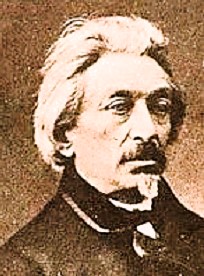
Source: Wikipedia.
Moses Hess (1812-1875) was a German-Jewish philosopher, early Communist and Zionist thinker. He was born in Bonn under French rule at the time. He married a poor Catholic seamstress, Sibylle Pesch, "in order to redress the injustice perpetrated by society." Although they remained happily married until Hess' death, Sibylle may have had an affair with Friedrich Engels as he was smuggling her from Belgium to France to be reunited with her husband. Sibylle claimed the relationship was non-consensual and accused Engels of rape. Marx, Engels and Hess had taken refuge in Brussels in 1845 and lived on the same street. By the end of the decade, however, Marx and Engels had fallen out with Hess. Hess died in Paris in 1875. He was buried in the Jewish cemetery of Cologne. In 1961 he was re-interred in the Kinneret Cemetery of Israel along with other Socialist-Zionists. He is considered a pioneer of Labour Zionism. Full article here.
From the time that Innocent III evolved the diabolical plan to destroy the moral stamina of the Jews (the bearers of Spanish culture to the world of Christendom) by forcing them to wear a badge of shame on their garments, until the audacious kidnapping of a Jewish child from the house of his parents (which occurred under the government of Cardinal Antonelli) Papal Rome symbolizes an inexhaustible well of poison to the Jews.1,2 It is only with the drying-up of this source that Christian German Anti-Semitism will die from lack of nourishment (p. 35).
The great teachers of the knowledge of God were always Jews. Our people not only created the noblest religion of the ancient world, a religion which is destined to become the common property of the entire civilized world, but continued to develop it, keeping pace with the progress of the human spirit. And this mission will remain with the Jews until the end of days, i.e., until the time when, according to the Promise of our Prophets, the world will be filled with the knowledge of God. The "end of days", so often spoken of by the Prophets, is not to be understood to mean, as some misinterpret it, the end of the world, but it denotes the period when the development and education of humanity will reach their highest point (pp. 47-48).
It seems that on account of the hatred which surrounds him on all sides, the German Jew is determined to estrange himself from Judaism as far as possible, and endeavours even to deny his race. No reform of the Jewish religion, however extreme, is radical enough for the educated German Jew. But the endeavours are vain. Even conversion itself does not relieve the Jew from the enormous pressure of German Anti-Semitism. The German hates the Jewish religion less than the race; he objects less to the Jews' peculiar beliefs than to their peculiar noses. Neither Reform nor conversion nor emancipation throw the gates of social life open to the Jew, hence his anxiety to deny his racial descent (pp. 58-59).
To our educated German Jews, the feeling of hatred toward the Jews displayed by the Germans has always remained an unsolved puzzle. Was not the entire effort of German Jews since the days of Mendelssohn 1 directed toward becoming wholly Germanized, to thinking and feeling as Germans? Have they not striven carefully to eradicate every trace of their ancient nationality? Have they not fought in the "War of Liberation"? Were they not Teutomaniacs and French devourers? Did we not chant but yesterday with Nicholas Becker, "They shall not possess it, the free German Rhine"? 2 Did I myself not commit the unpardonable stupidity of sending a musical composition of this "German Marsellaise" to the author of this song?
And yet I had to feel, in a personal way, the same disappointment that German Jewry in general experienced after it had given repeated demonstration of its patriotic enthusiasm. I also had to experience the sad fact that the German to whom I sent my manuscript, glowing with patriotic emotion, not only responded with an icy tone, but as if to fill the cup of bitterness to the brim, wrote on the reverse of his letter, in disguised script, the words, "You are a Jew." I forgot then that Germans not only discriminated against the Jews after the War of Liberation, but even persecuted their erstwhile comrades in arms against the French with the frequent cries of Hep, Hep.3 I, on the other hand, took Becker's Hep Hep as a personal insult and accordingly wrote him a letter in undisguised script, making a few unpleasant remarks, which this honest German passed over in silence, most likely feeling ashamed of his rudeness. Today I could have apologized to this German poet for, as I see clearly now, it was by no means intended as a personal insult (pp. 71-72).
The Teutomaniac loves not the State but race dominance in his love of the Fatherland. How then can he conceive granting equal rights to other races when equality is still an Utopia for the large masses of Germany? (p. 73).
First published in the Trierische Zeitung on 18 September 1840, "Der deutsche Rhein" immediately took the public arena by storm. According to Hagen Schulze, every German newspaper printed it within only one month. Conradin Kreutzer, a music director in Cologne, sold 1200 copies of his musical arrangement for the text in less than two days; other professional and amateur composers submitted hundreds of arrangements to competitions announced in the periodic press. Becker's poem inspired residents in his hometown of Geilenkirchen to organize a torch-lit parade in his honor, and the poem also accompanied numerous public occasions.3 Hep, hep. Here is an evocative Mexican Army cadence.Lorie A. Vanchena. The Rhine Crisis of 1840: Rheinlider, German Nationalism, and the Masses, pp. 242-43. PDF available from KU ScholarWorks | http://kuscholarworks.ku.edu. Accessed 24 April 2024.
England with its industrial organization represents the nervous system of humanity which governs and regulates its digestive system; France represents social stimulation; Germany, brain power; and America the assimilation of all cultures into one (p. 124).
In the organism of humanity there are no two peoples that attract and repel one another more than the Germans and the Jews, just as no two other mental attitudes exist more kin though diametrically opposed than the scientific-philosophical and the religious-moral (pp. 124-25).
The rigid crust of orthodox Jewry will melt when the spark of Jewish patriotism, now smouldering underneath, is kindled into a sacred fire heralding the arrival of Spring and the resurrection of our nation. On the other hand, Western Judaism is covered by an almost indissolvable crust of the dead residue of the first manifestation of the modern spirit, an extinct rationalist enlightenment. This crust will not be melted by the fire of Jewish patriotism; it can only be cracked by an external pressure under whose weight everything that has no future must give up its existence. In contrast to Orthodoxy, which cannot be obliterated by an external force without endangering the embryo of Jewish Nationalism that slumbers internally, the hard shell that envelops the hearts of our cultured Jews will be shattered only by a blow from without, one which world events are already preparing and which will probably fall in the near future (pp. 176-77).
The age of race dominance is at an end. As soon as even the smallest nation, Germanic or Romance, Slavic or Finnic, Celtic or Semitic, advances its claims to a seat among the historical nations, it will find sympathy in the powerful civilized Western nations.
Like the patriots of other unfortunate nations, German patriots can attain their aim only by means of a friendly alliance with the progressive and powerful nations of the world. But if they (the German patriots) continue to conjure themselves, as well as the German people, with the might and glory of the "German Sword," they will only add grave new mistakes to the old unpardonable ones, they will only play into the hands of the reaction and drag all Germany along with them (p. 233).
Accepting his premises it can be stated that the Holocaust occurred because these three factors concurred:
April 10, 1867. Boletín Oficial del Arzobispado Eclesiástico de Santiago, year VI, number 182, pages 153-55.
There are no statistics for the number of Israelites living in England. The estimate is 2 million.3
May 26, 1867. El Buscapié, periódico semanal de intereses generales, year II, number 56, page 1.
El Boletín del Clero de Lugo in an article entitled, "The Jews and the Pope," reflects on the letter sent by the two Hebrew Lehman brothers 1 to the Israelites encouraging them to show their gratitude to the Roman Pontiff for the many benefits they have always received from the Vicar of Christ.
July 12, 1876. El Diario de Santiago: de intereses materiales, noticias y anuncios, year V, number 1206, page 1.
The newspaper El Imparcial says: "The Israelites of the United States, Great Britain, France and Germany have sent to His Majesty the King 1 arguments for restoring the civil rights and freedom of religion enjoyed by the Jews in Spain until 1492. A ministerial newspaper reproduced those arguments but it deems that the petition will be refused for two reasons: (1) it is not incumbent upon the King alone but upon him and the Courts to judge this instance, and (2) Israelite worship is prohibited by Article 11 of the Constitution which officially endorses the Roman Catholic Church and the remittance of clergymen's salaries."
August 14, 1878. El Diario de Santiago: de intereses materiales, noticias y anuncios, year VII, number 1802, page 2.
The thirteenth general assembly of the Israelite Alliance met the day before yesterday, Monday afternoon, with M. Crémieux 1 the notable politician presiding. The session was more solemn than ever. In attendance were eminent Jews of Europe and America, representatives of the prominent Israelite societies of Berlin, London, Vienna, Wroclaw, Brussels, Königsberg and New York, plus delegates of the Hebrew press in the United States.
Mr. Kompert 2 the famous novelist of the Ghetto voiced his delight that his race had finally witnessed the grant and sanction of its civil and political rights by an European Congress. Several speakers expressed the same sentiment. The session closed after drafting instructions for committees worldwide and agreeing to meet again in 1879.
The Jewish people march resolutely toward the new Jerusalem and it's not hidden from anybody that a great destiny awaits them. After all it's the only race that has kept itself young, strong and pure.
An anti-Jewish riot has just taken place in Fez, habitual residence of the Emperor of Morocco. A Moor rode over some Israelite boys playing out on the street and a Jew ran out of the house to defend them. His act triggered a city-wide rumour that the Jews wanted to emancipate. All rabbis found on the street were assaulted and the Jewish quarter came perilously close to being set on fire. Some Israelites were murdered and their corpses torched by the furious Moors.
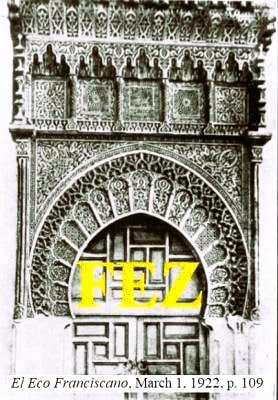
More than thirty pregnant Jewish women aborted when they saw the brutal aggression directed at their husbands and children and the great peril run by the Israelite population.
February 10, 1880. El Trabajo, year III, number 163, page 1.
Tangier. Stirred by the persecution and abuses which the Jews of the empire of Morocco have been subjected to for some time, most representatives of the European sovereigns have called on the Sultan to halt the harassment of the unfortunate Israelites. The U.S. consul made his protest in very vigorous and meaningful terms.
March 9, 1880. Gaceta de Galicia: Diario de Santiago, year II, number 337, page 2.
The rabbis of Fez mailed a letter to the Anglo-Hebraic Association of London giving details about the assassination of the Jew named Abraham el Aloof and about the crusade launched against the Israelites in Morocco, to whom Muslim authorities deny all justice.
Thus the days have returned when the Jews must cross Muslim neighbourhoods barefoot even if there are no mosques or holy sites, and the Jews must not cover their head. One did so on a rainy day and got seriously beaten. The adules (notaries public) declined to attest the pitiful state he was left in. The cali (judge) also refused, adamantly, noting that "Jews, Christians and slaves have no blood."
It is hard to believe that the European diplomatic corps in Tangier will remain indifferent much longer to the cruel persecution suffered by the unhappy members of the Hebrew community to the dishonor and scandal of our epoch.
June 20, 1881. Gaceta de Galicia: Diario de Santiago, year III, number 705, page 2.
The following note is reprinted from the newspaper El Liberal.
The Minister of State received the day before yesterday a telegram from Conde de Rascón the representative of Spain in Constantinople informing that a Hebrew from Russia had come to the government of the Sultan pleading protection for Hebrew Slavs. This Israelite spoke on behalf of 60,000 natives of south Russia counties who were abused, mistreated and ousted by subjects of the Czar.
The Israelites convinced themselves that their lives were in peril, so they abandoned their homes in great numbers and sought the protection of other European nations.
This huge mass of Israelites, rejected and persecuted by the conservative Germans and having passage through Serbia denied, wishes to go to Austria if it can not stay in Turkey or head to the free countries of North America as a last resort.
This Israelite spokesman subsequently came to Conde de Rascón and the two had a long conversation. He speaks antiquated and flawed Spanish like almost all of his 60,000 companions do.
The Minister of State informed the king yesterday about the matter and the king requested that a telegram be sent to Constantinople stating that he and his government would view with satisfaction the return of those migrant Israelites to their old homeland.
"It is necessary to mend in part the blunders of our ancestors," said the king, "and this was one of their biggest."
April 24, 1882. Gaceta de Galicia: Diario de Santiago, year IV, number 950, page 2.
Berlin, 20. Dispatches from the Russian frontier, citing letters as the source, furnish "horrifying" details about the attacks on Jews.
In Balta [Ukraine] the people wounded 700 Israelites, 40 of whom are in "very serious" condition.
Women were the object of the "most repugnant" assaults.
Only sixteen out of some hundreds of houses owned by Jews were left standing.
The rest were looted and set ablaze.
Over 20,000 Hebrews were reduced to destitution.
Funds from Odessa have arrived to help these unfortunate ones.
The losses amount to 3 million rubles. Some 200 persons have been arrested, accused of inciting the riots.
Berlin, 21. Tumults against the Jews have reocurred in Letitchev [Ukraine] where some houses belonging to Israelites have been plundered.
Calm has returned to Balta after the great atrocities committed there.
In Karpovitch [Lithuania] the rabble despoiled every tavern owned by Jews. The presence of troops was required to avert general plunder.
The Hebrews are very vulnerable in rural towns due to the absolute absence of police.
Peasants show great animosity toward the Jews. Because of the official censorship Russian newspapers play down the importance of the upheavals that occurred in various localities, but the dispatches and letters received here agree that the events are extremely serious.
May 28, 1882. El Correo Gallego, year V, number 1118, page 2.
In "Fowduo" (Russia) a fierce blaze razed 105 Israelite homes worth more than half a million rubles; the houses were insured. A large number of Jews were victims of horrendous events from Vilnius [Lithuania] to Minsk [Belarus]. Even babies were wrested from their mother's arms and burned alive in her presence.
The coronation of the Czar in Moscow will demur until 1883 because there is evidence of a great Nihilist conspiracy.
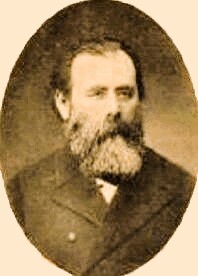
Source: Wikipedia.
Leon Pinsker (1821–1891) was a physician and Zionist activist. Born in southeast Poland he was educated in Odessa where he studied Law, but he was unable to practice because of discrimination. He supported equal rights for Jews, but the Odessa Pogroms (1871 and 1881) curtailed his optimism. These events motivated him to found and lead the Hibbat Zion ("Lovers of Zion") Movement in 1881. Disputes in the Odessa Committee and the Ottoman restriction on Jewish emigration barred Pinsker from resettling in Palestine. He died in Odessa in 1891. His remains were later brought to Jerusalem in 1934. Full article here.
A moment of calm has followed the anguish of the massacre, and persecutors and persecuted may catch their breath a little. Meanwhile the Jews are being repatriated from Palestine with funds collected precisely for their emigration to Palestine. But Western Jews have learned once more to put up with the yell, Hep, Hep, as their fathers did in bygone days. The fiery explosion of anger sparked by the affront borne has given way to a precipitation of ash blanketing the scorched earth. Close your eyes and hide your head like the ostrich, but if you don't take advantage of this transient pause and contemn lifesaving means more radical than the poultices of quacks applied to our unfortunate people during millennia a lasting peace will never be yours.
September, 1882
(p. 166).
* * *
And so Judaism and Jew hatred go together throughout history. As with the eternal Ahasuerus 1 the hatred seems to never end. Only a blind man can dispute that Jews are the chosen people of universal hatred. The peoples can be quite different from one another but they shake hands in their animosity toward the Jews, on this all peoples concur. The amount and tone of the spite depends on the degree of civilization owned, but the spite manifests itself always and everywhere through violent acts: persecutions rooted in envy or concealed under a mask of tolerance and protection (p. 170).
Summarizing what has been said: The Jew is a zombie to the living, an out-of-towner to locals, a hobo to the settled, a beggar to the affluent; an exploiter millionaire to the needy, a foreigner to patriots and a despised competitor to everybody (pp. 172-73).
Pathetic image ours! We are not deemed to be a nation and so we have no say in their councils even in the matters which concern us. Our fatherland is the foreign nation, our unity the diaspora, our solidarity the universal hostility, our weapon meekness, our defence flight; our originality conformity; our future the day after. What an appalling role for a people to play who in olden days had their Maccabees! (p. 175).
And then there is the faith in the Messiah, the belief in the arrival of a benevolent supernatural power, plus the religious proposition to endure the divine punishments patiently, all of which has made us neglect our national liberation, unity and independence. We set aside the idea of the fatherland with a greater eagerness the greater grows our material comfort. And so we sank ever deeper. The ones without a fatherland got to forget the fatherland. Hasn't the hour arrived at last to bear out how much disgrace that has meant for us? (p. 176).
Naturally the founding of a Jewish haven can not be realized without the backing of governments. To acquire our haven, and to secure a permanent stability for it, the makers of our national rebirth must proceed with utmost prudence and perseverance. What we long for is at heart not novel or dangerous for anyone.2 Instead of the many havens that until this day we have grown accustomed to look for, we now wish to have an unique haven whose existence however must be guaranteed (pp. 186-87).
June 6, 1883. El Eco de Orense, year IV, number 266, page 2.
Berlin. An uprising against the Jews of this German city [Rostok] brought the destruction of 130 Israelite houses. This makes us remember the horrendous persecutions carried out by Russian mobs a while ago.
Are we in the nineteenth century or are we shrouded in the shadows of the Inquisition and the most outsize religious intolerance? Such cruel attempts on the inviolate rights of the human personality must unremittingly be punished by the law.
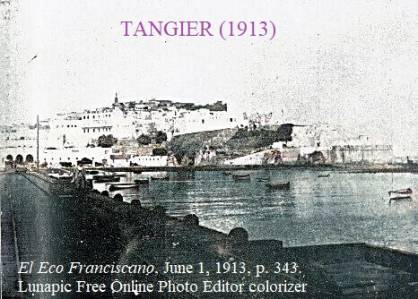
January 10, 1885. El Correo Gallego, year VIII, number 1857, page 3.
Tangier, 8. The Israelites have appealed to M. Ordega the French representative for protection in light of the threats by Moroccans who announce a general slaughter of the Jews.
The French minister has offered his mediation so that Moroccan authorities stymie any act of aggression by the populace.
Holy Thursday April 22, 1886. El Correo Gallego, year IX, number 2239, pages 1-2.
Today Jerusalem acts as the miserable capital of a province in Asian Turkey and as the residence of a military governor, a chief of police, a superintendent of Omar's Mosque, a Latin patriarch, a Greek one, an Armenian one, a Chief Rabbi and several consuls. Hardly 20,000 persons inhabit it, among them 8,000 Jews. The Latins, almost every one religious, dwell in "Ramich" near the city and in Bethlehem, submitting to the patriarch who lives in St. Saviour's Convent. The Muslims sleep on terraces under multicoloured tents, or by the citadel's gates. The Greeks moil and cook their delicacies inside the Church of the Holy Sepulchre. The Protestant mission devotes itself to teaching and walks among these and those, circumspect, stern and reserved.
Meanwhile the 8 or 10 thousand Israelites crowded between Mount Zion—where the Turks camp—and the Arab temple are silent and await Messiah's advent with undeniable tenacity.
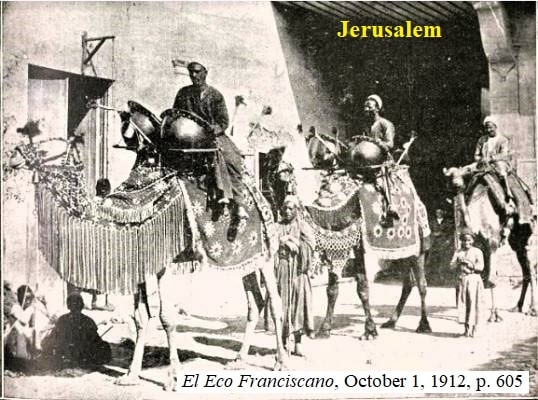
Almost all arrive in Jerusalem weighed down by old age and settle there to die in the sacred land and to be buried in the Valley of Josaphat where their elders' bones rest.
These members of a great people, unruffled and austere,—for whom lofty destinies yet wait, according to St. Paul—keep saying their prayer every day facing toward the spot where their temple stood in past centuries, for the Muslims who occupy it presently bar their access to it.
A peerless perseverance that evokes respectful compassion and causes even the most radical orthodox observer to forget the sins, errors and hubris of the so-called deicides!
The biblical groves of Gethsemane, Bethlehem and Bethania are withered, the summits desolate and the roads laden with dust. The arid plain of Josaphat extends off to one side. Some caves open their dark mouth in yellowish ravines and serve as lairs for the Bedouins or for the jackals.
In the middle of this sinister landscape immortal Jerusalem basks in the sun, seated on her four mountains (Zion, Akra, Ophel and Moriah) like a voiceless sphynx lying on the bedsheet of the desert.
Forlorn and barren, ensconced in a bifold of stone-strewn Judea, with a demeanor more of the dead than of the living, with less a trace of occupancy than of sepulchre, Jerusalem still overwhelms all peoples and nations who perceive in her a great majesty fallen down, but fret instinctively that one day they might spy some new legion of spirits storming out of her gates to shatter and do away with the decrepit fabric of our contemporary society.
This eternal city—damnéd or blessed—has supernatural aura; and its name, vibrating deep in our hearts, induces religious dread even upon those more inclined to the denial or to the doubt.
ALFREDO VICENTI.1
His pencil portrait drawing in La Tierra Gallega, dated March 3, 1895, here.
September 25, 1886. Diario de avisos de La Coruña, year XVI, number 8477, page 2.
Last week Bucharest hosted an Antisemitic Congress that lasted three days. Here, in document format, are the resolutions it passed.
The International Antisemitic Congress held in Bucharest approves and resolves to circulate and execute what follows:(1) The Jews are deemed unworthy of staying in the midst of the peoples of Europe any longer.
(2) Until methods to expel them from European states are found, the Congress lays down for its followers of Romania, France, Hungary and potentially others elsewhere the task of petitioning their governments and parliaments:
(a) to proscribe any concession to the Jews by a State, district or commune, even if the Jews resort to using aliases.
(b) to refuse Jews, insurance companies, banks, etc., any job, project or posting remunerated by a State, district or commune.
(c) to ban the sale of property to Jews and to bar their leasing lands, houses or mills from others, or to others.
(d) To preclude Jews opening shops, restaurants, lodgings, hotels, cafeterias, taverns, distilleries or wine stores. To prohibit their being bakers, spice sellers, grain merchants, doctors or pharmacists.
(e) to pressure priests and ministers of every religion to spread these ideas among their parishioners, and to pressure academics and school teachers to avoid buying in Jewish stores or to hire their services.
All nations that embrace these resolutions must pressure their government into enacting germane laws and must create committees to demand the execution of these resolutions in every country by means of public referenda.
June 23, 1887. El Lucense, year IV, number 809, page 3.
Vienna, 20. Under cover of the political elections here antisemitic demonstrations have reoccurred in "Dumaszendaheley" (Hungary).
Many candidates ran solely on the line of being an enemy of the Jews, whom they unjustly blame for all the country's ills.
Arsonists set fire to the Jewish neighbourhood; some 80 Hebrew families were left homeless in the greatest misery.
The bloody persecution of Israelites in Hungary hasn't had a precedent for the longest time.
The affluent families of rural towns contemplate emigrating in light of the abuses they are subjected to.
August 9, 1887. Diario de avisos de La Coruña, year XVI (sic), number 8793, page 3.
A curious statistic about the Israelite colony in the United Kingdom has been published in London.
It turns out that the Jews enjoy in that country two priceless boons: health and wealth.
Great Britain tallies 7,700,000 families, 10,000 of whom are Jewish.
For every 2,500 Christian families no more than one enjoys an annual income equal to or greater than 10,000 pounds whereas one out of every 100 Israelite families does.
In other words, there teems about the figures of the Rothschilds and Montefiores a swarm of little Croesi 1 whose fortunes altogether would relieve the biggest debt of a State.
From a hygienic perspective the statistic also reveals that the Jews have a notable advantage over the Christians of Great Britain. The cases of longevity are seven to eight times more frequent among Jews than among Christians.
January 8, 1891. Gaceta de Galicia, year XX, number 5, page 1.
The Daily Chronicle inserts a dispatch from Vienna stating that the Russian Government intends to exclude Israelites from the legal profession.
The telegram adds that all present Jewish lawyers will be expelled from Russia.
March 18, 1891. Diario de avisos de La Coruña, year XX, number 10050, page 4.
M. Anatole Beaulieu the expert economist publishes a current events article in the Revue des Deux Mondes on the problem of antisemitism. The following data on the Israelite population and its distribution across the globe is extracted from that article.
The emancipation of this ill-starred race was decreed in 1791 in France with the intervention of Mirabeau, the abbot Grégoire, Duport and, above all, Robespierre.
Most European nations imitated France's example, albeit slowly. England proclaimed the emancipation of its Jewish population gradually over the period 1845-1858; Denmark in 1849; Austria-Hungary in 1867; Italy in 1868 and in 1870; Germany and Switzerland in 1869; Bulgaria in 1878 and Serbia in 1879. Russia and Romania on the eastern flank of Europe, and Spain and Portugal on the western, are the only peoples of the continent who still deny Israelites the rights enjoyed by the Christians.
Russia and Romania harbor more Jews in their territory than the rest of Europe. In particular the Muscovite empire has half of the world's Jews on its dominions.
The precise number of Israelites in all these countries is unknown. M. Beaulieu estimates there to be 8-9 million Jews worldwide, 7 million in Europe.
June 3, 1891. Gaceta de Galicia, year XXI (sic), number 121, page 1.
New measures have been taken against the Jews in St. Petersburgh. Jewish Army doctors have been ordered to convert to the Russian Orthodox religion or to resign from their post. The decree of expulsion in Poland affects 30,000 Jews.
July 2, 1891. Gaceta de Galicia, year XXI, number 143, pages 1-2.
A correspondent of The Times reports that 40,000 Jews are disposed to abandon Russia because of the persecution and abuses they endure. The majority inhabits the gubernias of Crimea, Kherson, Kiev and Besarabia.
Sir William White the representative of the wealthy Baron Hirsch sent to Russia to expedite their emigration despairs of obtaining a permit for their resettlement in Palestine.
October 25, 1892. El Lucense, diario católico de la tarde, year IX, number 2403, page 1.
Reprinted from La Semana Católica.1
Judaism can not soar higher or Spaniards plummet lower.
The perfidious and despicable Jewish race who crucified Jesus; who was a powerful and perpetual ally of the Saracens during the Reconquista campaign;2 who had secret dealings with the African Moors several times to have them invade and occupy our nation anew; who had managed to snatch the money and the most important and rewarding posts of Spain using detestable ruses; who made herself loathsome to every Christian over the centuries because of her heresies and folly; who stirred our most religious and prudent Kings to sweep her off our country as so much pestilence and rubbish, and who is currently being expelled from various European nations by Protestant and schismatic Governments; that perverse Jewish race is gradually sneaking into our house in hypocritical and cunning manner to eventually become lady of the noose and of the blade, and the landlady of lives and revenues like the feudal knights of old and to demand tribute and obeisance from us.
Like scavenging birds, but in good order and concert and assisted by the full might and influence of universal Masonry, the Jews firstly swooped down on barbarian peoples like Turkey, Egypt and Tunisia, whom they already possess. Now they establish centers in Paris, Vienna, London and Berlin to commandeer all the money of Europe through the International Financial Commissions. They direct their attacks primarily against Greece, Portugal and Spain where day by day they gain greater ascendancy and subjugating influence.
If the Jews have 24 prefects or governors in France plus a good portion of the newspapers, in Spain there are many Judaizers who with more or less gall render service to Judaism in the press, on the rostrum and possibly in other spheres or civil servant posts; the Jews impose on Spanish Governments when these must negotiate a loan. As La Verdad of Castellón 3 states, the Jews here are already landlords over half of the Peninsula; they have managed to take over all railway Companies and they will eventually take over everything and kick us out of this blessed land that the Virgin Mary sanctified and on which spattered the blood of so many martyrs of the Religion and of the fatherland.
And to show that we do not exaggerate, we will transcribe this juicy little paragraph published by a French newspaper, The Northern Cross,
In the partitioning of Spain among the children of Israel the Andalusian railways have been allotted to Hirsch Junior, the northern ones to Camondo, and the State's finances to Rothschild of London.
But if Judaism can not soar higher, neither can Spaniards dive lower. It seems incredible that the fatherland of Pelayo, Ramiro, Fernando III, El Cid, Jaime de Aragón, Guillén de Entenza, Perez del Pulgar and of the Catholic Kings must perforce suffer the shameful yoke and humiliating leash of the accursed race of Judah! Incredible it seems that the people of Covadonga and Clavijo, Gormaz and Roncesvalles, Otumba and El Bruch, Tunisia and Tétouan accedes to bend their haughty cervix and render their homages to the greedy sons of Jacob, whom our forefathers looked upon with disdain and whom they allocated room in our markets solely out of pity! Incredible it seems that the tattered Israelites have transmuted from beggars to millionaires, from vanquished to victors!
Honest and Catholic Spain must thank Masonry for all this since the Jews avail themselves of this odious sect to implement their plans of treacherous conquest and massive plunder. Presently the Masons and their sympathizers must be rejoicing—they who contested so rabidly our most pious Kings' expulsion of the Israelites from Spain and who endeavoured to open the doors of our fatherland for them with the clauses in the Constitutions of 1869 and 1875 enacting freedom or tolerance of religion.
Liberalism is what has brought the Jewish rabble to Spain again. They arrive not only with their inherited and eternal hatred of Christ and his Church but with the idea of dominating everything and making us their slaves.
And furthermore Europe presently owes the epidemic of morbid Asiatic cholera to them, as it has been archly verified.
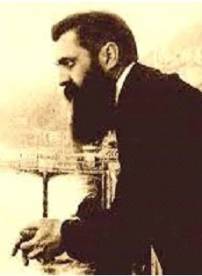
Source: Wikipedia.
Theodor Herzl (1860-1904) was an Austro-Hungarian lawyer and journalist. He is officially dubbed, "the spiritual father of the Jewish State," because he organized the first Zionist Congress in 1897 with the goal of bringing Jews from all over the world together for the task of building a separate homeland of their own. Full article here.
The Jewish problem exists wherever Jews dwell in appreciable numbers. The immigrating Jews introduce it where it does not exist. We naturally migrate to places where we are not persecuted, but our appearance there sets off new persecutions. This is true and will remain so until the Jewish problem is resolved politically. It will spring up even in the developed countries, France is a case in point. Impoverished Jews bring antisemitism to England and they have already taken it to America (p. 29).
Nobody will deny the misery that burdens the life of the Jews. They are persecuted in all countries where they reside in appreciable numbers. Although equality of rights exists on paper, it is nullified in practice almost everywhere. Jews can not hope to reach mid-level ranks in the army, in government or in private-sector jobs. There are even attempts to drive them out of the marketplace, "Do not buy from the Jews!" (p. 37).1,2
In Russia the Jewish villages are sacked; in Romania individual Jews are murdered; in Germany they occasionally get beaten; in Austria the antisemites terrorize entire segments of public life; in Algeria preachers in favour of our expulsion crop up; in Paris the so-called high society turns inward and shuts its circles to Jews. The nuances are innumerable (p. 37).
Everywhere the malaise can be reduced to the classical phrase of the Berliner, "Out with the Jews!" (p. 38).
All the peoples that harbor Jews are without exception antisemites, ashamed or unashamed (p. 38).
All educated Jews without financial means espouse socialism. Hence the class struggle is waged on our backs because we occupy the most vulnerable spots in the capitalist and socialist camps (p. 38).
Our commoners become proletarian enemies of the ruling order and subordinate members of all the revolutionary parties.3 Meanwhile the fearsome power of money increases in our affluent classes (p. 42).
Features
The Jewish Company is partially patterned after the big colony companies; it is a chartered Jewish company, if you will. But it doesn't just watch over the exercise of sovereignty rights or pursue colonization ends only.
Like any other company the Jewish Company is founded upon an initial public offering compliant with British legislation and under the protection of England. Its headquarters shall be in London. I can not set down the amount of startup capital now. Our many financiers will fix it. But I will assume a startup capital of a thousand million German marks, in round figures. The fraction dedicated to investments at startup will depend on the manner of procuring the money; this question will be examined later.
The Jewish Company is a transitional institution. It is strictly a commercial venture that must always be at arm's length from the Society of Jews.1
The primary goal of the Jewish Company is to liquidate the real estate and other assets belonging to the emigrating Jews, such as houses and landholdings, and to cede the customer base of their local shops to the new owners. The procedure forestalls crises, ensures that everybody gets what is his, and facilitates the internal emigration of Christian citizens to the places of work and properties vacated by the departing Jews (p. 49).
Social welfare institutions
The question of social welfare institutions is very important for us because we have many panhandlers. Those with a weak character lapse easily into begging because the external pressure discourages them and the indulgent charity of the wealthy spoils them.
The Society of Jews with the help of local units will pay the greatest heed to people's education in this regard. This will generate a fertile ground for many associations that wither unnecessarily. Whoever simply shows goodwill shall be conveniently employed. Panhandlers will not be tolerated. Whoever refuses to work shall do it in the reformatory.
But we are against sending the elderly to retirement homes.
The retirement home is one of the crueller benefits that our kindness has devised. There an old person feels ashamed and humiliated until death. To be truthful, he is already interred. But as for us we wish to preserve their illusion of their utility until the end, even for those who are on the lowermost rungs of the intellect. Those who are incapable of doing physical work must be handed easier tasks. We must deal with the intellectually disabled poor of a generation that is already wilting. But the up-and-coming generations must be educated differently: in liberty and for the sake of liberty.
We shall endeavour to mete the moral happiness that comes from toil to all ages and orders of life. Thereby our people will retrieve their vigor in the country where the workday will be seven hours long (p. 74).
Steward of the Jews
The Society of Jews is the central office of the incipient Jewish movement. It pursues scientific and political objectives. The foundation of the Jewish State, as I describe it, rests on modern and scientific groundwork. If we emigrated today from Egypt we could not do it in the same naive way of old. Previously we will assess our numbers and our strength. The Society of Jews is the modern Moses of the Jews. The undertaking of the ancient and great steward of the Jews is, compared to ours, what an admirable and ancient musical comedy is to modern opera. We stage the same melody with many, many more violins, flutes, harps, violonchelos, double basses, making use of electric lighting, props, choirs, magnificent stage machinery and lead singers (p. 86).
Languages
Perhaps someone ponders the difficulty of having more than one common language. However we can not speak Hebrew among ourselves. Who among us would use it to purchase a train ticket? No one can do it. Withal the matter is very simple. Everyone keeps his own language, the beloved fatherland of his intellect. Switzerland exemplifies the possibility of linguistic federalism conclusively. We will stay in the new country as we are now; we will never stop loving with melancholy our fatherlands from which we were expelled.1
We will leave behind the wilted and useless dialects, the idioms of the ghetto, the underground argot of captives.2 Our teachers will see to it. The language most often used in everyday life will become the principal one, without violence. The unity of our people is unique. Truly we recognize ourselves as members of the same people exclusively by the faith of our parents (p. 91).
Flag
We don't have a flag. We need one. In order to lead many men one must raise an emblem aloft.
I contemplate a white ensign with seven golden stars. The white field symbolizes the purity of the new life; the stars represent the seven golden hours of our working day since the Jews head to their new country under the banner of labour (p. 92).
I believe that the Jews will have, like any other nation, enemies enough. But they will not be dispersed over the entire world once they dwell in their own territory. The Diaspora can not be repeated as long as the entire culture of the world does not break down. And only an imbecile could fear such an outcome. The present culture counts on sufficient strengths to defend itself (p. 96).
February 10, 1896
Today I have read Leo Pinsker's Auto-emancipation on loan from Bloch.1 Admirable agreement with his parcel of criticism and much affinity with his constructive project. It is a great pity that I hadn't read this pamphlet before granting permission to print mine. And perhaps this turned out for the better because I would have forgone my book. I will speak about this publicly at the first opportunity and I will probably write an article in Zion on this very topic.2
April 21, 1896
Today I have wrapped up my letter to Nordau which I began writing yesterday.1 Baron Hirsch died yesterday or today in Hungary. I found out about it only one hour after sending my letter to Nordau which now I must annul telegraphically. Yet what a strange coincidence! The pamphlet was finished months ago and I sent it to everybody except Hirsch, and the day I decide to forward it to him, he dies. His participation would have contributed enormously to the success of our cause.
His disappearance is a great loss at any rate. Among the wealthy Jews he was the only one who wished to do something really major for the poor. Perhaps I did not behave well toward him. Perhaps I should have written Nordau two weeks sooner. Today our cause seems weaker because I never gave up the hope of winning Hirsch over.
July 21, 1896
We must found a national association to reforest the country.1 Every Jew will subsidize the planting of at least one tree. Ten million trees!
February 20, 1897
Jewish settlers and workers maintain good relations with Arabs and Kurds. The Arabs prefer a Jewish ruling to a trial in a Turkish court. The whole of Palestine talks about our national project because we are the historical landowners. Jews constitute the majority of the population in Jerusalem already. The climate is excellent and the soil not barren. Only on the mountains covered aforetime with fertile terraces has the rain washed out the humus of the fields.
September 3, 1897
If I wished to sum up the Basilea Congress with an adage I will take care to not state publicly, I'd say: "I have created the Jewish State in Basilea." If I spoke it aloud I would hear an explosion of universal laughter in response. But in five years, or at most fifty, everybody will admit it.
July 17, 1897. El Lucense, year XIV, number 3758, page 2.
Reprinted from the Hebrew magazine Hazewi [i.e. Ha-Tsevi].
The city of Jerusalem...has decided to build a long-overdue observatory, desired and indispensable in this country for making astronomical and meteorological observations. The initiative is underwritten by the generosity of a philantropic lady whose name the observatory will bear. Monsignor Patriarch of the Holy Land has taken the project under his wing and ceded 12,000 square feet [or 0.11 hectares] of land owned by the Community of the Holy Sepulchre. Mr. A. Andréskis the eminent architect and Mr. Arvanitakes, astronomer and Science professor, will supervise the construction work... The project's committee has also credited the distinguished and untiring Spaniard D. Francisco J. Besa by inscribing his name in the Golden Book and on a commemorative diploma as a founding member of the Observatory and Scientific Museum of the Holy Land.
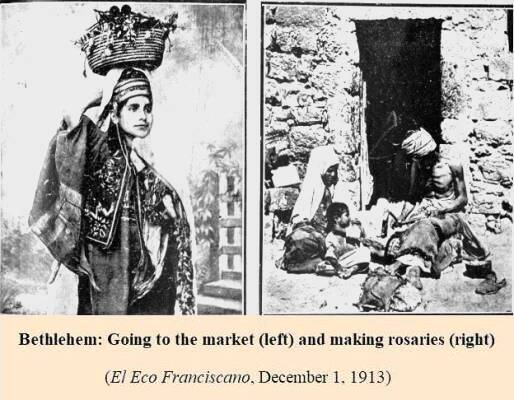
Franciscan cleric Ramón Muíños from the convent of Santiago has been appointed Natural Sciences teacher at the Franciscan school of Bethlehem (Palestine).
August 20, 1897. El Lucense, year XIV, number 3787, page 3.
Dispatches from Paris say that Basilea will host an Israelite Congress toward the end of this month. It will propose the creation of a Jewish state in Palestine.
September 2, 1897. El Correo Gallego, year XX, number 6538, page 3.
Madrid, 1, 8:00 PM. A Jewish congress has been held in Switzerland where 50,000 attendees agreed to declare Palestine fatherland of the Jews and to channel their emigration thereto.
September 3, 1897. El Pensamiento Gallego, page 2.
Paris, 1. In the Jewish Congress verified in Switzerland 50,000 persons, between those present and those represented, have participated.
A program was crafted based on the declaration of Palestine as the fatherland of the Jews guarantied by public legal rights.
The Congress also agreed to channel the emigration of Jews toward Palestine, mainly of those able to dedicate themselves to agriculture.
The Jews aspire to organize themselves in harmony with the laws of "living" [i.e. developed] countries.
September 4, 1897. El Pensamiento Gallego, page 2.
The sessions of the Zionist congresss in Basel (Switzerland) have started. Israelites are called Zionists because they are descendants of Zion (Jerusalem).
The goal of this congress is to initiate a movement to procure with the guarantees of international law a fatherland for all Israelites who do not wish or can not live in their present environment.
Two hundred individuals from Europe and America attended the first session.
Mr. Hertz (sic) the Congress president propounds in a pamphlet entitled The Jewish State the foundation of two societies. One, the Society of Jews, will have, so to say, a purely moral and intellectual personality whereas the other, the Jewish Company, will be a financial and industrial society.
The Israelites in favour of the kingdom of Israel will of course rally round the Society of Jews, and if the world powers are disposed to grant the Jewish people sovereignty over a neutral territory, said society will select the country where a territory will be purchased.
Once the territory has been ceded—whether in Argentina or in Palestine is still unknown—the duty of all society members will be to get rid of all their non-portable assets and to congregate in the new Zion built to that effect.
This is Mr. Hertz's project who in his pamphlet covers and resolves in great detail all the difficulties that could be encountered.
September 5, 1897. Gaceta de Galicia, year XXVII, number 203, page 3.
Madrid, 4, 5:00 PM. The Emperor of Germany will travel to Palestine next March to inaugurate the Protestant temple of Jerusalem.
September 7, 1897. El Lucense, year XIV, number 3802, page 2.
As a comic note, if this section [Catholic World] admits of one, the funniest is the fanciful creation of the Israelite kingdom. First the Republic of Argentina was deemed a proper site, Baron Hirsch aspiring to become today's Maccabean. The Government of Buenos Aires did not want to dump the looming cargo of Jews on the Pampas, so the Banking kings next tried to purchase Palestine from Sultan Abdul-Hamid. Two hundred important Jews advocated this project at the Congress of Basilea; but the famous Max-Dordau (sic) the great observer of utopians and of the unbalanced, seeing that this project suits his studies, has pledged to follow it and survey all of its phases.
September 14, 1897. Gaceta de Galicia, year XXVII, number 209, page 2.
Le Temps affirms that His Holiness has written a letter via diplomatic pouch to the Emperor of Turkey urging him, with singular force, to not cede Palestine to the Jews who purport to reconstitute the Hebrew nationality of Jerusalem using that route.1
September 21, 1897. El Lucense, year XIV, number 3813, page 2.
The Daily News asserts that the Pope wishes to confer with Monsignor Benetti the apostolic delegate in Turkey in order to obstruct the projects of the Zionists pertaining to the creation of the Israelite kingdom in Palestine.1 As we have said at other times the Holy See has no part in this an affair that seems chimerical to all sensible people.
September 26, 1898. El Áncora, year II, number 349, page 2.
Delegates of the 5 or 6 million Jews, five sixths of whom inhabit Russia, Poland, Galicia and Romania, have attended the second Zionist Congress and decided to create an international Jewish bank with an initial capital of 50 millions [currency unspecified] to procure the colonization of Palestine and Syria. The base of operation will be in London.
August 30, 1899. El Diario de Pontevedra, year XVI, number 4589, page 1.
Our readers will already know that the Jews are trying to get from the Sultan of Turkey territories in Palestine and Syria in order to colonize them.
It is really no easy matter.
Some dignitaries of Yildiz Palace appear favourably disposed to the Zionist plan and have pointed out to the sovereign major economic advantages that the State would obtain with the planned colonization.
In order to improve their chances the Zionists have excluded the city of Jerusalem and its environs from their petition for these have very sacred character for Christians and the inclusion could stir scruples in the Sultan's mind who does not want to upset the foreign powers interested in the preservation of Jerusalem's traditional significance.
However other counsellors of the Turkish sovereign oppose the idea of the Jews and do not leave off affirming that a restoration of the ancient Jewish kingdom poses a serious peril to the empire. These counsellors are apparently the ones who hold sway in Yildiz.
The Zionists also pretend to colonize the Island of Cyprus.
The British government will not oppose the idea if the country accepts it, i.e., if the Cypriots do not oppose the Jewish immigration, because otherwise disorders could break out, a prospect the government of London wishes to avert at all costs.
Antisemitism is as unknown in Cyprus as it is in Greece where the Jews enjoy total freedom and live in perfect equality with their fellow Christian citizens.
Hence the Cypriots will probably accept the influx of some thousands of Jews, but it is inconceivable that they will tolerate a massive influx because the Jews together with the Muslim population could completely erase the present character of the Island, which is essentially Greek.
February 14, 1900. El Diario de Pontevedra, year XVII, number 4797, page 2.
The number of Jews in Palestine is 80,000; their standard of living is miserable. They make up half the population of Jerusalem where they make a humble living as handicraftsmen selling their handiworks, to which must be added the alms of European donors.
The Jews have twenty-five agricultural colonies covering some 25,000 hectares (97 square miles) of land on which dwell 5,000 Jews. They attend primary and adult schools that outwardly imitate their European counterparts.
Libraries, public conferences, concerts and staged plays nourish an intellectual culture. Three Hebrew newspapers that instruct settlers on farming techniques are published in Jerusalem.
Hebrew is spoken in the Jewish colonies; concurrently French is very widely spoken.
June 6, 1900. Gaceta de Galicia, year XXX, number 123, page 1.
The trip to Jerusalem made not long ago by the German emperor is bearing the expected fruits, i.e., the expansion of and boost to German interests in Palestine.
To begin with, a German Post Office has been erected without the express sanction of the Ottoman government.
August 30, 1900. El Diario de Pontevedra, year XVII, number 4887, pages 1-2.
The [Fourth] Zionist Congress opened a few days ago in London with two thousand people in attendance and with the participation of six hundred delegates from all nations, especially from Russia.
Speakers Herzl and Max-Nordau delivered outstanding speeches. Max-Nordau made the apology of [German] Emperor Wilhelm II as a protector of Judaism.
The Zionist objective is to create a Jewish society through legal immigration and also to transform its economic profile, i.e., to evolve a hard-working people engaged in farming and industry out of a collective of merchants dispersed all over the world.
Zionists do not conform a political party. One may be a Zionist and enroll in any political party; Zionism embraces all factions. As a rule Zionists are impoverished or oppressed individuals or adherents to the inspiration of Judaism.
What gave rise to this kind of modern religion?
Prominent Zionist figures explain it this way,
The Jewish people have not forgotten their ancient fatherland, evidence of past greatness and might. The memories of Jerusalem and of Zion's mountains embody the bedrock of their faith. Around 1860 to 1870 Israel inclined to renounce its past when several European nations granted Israel's children the rights accorded the rest of the citizenry. But antisemitism erupted full of threats, and this impelled Israel to mind the ancient traditions once more and to recognize the error of not having established a bastion or a center 1,800 years ago and of not having earned the trust and respect of all other nations.
"This historical error must be amended," said several Jews. But how? By returning to the land, by retaking the forsaken fatherland. This is what Zionists want to accomplish.
They have spread out and taken root in Austria, England, North America, the Balkans, Gemany, France and Switzerland, and they rely on more than thirty periodicals to expound their ideals.
The prime movers and shakers of the Zionist movement are the aforementioned doctors Theodor Herzl and Max-Nordau. Both convened the first Congress at Basle in August 1897, the second which met at the same location in 1898 and the current one in London.
The movement has since grown. Societies were founded, newspapers started, countless subscriptions arrive continually at the National Bank of Vienna. Subscribers pay a monthly fee of one Hebrew coin worth one French Franc.
The balance of these subscriptions goes to amass a target capital of 250 million Francs, which is the price fixed by Turkey for the cession of Palestine to the Zionists.
A Zionist is a sort of modern Mason minus the extravagant ceremonies. It is an undeniable fact that he strengthens with each passing day.
With that fact in mind and given the primacy of the Semite problem in Europe we saw fit to write the present article.
March 20, 1902. Boletín oficial eclesiástico del Obispado de Lugo, year XXX, number 8, pages 113-14.
With sweet solace we have received the news that the Workers' Patronage which, under the care of St. Vincent de Paul, exists in that city of Bilbao and which is preparing a holy pilgrimage from Cantabria to Palestine for the purpose of visiting those Holy Places sanctified with the divine Blood of Jesus Christ and of manifesting there the enormous love they profess for their Divine Redeemer by doing penance together and reciting prayers for his love.1
Being well acquainted with the copious and well-seasoned fruits of Religion and piety that have always been harvested by the French pilgrimages conducted by the Augustine Fathers of the Assumption, we have felt enormous joy at seeing Spaniards combining efforts to undertake such a fruitful and holy endeavour.
Who knows if, on witnessing these very noble examples, all the other Christian nations will feel compelled, as it were, to vie in assembling at the sepulchre of mankind's Redeemer, to render him fealty and adoration!
May 2, 1902. Boletín oficial eclesiástico del Obispado de Lugo, year XXX, number 12, pages 179-190.
Tuesday April 1.
On a Barcelona pier two hundred and twenty-six pilgrims embark the magnificent English steamer, Midnight Sun [l. 1874, d. 1912]. The bishops of Lugo and Astorga are among the passengers. The Most Eminent Cardinal of Barcelona came briefly aboard to bless the vessel. We sail away singing the popular Salve Regina on a gorgeous sea slightly ruffled by the wind.
Wednesday April 2.
Shortly after waking up we exited the cabins for the deck and became acquainted with the daily schedule on board. Masses every hour. 7:30 AM, first half of the Rosary. 8:00 AM, breakfast. 11:00 AM, second half of the Rosary. 11:30 AM, one hour allotted for removing personal effects from the ship's hold. 12:30 PM, lunch. 4:00 PM, tea. 5:00 PM, Vía Crucis and homily. 7:00 PM, Rosary and blessing. 7:30 PM, dinner. 10:00 PM, lights-out. There was also a notice that said, "The concerts will be held after lunch and after dinner."
This morning many passengers get seasick.
On the deck at 3:00 PM were handed out the white hats we must wear for the excursions in Palestine.
After dinner the ship's captain dropped in for the evening concert. The emcee greeted him with the traditional British catchphrase, "Three cheers for the captain: Hip, hip, hip" and the auditorium answered enthusiastically, "Hurrah!" The sextet then played the British national anthem to loud applause at the end.
Following the concert the captain, gratified and visibly moved, addressed us with these words which I translate literally,
I am very grateful for the attentions you have showered upon me, and I take the opportunity to welcome you aboard this good steamer, the Midnight Sun. I also take advantage of the occasion to congratulate the ladies and gentlemen who were brave enough to come down to the salon in such great numbers, giving me well founded hopes that upon our arrival to Haifa you will all debark like veritable mariners. Now, in reciprocity to your courtesy, I beg you to let me hear your national anthem to show my gratitude.
Tuesday April 8.
No one was able to sleep soundly. Before 3:00 AM people begin to gather on the deck. A completely starry sky. The Haifa lighthouse can be glimpsed in the distance. Disembarkation proceeds swiftly thanks to our admirable orderliness praised by everyone watching. Upon landing everybody kissed the ground.
We immediately went to visit the Latin parish church and later we traversed the idyllic plain of Haifa along magnificent roads.
We climbed Mount Carmel on foot and lunched at the Abdala Tower. A Turkish band conducted by a Carmelite Father played the Royal March of Spain and the March of St. Ignatius which is the hymn adopted by the pilgrimage. Both elicited warm applause. After lunch we visited the Carmel and later descended for the road trip to Nazareth.
We crossed Haifa and entered the plain of Acre. We skirted Mount Carmel and passed through the prairie of Esdraelon whose fertility we marvelled at. On the way we stopped to drink an orange refreshment. In the evening we passed by the land of the Zebedees where a church stands built by Spaniards. As night fell we arrived to Nazareth.
After visiting the Church of the Annunciation we ate dinner together underneath a huge canvas, everyone in superb humour. Then we retired to sleep in Casa Nova, in the convents of St. Joseph or of the Apparition, in the German Hotel or in the Hotel of Nazareth.
Thursday April 10.
We rode on horses and donkeys from Nazareth to Mount Tabor. The sights along the route are undescribable for their variety, and I would fill a whole book with them.
Mount Tabor is gorgeous, nay, more than gorgeous. Many would have liked to put up tents there and never come down, like St. Peter.
We toured the ruins of the ancient Benedictine convent, the Crusader fortresses and Josephus' bulwarks.
At length we remounted our steeds. After a short while we chanced upon a caravan of 1,300 Russian pilgrims who, with their popes at the head, were starting the climb. What an admirable and uplifting spectacle: men and women, most walking, carrying their clothes and food, seeking the shade of the trees, and with affection watching us pass them by, yes, as we did, despite observing a different religion. After all we were going to honour the same God! How much we who travel with so many comforts must admire those unhappy souls! May God touch the hearts of those unfortunate ones and may the days of unity arrive quickly!
Friday April 11.
Tiberias! Two Masses were celebrated concurrently, one at the parish church of the Franciscan Fathers and the other in the adjoining small Greek church. In this last church, apparently poor, a fence separates the men and the women.
After either Mass the pilgrims spilled over the village. They visited the Mosque, full of cheer this being a Friday, the Synagogue, whose Rabbis showed us magnificent manuscripts of the sacred books conserved in rolled-up parchments, the Greek church, the Bazar, the Marketplace, etc.
We lunched at 11:00 AM and then sailed the sea of Galilee in a flotilla of barges which split up into autonomous parties.
The sea of Galilee lies two hundred meters below sea level. It was flat, beautiful and gorgeous as we put out to sea, and the voyage to Caphernaum was very enjoyable indeed, but before the return there arose a strong wind which did not let the last nine barges of another flotilla moor. Remembering the Apostles' "Save us, Lord!" incident, it was thought prudent to have all barges sail together to Bethsaida's wharf and step off there. So it was done, and after various autonomous sorties on land some pilgrims walked back to Tiberias while others rode horseback.
Sunday April 13.
After lunch in Tiberias we boarded cars and headed back to Haifa. The trip that had taken us six hours coming now took three and a half going because the drive is downslope and because the heat of previous days had slackened. As soon as we arrived in Haifa we embarked with all orderliness and happiness.
We stay anchored facing Carmel until ten o'clock. Pilgrims pray the Rosary in groups scattered over the deck or spend the time writing to their families.
May 10, 1902. Boletín oficial eclesiástico del Obispado de Lugo, year XXX, number 13, pages 195-207.
Monday April 14.
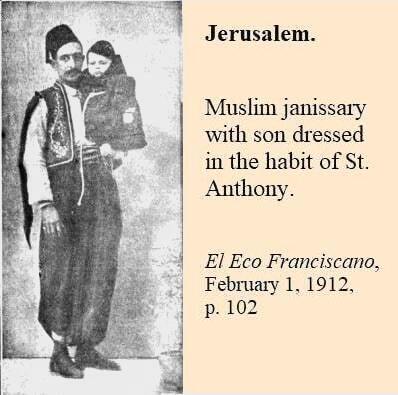
At 4:30 AM the Midnight Sun anchored near Jaffa's shore. The official welcoming boats and others hired to transfer us to dry land started arriving as soon as the sun shone upon us. It is said that Jaffa's boatmen are the best sailors in the world, and so they must be, to weave their way through the countless rocks sticking out of the water or awash that enclose the harbour. We did not have to go through Customs and at 7:00 AM all pilgrims gathered in the parish church of the Franciscan Fathers. These treated us later to a magnificent lunch in the mess hall of their convent, a welcome respite from campground chow. After lunch the pilgrims divided and boarded two trains bound for Jerusalem a quarter of an hour apart. We took the first one.
We were welcomed at Jerusalem's railway station by the Consul General of Spain, the Communities of the Franciscan Fathers and the Sisters of the Holy Rosary together with their schoolgirls. The railway station is located far from the village. As soon as the second train arrived we formed a procession headed by four janissaries in their showy uniforms (photograph to the right) followed by the Spanish flag, the ladies in double row, the gonfalon of the pilgrimage, the gentlemen, the priests and the prelates, the Consul General and the director. The procession went singing psalms, the Rosary and the Litany of the Saints. At length it entered Jerusalem through the Jaffa Gate while an immense crowd watched us.
Tuesday April 15.
After eating breakfast in Casa Nova, the ones who lodged there, and in Our Lady of France those lodging with the Assumptionist Fathers, we headed out in groups to tour àu touriste, as it were, the Holy Sepulchre, its sanctuaries and offices.
It's a painful truth: nothing there is attractive except the site's holiness and its reminiscences. One can not conceive a greater neglect, filth or lack of reverence for the holiest place on earth.
As a byproduct of the status quo set by the Powers no bolt may be used, stone displaced or aught restored. Consequently the vaults shell, the walls grime and the tiles chip. The moral impression is as painful as the material one, for the Orientals enter and leave with covered head as is their custom; some smoke, others chat, many lie sprawled about on the floor, discussions and colloquies go on; the Greeks set up booths for selling religious souvenirs, wax, etc.
After lunch all the pilgrims gathered for the visit to Mount Moriah. It's impossible to convey the impression caused by the magnificent and marvelous mosque with its wealth of features. All hearts sank on comparing the majesty of the Al-Aqsa Mosque to the squalor of the Holy Sepulchre Basilica.
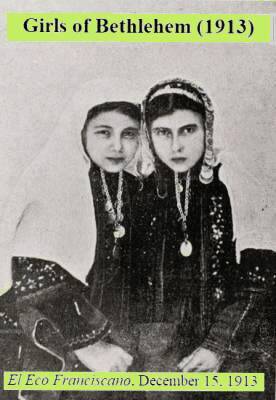
We visited the orchard of Gethsemane, property of the Franciscan Fathers who turned it into a precious garden, and the spots where the apostles slept, Judas gave the kiss of betrayal and where St. Stephen was stoned to death. On this last location we had to walk between rows of disgusting lepers who aroused everyone's compassion.
Wednesday April 16.
At 6:45 AM all the pilgrims had gathered for the drive to the poetic village of Bethlehem. We were distributed among some fifty cars. On the way we passed by the monastery of St. Elijah, property of the schismatic Greeks. From its heights one can contemplate the lovely village of Bethlehem off to one side, and off to the other the domes, minarets and towers of the deicidal city. We arrived in Bethlehem at 8:00 AM.
Thursday April 17.
At an hour as early as yesterday's we drove off from Jerusalem to "St. John of the Mountain" [Ein Karem].
The drive lasted forty-five minutes. Our first visit was to the sanctuary of the Franciscan Fathers. The coat of arms of Castile & León tops the arched entrance to the church and embroiders the chasuble of officiating priests also.
Upon our arrival a Mass was celebrated and the Benedictus sung.
After visiting St. John's Chapel we removed to the dining hall of the Fathers where they served us an appetizing lunch with the affection of Franciscans and of Spaniards. It's so delightful to discover here, a thousand leagues away from the fatherland and on these Holy Places, an essentially Spanish nook where all hearts beat in unison and all tongues speak the same language!
After completing our tour of the sanctuaries we returned to Jerusalem at 3:00 PM, ruefully leaving so Spanish a corner behind.
Friday April 18.
Gorgeous day! At 7:00 AM solemn Mass. At 9:00 AM we did the Via Crucis along the Way of Bitterness [Via Dolorosa] carrying the two hefty crosses of the pilgrimage upon our shoulders. We did the first station in what is actually the yard of the Turkish garrison. How much could anticlerical Spaniards learn from the Turkish Muslims! There, as along Bitterness Street, not only were we not harassed but actually met with all kinds of courtesy and respect.
After lunch we went to the spot where the Jews weep, and we found a great number of them who, book in hand, recited their lamentations, foreheads resting on the colossal stones the remnant of Solomon's construction works.
Once in the Jewish quarter we visited the two best synagogues of Jerusalem, the German one and the Spanish one.
At 7:00 PM we congregated upon Calvary. We heard a sermon and sang Ledesma's Stabat Mater aided by the sextet of the pilgrimage.
It is incumbent to pay homage to our female pilgrims. Neither the weight of the two crosses which they bore with respect and joy, nor the intensity of the searing sun, nor the press at Calvary where no seating space was to be had, nor the fast, nor the silence, could overwhelm their strong and pious nature, and today they are cheerful and content, satisfied with what they did and willing to do much more. As the Prelates said, one can go to the end of the world with someone who always wears a smile and sports a merry soul.
Saturday April 19.
The morning was left free for pilgrims to do as they wished. For this motive Jerusalem's central neighbourhoods were full of life and the white veils of our hats and the red bows on our arms were visible everywhere.
At 11:00 AM we came together for lunch, and at 12 noon we departed Jerusalem for a two-day trip to the Jordan River and to the Dead Sea, sleeping overnight in Jericho.
We crossed the Desert of Judea by car and made a stopover at Khan el Ahmar the site of the parable of the Good Samaritan.
We also paused briefly on a hill to contemplate the picturesque Greek Monastery of St. George suspended 'twixt heaven and abyss in the midst of the desert's solitude.
With the afternoon half spent we reached the small hamlet of Jericho, crossed it and went to Elisha's Fountain where we refreshed ourselves a bit although the heat on this day was, to be frank, quite bearable.
We parked the cars by Elisha's Fountain and walked to the "Mount of the Forty Days" [The Mount of the Temptations] which we climbed with much vigor despite the abruptness and steepness of the rise in order to visit the very curious Greek monastery encompassing the cave where Our Lord fasted. From its height we contemplated the immense plain of the Jordan. The Greek monks gifted us with a refreshment.
We descended the Mount of the Forty Days, walked back to Elisha's Fountain, boarded the cars and returned to Jericho where we installed ourselves in these four hotels, Gilgal, Bellevue, Jordan and Du Care. We dined together and immediately afterward we retired for the night, for tomorrow we must get up very early.
Sunday April 20.
It is better to omit the bad experiences, so I will not dwell on the overnight stay when all the individuals of the annoying Palestinian fauna had their rendezvous in every hotel room of Jericho. The mosquito nets and the exhaustion we felt proved worthless against an inhospitable swarm that left us with a souvenir of inexpungible itching and smarting.
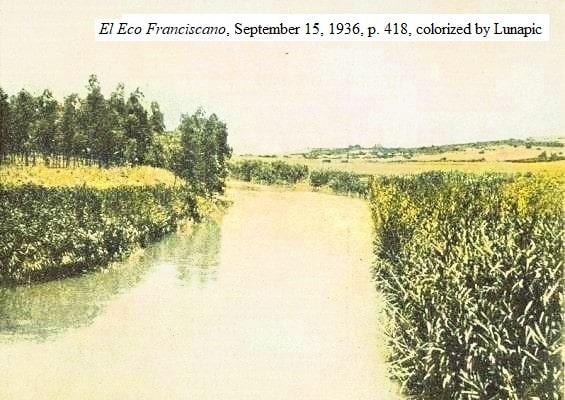
Thanks be given that the wake-up call came at 3:00 AM and that half an hour later we departed in the cars by way of the Jordan under a very lovely starry heaven.
The way of the Jordan, if it can be so dubbed, was the worst. Jolts, lurches, tosses and swallowing dust, we arrived at length to a delicious spot on the bank of the River Jordan where we heard Mass and had a most picturesque picnic-style breakfast. Afterward some pilgrims leisurely cruised the historical river on the only existent ferryboat.
After everybody had finished their breakfast we drove to the Dead Sea without feeling the sweltering heat that usually prevails at those depths but relishing instead a very nice temperature. Hence the aspect of the Dead Sea did not give us the sad impression which so many travellers report having received. However life and vegetation are indeed absent there. Over the entire breadth of the sea only one barge was visible. It flew the Turkish flag, carried salt and had been hauled there recently.
We lunched at 10:30 AM under the tent and then drove back to Jerusalem along the same route in reverse of the day before. It was getting hot by now and some fatigue set in. Still different cars on returning stopped at different places for different lengths of time.
At twilight all pilgrims gathered in Casa Nova, including the dozen or so who had opted out of the expedition to the Dead Sea which really does not compensate for the nuisances it brings even if we happened to have very good luck.
May 20, 1902. Boletín oficial eclesiástico del Obispado de Lugo, year XXX, number 14, pages 218-224.
Monday April 21.
It rained until 7:00 AM. Some pilgrims qualified the cool temperature brought by the rain as genuine cold.
The final religious ceremonies held at the Church of the Saviour ended with the imposition of the Cross devised by His Holiness for Holy Land pilgrims. The rest of the day was left free.
After the 5:00 PM dinner a good-sized number of pilgrims attended the official reception given by the Spanish Consul General in the salons of the New Hotel to mark our pilgrimage. The whole diplomatic corps of Jerusalem was there. The fiesta ended after midnight.
Tuesday April 22.
Early in the morning we walked up the Mount of Olives to the fiesta honouring the emplacement of a plaque with the Our Father prayer engraved in the Basque language [euskera]. Although the plaque had in fact not arrived the fiesta went ahead anyway. D. Román Pagoaha preached in euskera the solemn Mass celebrated inside Pater Chapel.
After the 10:00 AM lunch we headed out in procession to the railway station. Farewell, Jerusalem! With what sadness we have left you, many to never again see you, and the majority with the intention of visiting you once more before dying!
We departed Jerusalem at noon aboard two special trains that took us to the seashore in three hours. Boarding the Midnight Sun proceeded immediately.
Tuesday May 6 to Friday May 9.
Fairly strong gale, very rough seas. The waves sweep over the deck but fortunately the Midnight Sun is a "good steamer" and our captain an expert mariner.
Saturday May 10.
We arrived to Barcelona. Once more in the fatherland, after so long a pilgrimage.
September 1, 1902. El Áncora, year VI, number 1492, page 2.
Vienna, 30. A telegraph from Constantinople informs that the Jewish patriarch Dr. Herzl has entered into negotiations with the Sultan of Turkey for the purchase of Palestine with the aim of establishing there an Israelite Republic under the protection of Turkey whose troops would keep ensuring, as they do presently, freedom of worship in Jerusalem for every religion.
October 20, 1902. El Áncora, year VI, number 1533, page 3.
According to reports from Palestine cholera is causing many victims in Jaffa and Gaza and spreading to other towns.
November 5, 1902. El Áncora, year VI, number 1546, page 2.
Paris, 3. Telegrams from Jerusalem inform that the authorities have scattered widely, abandoning their posts, due to the cholera epidemic.
There is a dearth of medical aids and basic goods.
Over the past week 494 deaths were registered in Gaza, 70 in Lydda and 5 in Jaffa.
April 7, 1903. Boletín Oficial de la Provincia de Lugo, year 1903, number 78, page 1.
According to the communication received from the Consul of Spain in Jerusalem, dated March 10, the requisite of a medical check-up imposed in Beirut for persons arriving from Jaffa and Damascus has been discontinued, thus vanishing the last of the sanitary measures adopted as a consequence of the past cholera epidemic in Palestine and Syria.
January 11, 1904. Boletín oficial eclesiástico del Obispado de Lugo, year XXXII, number 1, page 16.
Article 4. If discipline and respect to the Authority are requisites for every large gathering, they become essential on a journey like ours which, in addition to the discomforts expected of a long-drawn-out trip involving some 400 persons, will confront also the grave deficit of communications, lodgings and nourishment extant in Palestine. This may spur the taking of swift decisions on the spot. Moreover the Asian climate with its sudden changes may impose restrictions on the avoidance of certain drinks, on the going out at certain hours, etc., etc. In this manner it will be necessary to dictate and enforce many precepts which would seem trivial and overblown in other circumstances. Every pilgrim then pledges to respect and obey all the directives issued by the Organizing Committee. Failure to do so may impel the Committee to discard the pilgrim anywhere along the journey and to cancel the contract.
January 17, 1905. El Correo de Galicia, year VI, number 1236, page 3.
A Jewish member of the German Parliament erupted in insults toward the Catholic Religion but the President called him to order saying that since the great proportion of the Chamber was Christian he would not brook having their religious feelings hurt in any way.
March 28, 1905. El Correo de Galicia, year VI, number 1293, page 3.
Madrid, 28, 11:00 AM. An elegantly dressed individual entered a Warsaw police station as the service was being distributed among the policemen and lobbed a bomb at them. The bomb detonated causing terrible damage. Seventeen policemen were hurt, some very seriously. The author of the crime was himself injured and imprisoned. He turned out to be a Jew.
August 24, 1905. El Correo de Galicia, year VI, number 1411, page 2.
A dispatch out of New York informs of a case mooted in all circles.
Jewish banker Jacob Schiff 1, associate of Kuhn, Loeb & Co., who recently visited Witte 2 in order to hand him a document summarizing the grievances of Russian Jews, went off to Boston some days ago leaving the banking house employees with the task of opening all his business correspondence.
Yesterday said employees received an odd parcel of small size but considerable weight which aroused everyone's suspicion.
The addressee on the mailing label was Jacob Schiff.
The employees unwrapped the parcel cautiously and once opened they observed full of amazement and terror that it consisted of an infernal machine set to explode upon the slightest bump.
Almost concurrently a similar scene played out at the Guggenheim & Sons banking house, Jewish also. The employees of that house as well received and opened a packet hiding a machine inside resembling the one sent to Jacob Schiff.
The police is actively looking for the authors of these mysterious shipments.
After analysis it was determined that had these infernal machines detonated they would have blown up the buildings where both Jewish banks are housed.
October 6, 1905. El Correo de Galicia, year VI, number 1449, page 1.
The legendary Wandering Jew, the hapless Ahasuerus,1 is the hallmark of the Jewish people sentenced after their fearsome crime of deicide to abide on earth without reconstituting their lost nationality.
Howbeit this stubborn people does not forsake its golden dream of a new Jewish Jerusalem like the one Roman emperor Titus conquered after a very cruel war.
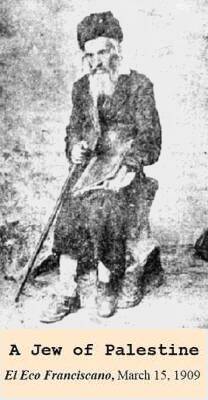
We believe that the readers of "El Correo de Galicia" will view with pleasure these curious data concerning the efforts of the Zionist Jews. We translate and extract them from La Libre Parole.2
The Jews call themselves thrice French in France, thrice German in Germany and thrice British in Great Britain. Withal they maintain an indelible commitment to their race everywhere and stay Jewish over everything else.
The efforts made in modern times to rebuild a Jewish nationality (setting aside the failed attempts initiated already by Julian the Apostate3 ) hearken back to the year 1850 with the creation of the Alliance Israélite Universelle.
Even before the creation of that society named Alliance Crémieux,4 Montefiore 5 and other leaders of Judaism toured several countries to pick a territory for their future kingdom of Israel.
They toured Egypt, Palestine and Syria.
Since then the Hebrews, faithful to their favourite tactics, have not ceased doing the underground stealthy work of moles. First they went around purchasing homesteads and thereafter entire Arab hamlets, so that presently they are the owners of almost all Palestine.
A society with a start-up capital of 50 million French Francs and with a branch each in Jerusalem, Jaffa and Haifa, finances this invasion.6
The Jews dominate the cities. Out of Jerusalem's 120,000 inhabitants 100,000 are Jews; 23,000 out of 30,000 in Jaffa and 9,000 out of 10,000 in Tiberias.
December 14, 1905. El Correo de Galicia, year VI, number 1506, page 1.
The 8 million Jews scattered all over the world endure continuous persecution; yesterday the antisemitic protest in France triggered by the Dreyfus trial, today the cruel massacres of Israelites in Russia. As a result the movement started by the Congress of Basilea in 1898 to revive the ancient kingdom of Zion keeps growing.
But this idea will not come to fruition—laying aside the biblical curse—because the Sultan of Turkey opposes the sale of Palestine and because the major Jewish capitalists headed by Rothschild 1 refuse to leave the European and American centers of commerce where they do business and to remove to a desolate region with an uncertain future.
January 3, 1906. El Correo Gallego, year XXIX, number 9311, page 3.
Rome, 1. A Committee of 20 senators and 40 parliamentarians of every political stripe, including several ex-ministers, published yesterday a manifesto protesting the Russian massacres and the fierce persecution of the Jews.
The manifesto states that the whole of Italy, without distinction of religious ideal, political or social, deplores unanimously the pain of the offended humankind and joins the protests of the entire civilized world.
January 11, 1906. El Correo Gallego, year XXIX, number 9318, page 2.
London, 9. The assembly of a large meeting presided by the archbishop of Westminster moved a motion to protest the massacres of Jews in Russia and to beseech the British Government to influence its Russian counterpart in a friendly manner for the reestablishment of calm.
January 30, 1906. El Correo Gallego, year XXIX, number 9334, page 1.
Really pitiable is the situation of Jews everywhere. The hatred nourished against them by the fanatical Christians of the Middle Ages based in the belief that the death of the Crucified had to be avenged on them has hardly disappeared with the passing of the centuries, and today the ill-starred Jews are still victims of the cruel mob, of a most inhumane persecution.
Arab hurly-burlies, Armenian raids, Russia's revolutionary outbursts, the abuses of unruly Turkish soldiers, the Royalist spasms of France, all these prefer to comb the raggedy Jewish race for victims, and so Jewish blood runs for petty or looney reasons without the Christian Governments striving to guarantee the security of this portion of their subjects which, incidentally, is far from representing a drawback to the progress or to the revenue of those countries where it dwells.
If Jews were to feel some day the fire of vengeance coursing through their veins, if they were to flame with the desire for retaliation and set up centres of resistance, the conflicts they could vex feeble or bloodthirsty European governments with would not be small fry.
Because it is vital to inform those who still ignore it that five and a half million Jews (no less!) live in Europe, distributed by country as follows.1
The disinherited race does not live just in the countries of Europe under the protection of laws that safeguard the life, prosperity and serenity of all men on an equal basis, natives or aliens. Additionally some hundreds of thousands of Jews, faithful guardians of the Old Testament, dwell in Asia, in Africa and even in America.
There are 300,000 Israelites in Asia distributed as follows.
The figures for Africa are these.1
The number of Hebrews living in America does not surpass 250,000.
The above data come from a Hebrew statistical report and stand therefore well grounded.
Hence some seven million Jews are dispersed all over the world, enough to constitute a non-petty state.
And yet, disseminated all over the world, lamenting the vanished splendours, existing almost by a miracle, suffering all sorts of abuse and contempt, the Jews live out a sad life of silent oppression under the dominion of Christianity or of Islam, both of which hate them unto death. One solace alone does the Hebrew find in his fate: the acquisition of as much wealth as possible, and to that end, he brings into play his feline patience, his insatiable ambition, his perseverance and doggedness against all odds, as if he wished through this course of action to take revenge for all the offenses, the vexations, the prejudices he receives from the enemies of his race continually...
Spain, once the genuine haven of Jews during the Middle Ages, is presently the nation that hosts the fewest for having been Jews the target of the rigurous expulsion in the monarchy of the Catholic Kings. Withal the descendants of Spanish Jews stay faithful to the language their forefathers spoke as well as to the beliefs they professed, and so in France, in Italy or in Austria one can easily discern among the Hebrew constituent those Jews still tabbed Spanish.
It is high time for that animosity toward the Israelites to disappear because it shames the civilized countries that still feel it. France, being a republic, revindicates the hegemony of individual and collective liberty and wants to show its love and goodwill toward the race exiled from its own fatherland, and so French Israelites have their grand synagogue in Paris, and so several among them are creditors of the French State to the tune of several million francs; but this is merely gloss on the surface of officialdom because the French from every social class loathe the Jew and bait him tyrannically when they chance upon a Dreyfus, guilty or innocent.
A few years ago a group of Israelites conceived the beautiful yet challenging problem of attempting a multitudinous return to their ancient fatherland, Judea the forsaken, but this is purely a platonic ideal, as platonic as continuing to await Messiah's arrival.
Not a few hurdles hinder this just and reasonable project. Palestine is in the hands of its latest conquerors, the Turks; the countries with a large Jewish constituency will not let their Jews depart because of the vigour and wealth they contribute, and the creation of a state plus the apportioning of a territory as broad as seven million inhabitants stand in need of is an endeavour bristling with bloody conflicts.
The humanitarian and feasible alternative would be to end once and for all the persecution of Jews everywhere. The slaying of antisemitic hatred would qualify as one of the most beautiful conquests of civilization.
R. I.
March 29, 1906. El Correo Gallego, year XXIX, number 9384, page 2.
The French steamship Campania 1 left Vigo 2 bound for Buenos Aires with 900 Jews on board fleeing the bloody persecutions in Poland.
Entire families sail framing a very sad spectacle.
July 2, 1906. El Correo Gallego, year XXIX, number 9464, page 3.
New York, 30. There were extraordinary scenes of panic on the city's East Side triggered by the rumour that a slaughter of Jews had begun. Thousands of these rushed to the schools to save their children, whose throats were being slit, it was said.
The Police Reserve has been called out.
More than twenty schools will be closed.
According to an inquiry tonsillectomies performed on children diagnosed with tonsillitis sparked the rumour.
No casualties were reported.
September 9, 1907. La Correspondencia Gallega: diario de Pontevedra, year XIX, number 5273, page 1.
Holland hosted the eighth Zionist Congress a few days ago in "Geborwnvoor Hunsten," a city situated close to The Hague.
The Zionists are those Jews who work to resurrect the Jewish State in Palestine in all its ancient splendor.
Four hundred delegates attended the Congress. The notable propangadist of Zionism, M. Max Nordau, explained that the Zionist movement is the Jews' response to antisemitism and it purposes through the creation of a Jewish State in Palestine to end the oppression and misery endured by the Israelites in most nations and to guaranty them a normal means of living. Zionists must unite to show the world what they want and what they can do. Unity would spur civilized States to confer together and work out a solution to the Jewish question.
The congress unveiled two factions: one political, another pragmatic.
The more numerous political Zionists led by Max Nordau pretend to create a Jewish State in Palestine with the Powers' permission induced by a global union of Jews.
Pragmatic Zionism obviates that dicey consent and instead urges the acceleration of emigration to Palestine to ensure possession of the land and an expansion of agricultural colonies.
The main resolutions passed by the Congress were the following.
The Zionist movement is far removed from having the importance some adherents claim. Jews have already overcome the prejudice that dissociated them from the rest of men in the civilized countries who treated them as pariah types. Moreover Zionism might bring about a new isolation of the Jews from the rest of the world and revive old prejudices which seem presently forgotten.
Wherefore most wealthy Jews prefer to remain subjects of their nations of residence to becoming citizens of Palestine, and their adherence to Zionism was manifested at the current Congress only in the offer they made of enormous sums of money for the comfortable settlement of impoverished Jews on some territory of America or Oceania.
However the Zionists rejected the offer as they did England's some years ago involving the cession of vast territories in Uganda. Zionism is adamant on this point: it's either the establishment in Palestine or the continuation of an erratic existence.
January 1, 1909. El Eco Franciscano, revista quincenal ilustrada, year XXVI, number 368, pages 20-22.
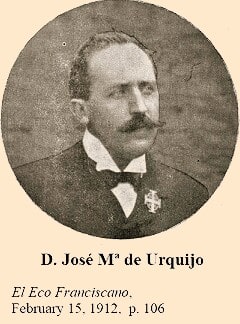
Once more Sr. Urquijo 1 has just called on Spanish Catholics via the periodical press to enroll for the fifth pilgrimage to the Holy Land and Rome which next Spring will bow down before the divine Redeemer's glorious Sepulchre in the name of all the good sons of our Fatherland (p. 20).
Every year 10-15 thousand pilgrims trudge from Russia to the Holy Land, most of them full of years, white hair on their head, who spent a lifetime saving money to attain to the joy of contemplating in the twilight of life what they so desired to see in childhood. A noteworthy observation! Everyone is poor! The wealthy do not go! (p. 21).
More than a thousand pilgrims travel every year from Austria (p. 21).
Polish pilgrims are never absent from Jerusalem (p. 21).
Several times a year core groups of enthusiastic Catholics arrive there from France, Germany and England, praising their God, honouring their Fatherland before the locals (p. 21).
The first-ever organized pilgrimage to the Holy Land departed from Barcelona in the year 1881. The project yielded such excellent results that almost every European nation copied and followed the example (p. 22).
However after a few years the custom languished in Spain before it was revived by the distinguished Catholic ex-member of Parliament [i.e., Sr. Urquijo] who organized the first Pilgrimage that sailed from Barcelona in 1902.2 Three more Pilgrimages followed suit, and the one scheduled for this Spring will be the fifth one of the series (p. 22).
December 1, 1909. El Eco Franciscano, revista quincenal ilustrada, year XXVI, number 390, pages 770-771.
According to the [Augustine] Fathers of the Assumption, Palestine has the same area as Belgium, i.e. 30,000 square kilometers, and in the monarchy of Solomon had 8,000,000 inhabitants. Thus its ancient population density was greater than the population density of any nation in the world presently, evincing the lavish life that Palestine enjoyed in his day. Today the net population of Palestine, native plus European, does not reach one million (p. 770).
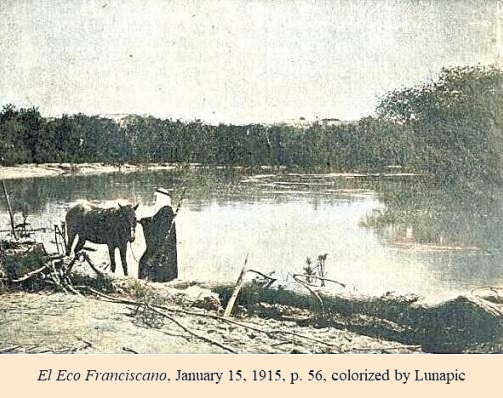
There is not a single town over an area of 800 square kilometers around Caphernaum. Bethsaida, Magdala, Korazim, Julias, Gerassa, etc., are today nothing more than a pile of ruins covered in brush. The countryside between Caphernaum and the mouth of the Jordan River can not be crossed without a real danger of being devoured by beasts, a contrast with the flocks of blackbirds that gladden and enliven it. Last March we crossed it and had a very bad experience when we came upon five big hyenas. We backed away instinctively when we saw them, but the Bedouin accompanying us, rifle slung over his shoulder, encouraged us saying that they did not attack in the daytime, and so we proceeded on our way without incident (p. 771).
In 1900 they [the Franciscan Fathers] put up two small provisional cabins there [i.e., on the overgrown site of the ancient synagogue], one for the labourers and another for the clergyman in charge of the planned excavations. But who among the Franciscans of the Holy Land will own the courage to settle among the ruins of a city covered in brush, full of scorpions and every species of snake, with wells here and there formed naturally by the lake's drainage and turned into wellsprings of pestilence, without any company for many leagues round about other than the wild beasts roaming at will and the Bedouins who, armed to the teeth, make the rounds of that lonesome wasteland from time to time? (p. 771).
December 15, 1909. El Eco Franciscano, revista quincenal ilustrada, year XXVI, number 391, page 813.
The schismatic Greeks, zealous to offend the Roman Pontiff, began publishing in Constantinople a novel entitled, La Papesse Jeanne.1 The Turkish Ministry of the Interior got wind of the false storyline and halted publication of the novel forthwith. As well the ministry banned the impious comedy of two French Jews, Foyer.2
January 1, 1910. El Miño, es el diario de mayor circulación de la provincia, year XIII, number 3306, page 1.
The Jews rebel against the verdict that close to two thousand years ago sentenced them to live without a fatherland, and today Zionism, which we could tab Jewish nationalism, begins to manifest the first signs of an organization aiming to reunite the Jews for possessing the promised land, the territories between the Euphrates and Egypt.
Zionism was begun by Herzl twelve years ago in Germany but, say its defenders, it's still a long way from having gelled all the Israelites of the [German] Empire into a national movement.
The present Zionist Congress of Hamburg has not garnered the universal approval of Jews, as advertisements by prominent Israelites on some Hamburger newspapers attest.
These ads say that the majority of German Jews opposes Zionism vigorously and that hardly 100,000 out of twelve million Jews worldwide support it. Only 6,800 German Jews (out of a constituency of 600,000) are Zionists. A sizeable fraction disputes the movement's political takes and merely endorses the colonization efforts in Palestine. That is why—say the ads—the German Israelite community has declined to take part in the Congress. The congress convoked just 352 delegates.
The Jewish masses do not want to dissociate themselves from the rest of society other than religiously. Thus a Jew wishes to be German in Germany, French in France and Belgian in Belgium. He seeks no national identity apart from his country of residence.
Hence the rift with those who strive to awaken the historical ideal of a national Jewish consciousness.
Max Nordau the renowned president of the Hamburg Congress has pinned down the significance of Zionism with greater clarity,
Zionism is a movement whose objective is to provide a secure home in Palestine unconditionally for all the Jews living abroad in the nations of the world who can't or won't assimilate.If this class of Jews asks for a permanent homeland in Palestine it is not to dwell there as naturalized foreigners or as tolerated guests but as heirs to a Jewish national life that was quashed 2,000 years ago physically but was preserved consciously.
Zionism is nonexistent in France but it teems in Russia among the intellectuals and the proletariat.
According to Max Nordau the most forceful opponents of Zionism are those affluent Jews who defer every ideal to their social ambitions,
These call themselves French, German or British with the same sense of right as natural citizens or natives. They do not forgive us our attempt to resurrect the Indian nation.
Aside from those Jews the Turkish State will be one of Zionism's most powerful foes. The Ottoman Empire, notwithstanding the advent of the Young Turks 1 who are infinitely more tolerant than the ancien régime, realizes that the creation of a Jewish nationality risks increasing the number of eclectic factions and races in it. That is why it refused to sell large tracts of Palestinian land to the Zionist Bank in several occasions despite the bank's juicy offers. Aware of the problem, the Zionists opted to make agricultural colonies the national hub of their primordial country.
Many wonder whether Zionism will be able to overcome the hostility of fellow Jews and eventually create the Jewish fatherland.
February 15, 1910. El Eco Franciscano, revista quincenal ilustrada, year XXVII, number 395, page 118.
I am here in this Orient, cradle of Christianity, theater of all the centuries' greatest events since it witnessed the glorious deeds of famed Josuah the leader of the people of Israel. Since his campaign of conquest to our present day it has not lost its allure; thus we see that the Syrians or the Babylonians first, the Pharaohs next, Alexander of the Greek Empire, the generals to whom he bequeathed his vast domains, the Maccabeans and their epic feats, the Romans, the Crusaders of the Middle Ages and now the flourishing nations of Europe, all have set their sights upon this territory, aforetime fertile, emporium of civilization and industry, but which in the Turk's hands today we behold deserted—and because of the Sultans' nonchalant administration or the municipalities' neglect or the sloth of Mohammed's followers—we behold its fecund plains untilled, its rich mines unopened—lying deep inside the long mountain ranges which gird it—without the prospect of one miserable factory to hint at the active life of an enterprising spirit.
FR. ALEJANDRO TORIBIO
March 23, 1910. La Correspondencia Gallega: diario de Pontevedra, year XXII, number 6024, page 1.
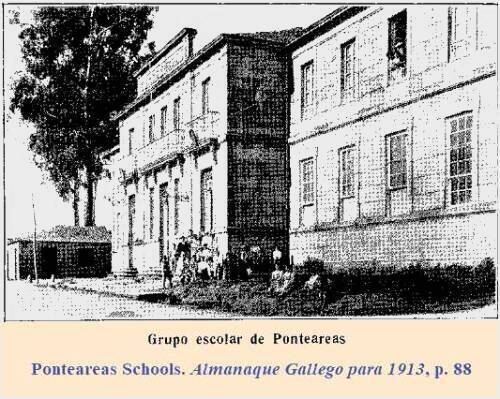
The preannounced Assembly called by several Catholics of this village to protest against secular schools has been held.
Law student D. Lorenzo Valdés begins his speech manifesting that Spain remained a great nation while the forward ranks of the army held high the standard of its God and its Fatherland. He demonstrates that the Jews were the ones who removed the Cross that crowned the Spanish flag, thenceforth turning our glories to disasters, and that the Jews were also the ones who acclimatized to Spain—where heresies and schisms had never infiltrated—the harmful Liberal doctrines which he blames for the misfortunes we bemoan today and for the existence of secular schools. He urges Catholics to organize themselves in Assemblies by parish, diocese and nation to protest, with our pastors at the head, all attacks against our religious and citizenship rights. And he concludes by saying that just as our forefathers took part in the struggle between Muslims and Christians so must we not shun the struggle presently joined between Catholicism and the libertarian sects.
May 23, 1910. La Correspondencia Gallega: diario de Pontevedra, year XXII, number 6073, page 1.
The recent trip to Palestine by Prince Fredrick Eitel the Kaiser's second son to inaugurate the German orphanage on the Mount of Olives and the Our Lady of Zion Catholic Church seems to give the nod to those who hold that a complete Germanization of the Holy Land is nigh.
And truly there can be no doubt that German influence in Palestine is on a fast uptick since the luxurious visit of Wilhelm II 1 to Jerusalem in 1898. A traveller who recently ascended Mount Nebo and from that height contemplated like Moses the entire panorama of the Promised Land has said that the only buildings of Jerusalem visible from such a distance were all German establishments. Among them are the aforementioned Our Lady of Zion with its Benedictine convent, the Catholic hospice of St. Paul beside the Damascus Gate, the Catholic hospital of Kubabeh and the hospice on the Mount of Olives which bears the name of Kaiserina Augusta Viktoria,2 who picked the emplacement personally. Incidentally two bronze statues, two meters tall, sculpted by Moritz Wolff, were erected in the main yard of this hospice and for a few days had the other Great Powers concerned because said statues portray the Kaiser and his wife, she dressed as a medieval queen and he with the vestments and arms of the Crusaders, on his head the crown of the ancient kings of Jerusalem.
But far more important than those statues, however prophetic they might be, is the fact that the most influential association in the Holy Places today is the German Society of Jerusalem which not only has under its authority the institutions of German origin but also those founded by other countries, among them the Swedish hospital of Jerusalem, the Syrian orphanage, the industrial school of Jerusalem, etc.
Many Israelite institutions of Palestine also have a German origin. A big polytechnical school is being built in Haifa 3 thanks to the efforts of Dr. Nathan of Berlin.4 An important German iron tubing factory is negotiating the concession of Jerusalem's municipal water supply.5
Naturally the situation worries the other nations, especially the French, not just because a protectorate in Palestine might raise the status of Germany as an important nation but much more because naturally their heart breaks when they see their enemy obtaining peaceably, without the careless shedding of one drop of blood and entirely by its own efforts, what they were unable to obtain during the Crusades by force of arms and assisted by the whole of Christendom.
June 19, 1910. El Miño, es el diario de mayor circulación de la provincia, year XIII, number 3435, page 1.
The Pontevedran chapter of the Economic Society of the Friends of the Country proposes inviting Sr. Unamuno the wise dean of the University of Salamanca to give a conference about Columbus' nationality as he is so fond of the data published to date on this subject.
In a letter addressed to the head of that Institute, Unamuno states:
You have no idea how pleased I am that Columbus is Jewish and Galician. It pleases me because those insufferable Italians infest South America with a hatred of Spain and are the promoters of the stupid slur given over there to the most noble title of Galician.
March 1, 1911. El Eco Franciscano, revista quincenal ilustrada, year XXVIII, number 420, page 152.
The number of pilgrims who booked second and third class accommodation for the [sixth] pilgrimage to the Holy Land is so extraordinary that said bookings are ranked conditional.
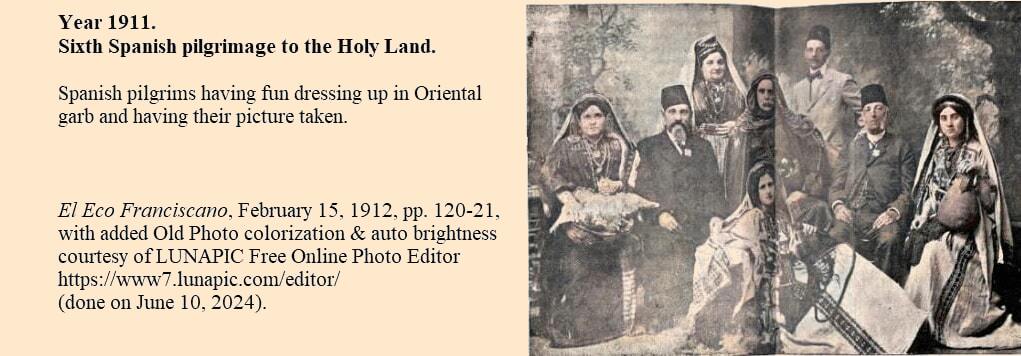
Pilgrims who book first class accommodation have their berth guarantied.
May 15, 1911. La Voz de la Verdad, diario católico antiliberal con censura eclesiástica, year II, number 187, page 3.
Reports from Tangier inform that agitators are trying to stir up dissension among the troops of Fez.
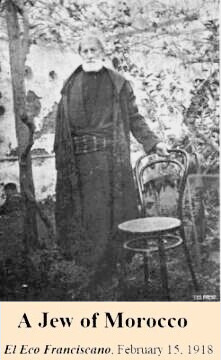
Bremond 1 and the French consul General Mangin 2 strive to maintain the Sultan's authority by way of transactions because they feel that it is absolutely necessary for the restoration of law and order to negotiate with the rebels.
It has been confirmed that the situation in Fez is extremely grave.
The Makhzen has run out of cash, leading observers to believe it can keep resisting for at most fifteen days.
The principal men of Salé 3 hold frequent meetings in which belligerent dispositions prevail.
This attitude impacts the populace and foments the pretension of plundering the Hebrew neighbourhood, and this in turn is the reason why the Israelites have sought shelter in Rabat under the protection of French troops.
These safeguard the Hebrew neighbourhoods and threaten to bombard the population upon the first sign of an uprising.
September 5, 1911. La Voz de la Verdad, diario católico antiliberal con censura eclesiástica, year II, number 277, page 2.
The [tenth] Zionist Congress held in Basel discussed revising the movement's statutes and giving the movement a final framework.
When the point on Jewish emigration was raised a Russian delegate declared that 1,800,000 Jews had emigrated to the United States over the span of twenty-five years and that another 400,000 had gone to other countries.
The same delegate said that a way of channeling the emigration to Palestine must be devised in order to forestall the dispersal of the race since currently only 2,000 Jews move to Palestine yearly.
The congress moved that a proposition to set up an emigration Committee in Berlin be sent to the eight-member Committee for appraisal.
Almanaque Gallego (para el año 1912), year XV, pages 54-56. Manuel Castro López con la colaboración de distinguidos escritores y artistas. Buenos Aires: Talleres Heliográficos de Ricardo Radaelli.
We have already demonstrated in one of our recent numbers with facts and proofs how support for the Zionist propaganda circulated in our country may bring extremely grave consequences for Ottoman judaism. It is irrefutably certain that the ruling circles of our country see this movement as baleful and that they throw all possible monkey wrenches into the realization of even the smallest project. To encourage or indeed brook the spread of Zionism among us is to risk losing the government's sympathy and that of the Turkish people.
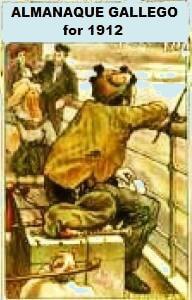
We could append the words of Mr. Oscar Strauss the Ambassador of the United States in Constantinople to all the proofs we have hereto submitted.2 This eminent coreligionist who is apt to know precisely the opinion of the leading Ottoman circles because of his high rank in the capital has declared in a most categorical fashion that Zionism can bring immense harm to the Jews of Turkey by making them suspect elements in the eyes of the authorities and of the Turkish people. The words of Mr. Oscar Strauss caused a profound impression in the entire Jewish world and particularly in the Zionist sphere. But the leaders of that movement tried to erase this impression with misleading and childish arguments, endeavouring to make everyone believe that Mr. Oscar Strauss was ill-informed and that they alone grasp the real state of affairs. These arguments could only purpose to deceive the readers for it is absurd to pretend that the Ambassador of a great power like Mr. Strauss—an ardent Jew who always showed interest in the fate of his brothers; who defended them energetically with pen or word many times—was ill-informed about a movement which he has a great interest in understanding. The Zionist cause must be in a bad way when they pretend to discredit the words of an eminent man of state with such arguments.
We were therefore convinced that Zionism can only be detrimental to the interests of Ottoman judaism. Then something happened this week which bolstered our conviction even more; we did not go looking for it, it happened spontaneously.
Yesterday the honourable "Qiesós Nami Bie" the public education inspector of the "Bilect" [?], an influential member of the Ottoman Union and Progress Committee,3 a good friend of our journals, dropped by our Editorial Department for a visit. We had a friendly chat on various subjects. Qiesós Nami who, we repeat, is an influential member of the Committee, perfectly acquainted with the opinion of the ruling circles on all political matters, shifted the conversation to the subject of Zionism.
Qiesós Nami, fully conversant with this movement, asked us good-naturedly to expound its scope. Let the Zionists rest assured that we described the movement in the most favourable light. After having heard us attentively the honourable Inspector of public education said,
"Young Turkey will never allow the fulfillment of the Zionist projects whether they have a political object or not. Young Turkey will never allow the concentration of a large mass of Jews in Palestine because she must think about the future and forestall the possibility of snares later. We open wide the doors of our country to Jews persecuted in other countries on the condition that they will settle down in whatever province the empire requires it, but we will rebuff the Zionist projects vigorously for as long as Young Turkey exists.
"It is superfluous to assert that Turks ergo can not sanction Ottoman Jews taking part in this movement and working on its behalf. To date Israelites have enjoyed the full trust of the authorities and of the Turkish government. But if they undertake to expand a questionable movement it is only natural that they too will become notorious and when suspicion enters the soul it's hard to root it out. Therefore the expansion of Zionism in Turkey can only compromise Ottoman judaism."
"Pardon, Nami Bie, one last question. Do all the ruling circles hold the same unfavourable opinion of Zionism?"
"The ruling circles watch this movement generally with suspicion, this I can attest to. If some bureaucrat expresses a different opinion he is only expressing his own personal opinion, nothing more, which in this case stands in contradiction with that of the ruling circles.
"Hence it will be good to advise your coreligionists to drop all support to Zionism and to spurn it completely since this movement can only hurt Ottoman judaism."
Such are the words of Qiesós Nami, an influential member of the Union and Progress Committee who is at the same time a sincere friend of the Jews. Despite its diplomatic reserve this language speaks clearly enough: he says that Zionism constitutes a grave peril to Ottoman Israelites because it can spawn a powerful antisemitic reaction.
We wish to express our hope that in light of this menacing danger the few enthusiastic young men and the reporters of that enthusiasm will be reasonable and renounce all references to the propaganda of a movement which is under suspicion and which may bring a catastrophe upon all the Israelites of this country who till now have lived in complete tranquility and security.
Original translation from Hebrew to Ladino done by:
Benito F. ALONSO 4
Orense, 1911
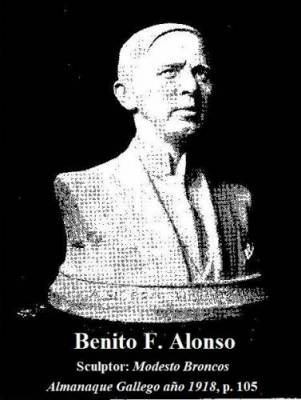
Benito F. Alonso started collaborating with Almanaque Gallego in 1903. On page 31 of the 1906 almanac he is described as follows:
He is a son of the province of Ourense who hails from a town on the borderland with Portugal. He is straightforward and festive. Deeply religious by nature and because of his studies in the diocesan seminary, clean-shaven, upright, he wrote The Bishops of Ourense but chose wedlock over priesthood, and that twice. He also wrote The Jews in Ourense, his latest book, which garnered a good reception from Hebrew intellectuals. Incapable of hurting a mosquito, a lover of peace, invariably smiling at and forbearing with his friends' pranks, he withal wrote The Wars against Portugal. The owner of one of the better houses embellishing Feijóo Square, well-heeled, he does not balk at standing behind a counter to turn the supposed bankruptcy of a retailer into a perfect liquidation with profit margin to boot.
January 5, 1912. Diario de Galicia, year V, number 928, page 1.
We reproduce the following paragraphs from La Bourse Egyptienne, under the rubric of curiosity, apropos of Zionism and the scheme to dominate the world proposed by a Rabbi in his speech before the tribune of the Congress of Lemberg.1,2
Our readers will realize through them to what amazing extreme the Jews take their brash audacity; and they will notice at a cursory glance the coincidence between Israel's hankerings and Masonry's plans, these steered to satisfying those in full, which proves the very strong bond connecting them.
"My brothers," says the Grand Rabbi, "Lo, for nineteen centuries the Jews have striven to take hold of the world's Government, a pledge that God Himself delivered to Abraham the patriarch. However the Cross obtained the victory and humiliated the Jews. These, scattered the world over, were for a lengthy spell the object of horrible persecution. Nevertheless our hope abode. The very fact that Jews were dispersed across all the continents demonstrates that all those lands belong to him.3 Now we are witnessing the impressive spectacle of Israel growing stronger each day!
"Gold, metal before which all Humanity bows, gold the revered, is almost wholly in the hands of the Jews, and gold abets Israel's future. The epoch of persecution has ended. The progress and civilization of the Christian countries are the best haven sheltering the Jews and smoothing the realization of their plans. We Jews have at length seized control of the global stock markets: Paris, London, Berlin, Vienna, Hamburg and Amsterdam are ours. Wherever Jews dwell they possess immense fortunes.
"Currently all States are in debt. Debt compels them to hand over to the Jews guaranteed state-owned mines, railways and factories.
"But more is required, it's necessary for Jews to own all the land, especially the landed estates! If big landed properties were under Jewish ownership the Christian labourers who toil there would yield enormous earnings for Jews.
"We have stooped beneath the yoke since nineteen centuries ago; but today we have grown greater and more powerful than our oppressors. It is true that certain Jews brook getting baptized; but this deed ends up strengthening us further because a baptized Jew will never cease being a Jew. The days are coming when Christians will wish to become Jews and in that day the people of Judah will accept them in with despitefulness.
"The enemy of the Jews par excellence is the Catholic Church. This is why we come to graft on this accursed tree the spirit of disbelief, lasciviousness and self-indulgence. We must fan and kindle strife and dissension among the different Christian denominations.
"In the first place we must wage an implaccable struggle against the Catholic clergy in every sphere. We must confront the priests with the parodies, curses and scandals of their private life and so consign them to the disdain and derision of the world.
"We must halter the education system. The Christian religion must disappear from the school curriculum. The Church will lose its influence, fall into poverty and its wealth be Israel's booty.
"Above all the Jews must seize power and key professions. The legal profession, the judiciary and the medical profession must be in the hands of Jews. A Jewish doctor has the best chance to enter into an intimate relationship with a Christian family.
"The Jews must annul the indissolubility of a Christian marriage and enact the civil marriage all over the world. France has already been conquered by us and next will be Austria's turn.
"Lastly we must absolutely take hold of the press. And this will be the moment when our kingdom will be assured and complete." 4
February 28, 1912. El Correo de Galicia, year XIII, number 3359, page 1.
Constantinople, 24. The Government has decided to expel all the Italians found in Syria and Palestine except for members of religious orders and those under the protection of France.
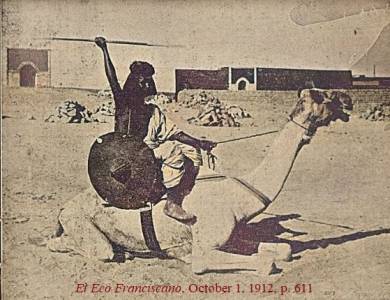
Cologne, 24. The Cologne Gazette correspondent in Constantinople has logged the remarks of Turkish officials back from Tripolitania concerning the Arab contingents they saw in action.1,2
Arabs are in their element fighting. They love war for the sake of war. Each tribe pledges a certain number of combatants to the army. The number changes but no tribe fails to meet its quota.
March 1, 1912. La Región, year III, number 623, page 1.
Salem the lawyer who is the talk of the press these days has come to Rome representing the Allatini and Levy houses property of Italians impacted by the Italo-Turkish War.1,2,3,4 In addition Salem was appointed by the Committee of Union and Progress to seek the backing of the Italian Grand Orient for framing peace terms favourable to Turkey when that day arrives, thus buttressing the judeo-masonic regime called "Young Turkey" which fractured extensively over its responsibility in the Tripolitanian war.5,6
Indeed all political parties of the Ottoman Empire opposed to "Union and Progress" accuse the "Young Turks" of having bungled the Tripoli affair, not readying the military defence of Tripoli in advance or attempting a diplomatic solution. In fact "Union and Progress" thought it had anticipated everything and precluded all difficulties when, through international Francmasonry channels, the Committee of Salonica discussed the matter with Luzzatti the president of the Italian Council of Ministers at the time.7,8
Luzzatti promised Italy's benevolance to "Young Turkey." Accustomed to masonic procedures and convinced that official governments as a rule execute what masonic lodges dispose, Salonica's judeo-masonic leaders felt relief in regard to Italy and confident about Tripolitania's future where they offered littoral coal-deposit concessions to foreign countries, etc., etc. All this was wrought in the masonic centers of Constantinople, Salonica and Rome, behind the back of the Italian Embassy in Constantinople.
Salem the lawyer, a more successful incognito on a previous visit to Rome, is well-informed about all this skulduggery. Luzzati was compromised and the Grand Orient of Justinian's Palace took upon itself the mission of making the Italian government implement in favour of the Turkish government the promise made by Luzzatti the Francmason and Israelite brother to the Francmason and Israelite brothers of Salonica.9
Everyone knows about the attempts of the Italian Grand Orient to thwart by violent means the sending of Italian troops to Tripolitania—everybody knows about the tricks used to declare the general strike, aborted by the ensuing national outrage—well known are the efforts of Freemasonry among whose leaders are the bosses of Italian socialism—and despite all these betrayals of the fatherland the Italian Grand Orient has the cheek to demur to all these charges and brand itself a good patriot who desires the triumph of Italian arms in Tripolitania.
Since then masonry has been working actively (unofficially) on the creation of international hopples to the achievement of a quick peace settlement; the masonic press advocates the establishment of an Ottoman caliphate in Tripoli and Cyrenaica.10 Realizing that the masonic intrigues are foundering and that conditions in Arabia and the Balkans press the government of Salonica and Constantinople to think seriously about peace, Salem is in Rome to handle private matters...which does not hinder his treating others quite distinct.
As we've already said, Salem meets everyday with the bosses of Justinian's Palace who just gave there an intimate reception in his honour.
When Salem the lawyer declared that no commission of the Turkish government had brought him here he gave himself away, and say what he might, the goal of his trip is none other than to lay down the chief guidelines for Italian masonry to follow in tandem with the Committee of Union and Progress in drafting peace terms with Turkey.
Incidentally Francmasons could not have found a better ambassador for the mission because Salem, an Israelite of Greece, enjoys the reputation of being a skilful person with extensive knowledge of politics and finance, a leverage enhanced by his high position and degree in international masonry.
J. BERALDI.
January 7, 1913. El Diario de Pontevedra, year XXX, number 8599, page 1.
An agronomist who has just finished making an exploration trip across the Upper Galilee says he has discovered a specimen of wild wheat which must be the ancestor of our modern wheat.
The wild wheat, sometimes covering far-reaching fields, is a sturdy plant whose grains measure on the average eleven millimeters long and whose nutritional properties have nothing to envy those of the domestic cereals we habitually consume today.
Lastly the most interesting property of this wheat whose origin hearkens back to the days of Genesis is its admirable resistance to all types of climate; it does not fear exposure to the hot sun or to frosts and adapts easily to very arid or very rocky terrains.
Therefore if the Jews of the entire world decide one day, as the Zionists so desire, to go en masse to colonize Palestine, their ancient fatherland, they will not have to exert themselves a lot to raise their crops since the wheat grows by itself.
January 9, 1913. La Región, year IV, number 883, page 2.
London. It is affirmed that the Pope has sent ambassadors to the conference to draw attention to the plight of Palestine.1,2
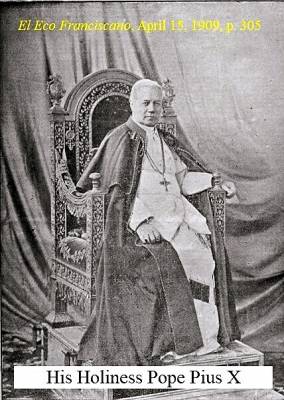
The Pontiff wants the Powers to reach an agreement which would snatch the Holy Land away from infidel administration.
January 10, 1913. El Eco de Galicia, year X, number 1965, page 2.
There is no foundation whatever to the news that the Pope had besought the ambassadors attending the London conference to deprive Turkey of any role in Palestine involving the guaranty of the inviolability of the Holy Places.
January 14, 1913. La Región, year IV, number 887, page 1.
Tangier. But let my readers know that there is more concern about Morocco elsewhere than in Morocco itself. The Moors because their languor mounts to an incredible degree in this as in all others matters; the Jews because they don't own a flag, and the Christians because sad experience tells us that however many pretended reforms are introduced in this country they will all be futile until the ignorance and the fanaticism of the natives are banished.
FR. BUENAVENTURA DIAZ.
Misionero Apostólico.
Tangier. January 9, 1913.
January 28, 1913. Noticiero de Vigo, year XXVIII, number 11433, page 2.
Paris. The Versailles Tribunal has sentenced Charles Maurras the royalist writer to eight months in jail and a fine of 200 French Francs for having inflicted some insignificant wounds on a policeman during a commotion.1
Upon hearing the sentence the accused said, "I move my appeal from the Jewish judge to the French judge."
Royalists stood up for their friend and the public in the courtroom went over to their side shouting, "Down with the Jews!"
Gendarmes had a hard time reestablishing peace.
February 1, 1913. Noticiero de Vigo, year XXVIII, number 11437, page 2.
Paris. The Catholic or independent press has angrily protested the "scandalous" ruling of the Versailles Tribunal presided by Worms [a Jewish examining magistrate] sentencing notable writer and eminent journalist Charles Maurras to eight months in jail and a fine of 200 French Francs for administering blows causing bodily harm.
Rochefort writes in La Patrie, "It is true that if Maurras were Jewish he would not have been sentenced by Worms the Jew to eight months in jail under pretext of a fracas where it's unclear who struck whom first.1,2 The inflated sentence handed down to our pal Charles Maurras displays all the signs of implacable rancour. It is without doubt the avatar of Dreyfus' threat: 'My race will avenge itself on your race.'"
The following are the facts. A little more than a month ago a spat broke out as militants of Action Française were leaving a meeting in Versailles—Maurras is their mouthpiece. There were a few give-and-takes and the Camelots du Roi, ardent, gung-ho youths, landed a few raps on a few heads.3 Charles Maurras was present and, being the tastiest prey, on him was pinned the blame for the blows and bruises dealt out in the brawl.
Maurras' attitude before the Jewish Tribunal last Saturday [i.e. January 25] is well known.4
He replied to the president's questions twice, energetically, "I am a Frenchman and I shall not answer the questions of a Jewish magistrate."
After a false charge and sentence were read out, Charles Maurras exclaimed in a firm, vibrant voice, "I shift my appeal from the Jewish judge to the French judge." A great salvo of applause filled the courtroom, followed by shouts of "Down with the Jews!"
La Libre Parole says, "the sentence is outrageous, Worms the Jew, president of the tribunal, has conducted himself like a varlet throughout the trial." 5
Maurras will probably appeal this arbitrary sentence; but if he should face another Jew in the next trial the most propitious outcome he can hope for is to have the penalty unaltered. And Thalamas will be watching, for he will presently want to requite the kicks he received years ago from the Camelots du Roi, the illustrious journalist's disciples, who forced Thalamas to quit teaching for deprecating Joan of Arc daily.6
ECHAURI
February 6, 1913. La Voz de la Verdad, diario católico antiliberal con censura eclesiástica, year IV, number 753, page 1.
The Turks tear each other apart, and the European States will not tarry long in imitating them.1
March 18, 1913. El Progreso, diario independiente, year VII, number 957, page 2.
Madrid, 17, 10:20 PM. Sr. Arribas y Turull has delivered a remarkable conference at the Atheneum today.1
The theme of the conference was "Christopher Columbus a native of Pontevedra."
The lecturer states in the Memorandum he read from that the immediate cause for holding the present act was his having been publicly challenged in the press to expound on a theory he has put forward some time ago and reaffirms: the immortal mariner is Galician.
He dismisses Sr. Altamira's claim that Columbus was born in Genoa for lack of proof.
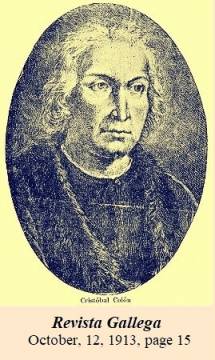
He proves that the surname Columbus is a variant of Colón and maintains that the latter is found only in Pontevedra, demonstrating that the Galician city was his birthplace.
He adds that Colón the surname was used by many Jews then living in Spain, and from this deduces that a Hebrew discovered America.2
He added that Columbus himself unveiled what was his mother tongue in a romance written by him in Castilian.
He also reminds the house that the names Columbus assigned to the first territories he discovered evoke Galician placenames and afford a new and powerful argument on behalf of his thesis.
He exalts Sr. García de la Riega the genuine author of the theory which he, the orator, merely disseminates for public knowledge.3,4
The orator was extremely eloquent.
He was interrupted at recurrent intervals by enthusiastic ovations of the audience which at the conclusion of the lecture rewarded him with thunderous applause.
The event was a smash success. Many people and distinguished individuals attended.
Sr. Bonilla the president of the Historical Sciences Section of the Atheneum presided over the act.5
Among the numerous literary figures present were Srs. Ribalta, Rodrigo Sanz, Said Armesto, Neira, Barcia and Romero.6,7,8,9,10,11
April 2, 1913. Diario de Galicia, year 6, number 1300, page 1.
One more time, this one with signs of a greater urgency, the neighbouring nation faces the problem of a drop in population.
France wastes away, consumed by pampering, steeped in vices, torn down by corrosive doctrines prevailing there after the State officially apostasized from faith in Christ and fell into the arms of Francmasons and Jews.
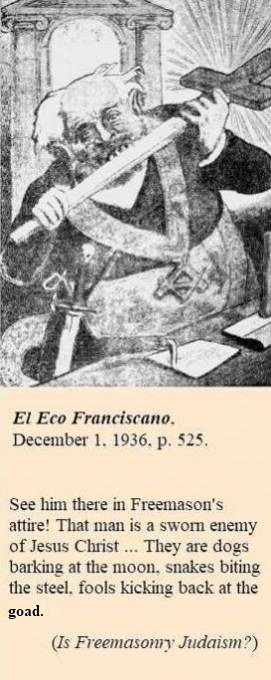
France wastes away so visibly, so quickly, that public authorities have become aware of the ailment's gravity, but it's too late because even if a remedy were found neither society nor the individual has the courage to apply it.
France wastes away. The official statistics published at the beginning of the current year are terrible; they call up the dreadful voice of the angel of the Apocalypse. Last year deaths outnumbered births by 40%. There were 70,000 fewer births in 1912 than in any one of the past years.
France wastes away because of that society's degeneracy, because of a crass and stupid egoism. They presume to dwell in this world only for pleasure, and they have endeavoured to remove all restraints. This is the truth.
It's not as if they have supposed that there are too many men—no—they figured that children arrive with caretaking chores, worries and heartaches, and they wish to skip having them.
France wastes away, and certainly not because of wars. That unfortunate nation was engaged in great conflagrations, yet the number of births did not diminish, men were not wanting.
France wastes away because she is corrupt, degenerate, pimped.
The proof is that the population does not decrease in provinces like Normandy and Brittany where faith and purity of customs is preserved. There the number of births levels with the number of deaths.
The proof is that Great Britain, Holland and Germany do not suffer from the malady that afflicts the neighbouring republic.
France wastes away ever since secularism was established and with it civil marriage and divorce.
Unhappy France! What would your most Christian monarchs, your countless Saints, your great sages, your immortal Crusaders say if they lifted the head from their sepulchre!
France wastes away because she is immoral like the cities of Pentapolis, like pagan Rome.1
And France's assassins want Spain to follow the same course. That's why Francophiles wish to implant free education devoid of religious teaching; that's why they strive for a secularist empire; that's why they hail civil marriage, divorce and the secularization of graveyards.
France wastes away, assassinated by politicians who style themselves her saviours. They too will pass away. God's justice will prevail and a terrible punishment will befall those who did away with a nation worthy of a better destiny commensurate with her history.
Spain still has some time to save herself if she really wants to. Let us repent on someone else's whacked head.
War against godless education!
Long live the Catechism that makes the peoples great, prosperous and joyous! 2
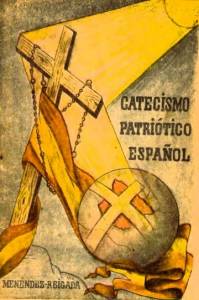
"Which are Spain's enemies?"—"Seven are Spain's enemies: Liberalism, Democracy, Judaism, Freemasonry, Capitalism, Marxism and Separatism."
"What is Judaism?"—"Judaism is the socio-political system adopted by the Jewish people after they executed Christ to achieve dominion over the world according to their prophecies; and since it cannot fulfill its desire for world domination other than through weakening or destroying the civilized and Christian peoples it deems all means to that end legitimate, thenceforth spreading all sorts of immorality, seeding all types of error, fomenting political parties and strife among the nations and even procuring wars to bring mutual destruction on the peoples."
"What is Freemasonry?"—"Freemasonry is a secret society the ally of Judaism to prosecute under cover its criminal designs; it has for motto hatred versus Christ and even versus God. Freemasonry exalts all of Nature's forces including the basest and most abominable as presumably proceeding from what they call the 'Great Architect of the Universe'; it adopts for façade dissimulation and the most cunning hypochrisy."
(Menéndez-Reigada. Catecismo Patriótico Español. 3rd ed. Salamanca: Calatrava, 1939, chapter XXXII, pp. 55-57, handle).
May 29, 1913. La Región, year IV, number 1000, page 2.
Tangier. It is reported that Moors assaulted a Jewish caravan in the vicinity of the road to Tétouan, seizing ten mules and all the victuals.
June 12, 1913. La Región, year IV, number 1012, page 1.
The press of Austria, Russia and Germany—those newspapers incredibly bulky, typeset in strange characters, making runs of hundreds of thousands of copies and earnings in the millions—have been dedicating columns and more columns to the affaire Redl and at coffeehouses, in clubs, on passenger coaches and everywhere two Austrians, two Russians or two Germans meet, the conversation unfailingly turns to the same topic, the famous affair.
Redl (photograph below on the right) was a colonel in the Austrian general staff who sold his country's wartime mobilization plans to Russia, who drew a salary from Austria for being head of the counter-espionage services on the Russian border and another salary from Russia for passing false reports [about Russian Army activity] to Austria's War Ministry.1
For six years Redl, a Freemason of Jewish origin and dissolute habits, garnered from his betrayals piles of gold which he squandered in scandalous orgies.
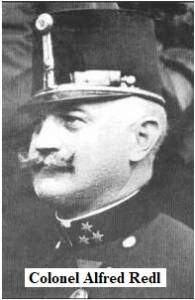
An indiscretion while drunken, a woman's revenge and anonymous messages caused his irreversible downfall. Redl had Freemason and Jewish accomplices who set up their pal for money with the same nonchalance they all showed in selling out the fatherland. The Austrian government did not hesitate to use these sharpies to get rid of the bigger one.
A very coherent mélange wherever Jews, Freemasons and the riches of the Imperial purse are involved. Once the government had definite proof of the colonel's guilt and the general staff knowledge of the password he used to contact Russian agents with, they sent Redl, then in Bosnia, a telegram signed by Sthuck [sic], pseudonym of the Russian Embassy attaché, asking him to come to Vienna.
The telegram advised the colonel to lodge under a given name at a certain hotel of the Viennese suburbs and to expect an important visit.
Redl hastened to the meeting, following the instructions verbatim, but instead of a false Sthuck he received the visit of three comrades-in-arms who after rebuking him for his treachery apprised him of his arrest within a few hours and forewarned him that any attempt to escape was futile as they would watch the hotel until police arrived. As they departed they deposited a loaded revolver on the round accent table standing in the rogue's hotel room.
Redl understood his conundrum and minutes after the visit blew his brains out.
This is the affaire enthralling Austrians today, forcing them to ditch mobilization plans which cost plenty of time and money to contrive.
The aging emperor is comfortless and confessed a few days ago that this was the cruellest bitterness to have vexed his life.2 The Austrian people who partake their sovereign's patriotic love have also started to fret about the need to remove Jews and Freemasons from the Army and Navy because those sorts love luchre above everything else and harbour hatred because they are atheists.
Forsooth it is very significant that there isn't a single case of espionage or high treason whose protagonist is not a Jew, and behind Judah's son tramp always, more or less veiled, the members of the sinister sect the adamant foe of all that is the bedrock of social order.
CIRICI VENTALLÓ
Paris, June 6.
June 24, 1913. Diario de Galicia, year 6, number 1370, page 3.
St. Petersburg. The Russian Government has proposed renewing the bilateral trade treaty with the United States.
President Wilson responded that he will accept the proposal if North American Jews are allowed to enter Russia freely.1
July 17, 1913. La Voz de la Verdad, diario católico antiliberal con censura eclesiástica, year IV, number 888, page 1.
Though we repeat it many times and in varying tones possibly many readers of ours haven't yet clearly perceived the relationship that exists between the Press and the powerful de-christianization movement that has been sweeping across Europe for some time. Hence it will not be excessive to address once more a subject overlain with greater importance than might at first seem.
We can aver that the entire anti-Christian movement of Europe and of the whole world receives direction and stimulus from Judaism merely by gauging the overwhelming influence exerted by Judaism across the world of big newspapers and news agencies, patrons and molders of public opinion.
La Civiltà Cattolica is quite right in saying that Herbert de Reuter, the British king of the telegraph service which feeds news to around 5,000 dailies, is Jewish.1,2 Jewish are the founder and heirs of the German agency Wolff.3,4 Jewish is Grosser the owner of Agenzia Stefani.5,6 Jewish are the Abrahams brothers the owners of Agence Fournier, the "Free Agency" [sic] and the "Northern Continent Agency" [sic].7,8 Jewish is Hallgarten of Boskenhim [sic], owner of the "Herad Agency" [sic]. Jewish too are Associated Press of New York and Agence Havas of Paris.9,10 In a word, the near totality of the news agencies that inform the Press of Europe and America is Jewish.
In addition there exists another conduit through which Jewish influence prevails in the Press, namely the influence wielded by owners and editors, most of whom are Jews. In the case of Germany nearly all the owners, editors and reporters of the big dailies, whether Berliner or provincial, are of course Jews. This observation applies as well to the periodicals that delve in seemingly neutral fields like illustration, forensic pathology, industry, etc. Moreover the advertising firms themselves belong to Jews in a proportion of around 70%.
In the Austro-Hungarian Empire the big dailies molding public opinion are owned by the Jews despite the efforts to brace the Catholic Press initiated recently by the Pius-Verein.11 It suffices to mention the Neue Freie Presse and the Pester Lloyd.12,13 Count Zelenski says that there is hardly any non-Jewish Press in Hungary.14

From Austria to England. It's futile to look there for a single Catholic daily. Rather the mammoth press made up of The Times,15 The Tribune,16 The Morning Post,17 The Daily News,18 etc., have fully Jewish owners and reporters, as does The Daily Telegraph owned by Lawson the Jew.19
In Russia it's not just the near totality of the large daily Press that lies in the hands of the Jews but 80% of the printing shops also.
The size of that monopoly is smaller in Italy, but the influence of the Jews in the Press is similar because it is subsidized by Jewish gold.
And what shall we say of France? Some years ago the tally of editors and reporters in the staff of the big dailies of Paris was published and it turned out that the vast majority was Israelite.
Let us take note of the principal dailies. The owner of Le Matin is the Jew Edwards.20 Le Figaro's Berr and Rosenthal, Jews.21 Le Gaulois, Meyer and Bloch, Jews.22 Le Paris, Strauss and Klotz, Jews. La Lanterne, Mayer, Jew.23 L'Echo de Paris, Simoud and Baüer, Jews.24 La Republique Française, Reinach, Jew.25 La Nation, Dreyfus and Bernheim, Jews.26 Le Gil Blas, Abraham Dreyfus.27 Le Journal, Bernheim.28 Le Radical, Simond and Hirsch.29 Le Rappel and Le Temps, Herment.30 La Petite Presse, Cremieux.31 Le XIX Siécle, Straux.32 Le Jour, Bluysen. Le Voltaire, Klotz.33 La Vraie Parole, Singer.34 L'Evenement, Schwob and Beribeer.35 Everyone an authentic Jew, and we do not count another batch present among the dailies of second rank.
In light of all these facts how can we be shocked by the universal campaign against the Church, the Catholic priesthood, Christian principles and Jesus Christ himself which we are witnessing? And how can we not applaud and bless a hundred thousand times the salvaging idea begun in Spain of setting up great institutions of Press and of information to stand up to that overwhelming swell—opposing news agencies to news agencies, daily newspapers to daily newspapers, Catholic writers to Jewish writers—and to trigger thereby a vigorous movement of reaction in favour of Christian ideas and institutions so fiercely contested by contemporary Judaism?
Thank God that the bad Press, despite causing so much harm and havoc, has not reached the formidable dominance in Spain that we deplore in other nations.
Here we shall soon be able, on the back of a generous decision by wealthy Catholics, to establish our own Agency of information which will redeem us fully from the influence of all the Jewish agencies. Here, in two or three years' time, if we succeed in rousing the enthusiasm of the rich for the Great Work we will be able to hoard the provincial Press almost entirely and outdo the most powerful one in Madrid itself, thus priming splendid days of triumph for the Catholic cause.36
May God will that Catholic capitalists wake up as swiftly and vigorously as the circumstances demand!
JOSÉ DUESO, C.M.F.37
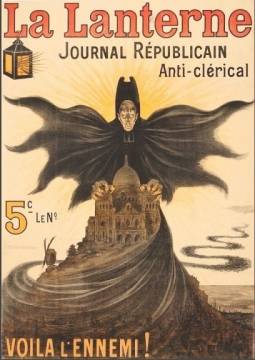
July 23, 1913. Noticiero de Vigo, year XXVIII, number 11579, page 1.
Almost nobody takes the Jewish peril seriously in Spain...
Hence the article informs its readers about the peril. "The Jews have mortgaged our country," they own the railways, the most productive farms, the big hotels, the casinos, the most conspicuous politicians, etc. The article fingers two philo-Sephardic politicians for censure, the Count of Romanones 1 and Sr. Villanueva the President of the Spanish Congress. Sr. Villanueva is a "Judaizer" hobbyist. Sr. Villanueva is visiting Spanish Morocco. His audiences in Tétouan favoured the Jewish element over the Spanish. He dropped by the synagogue in the company of wealthy Jews, "kippahs festooned with small bows bearing the colours of the Spanish flag" upon their heads. The peril exposed, the article concludes dissing Democracy for cuddling the race that is "the world's curse, the shame of centuries, mankind's leprosy."
July 24, 1913. La Región, year IV, number 1048, page 1.
Madrid. D. Miguel Villanueva is set to conclude his journey to the Spanish-Moroccan territory.1
[...]
In regard to the likelihood that Sr. Villanueva's journey will yield a practical, positive result we fear it will be fruitless, even counter-productive. Our unease is not childish. Either Sr. Villanueva is a fan of the Jews or the Jews feel a great weakness for Sr. Villanueva. And the Moors exploited by the Jews loathe these a thousand times more than they do Christians.
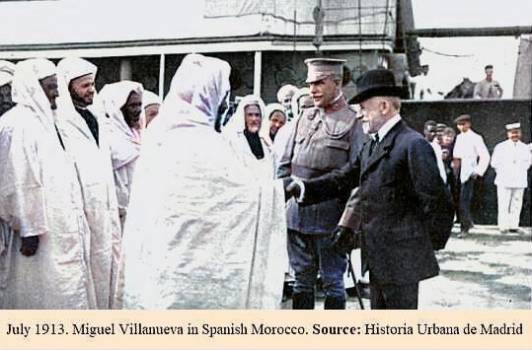
What will the Moors think of Sr. Villanueva if they appraise him by the company he keeps? What will they think of Spaniards if they view us through the Jews whom Sr. Villanueva honours with his friendship?
This would be the worst outcome. Because the astute and smart Moors can accept that we, with our virtues and defects, are going to bring them the excellent political and administrative qualities we have here, but they cannot conceive that we would try to exploit or plunder them villainously, no.
That we have never done anywhere nor will we ever learn how to do it, no matter what talkers may talk.
But the Jews are our opposites, and the Jews who dwell in Morocco needs make all the others round the world seem good. This is why the hatred which Moors harbour toward the descendants of the deicide nation is so vivid and irreconcilable, and this is why the Jews are the first ones to pay for cracked window panes in every insurrection.
Something Sr. Villanueva should have minded and pondered. It's not enough not to be Jewish, it's also required not to look like one...
MIGUEL PEÑAFLOR
August 2, 1913. El Progreso, diario independiente, year VII, number 1084, page 1.
Vienna. The population of Treutschin (Hungary) is extremely unnerved by the opening of a synagogue.1
The agitation was bred by a rumour that the Jews had sacrificed a little Christian girl to celebrate the synagogue's laying of the foundation stone.
Christian townspeople allege as proof the discovery of a girl's corpse in a neighbouring thicket when the construction of the synagogue started.
Many security forces have been sent to Treutschin to avert the atrocity mulled by the townspeople: to demolish the synagogue and behead the Jews.
September 5, 1913. El Diario de Pontevedra, year XXX, number 8800, page 3.
A steamer arrived from Ceuta to Gibraltar bringing a multitude of Jews fleeing Tétouan afraid that the Moors will attack the stronghold once the holy month of Ramadan ends.
September 12, 1913. El Progreso, diario independiente, year VII, number 1123, page 1.
The Jews of Salonica live in perpetual anxiety according to the Israelite Archives.1,2
Recently several gangs of Greeks stormed the main Jewish neighbourhoods under the pretext of rescuing a missing Christian girl whom they supposed the Jews held captive for their "human sacrifices." The gangs smashed doors and windows and rummaged every home and every store.
The police did not interfere but condoned and assisted the gangs' breaking and entering anywhere resistance was encountered.
The Community protested before Salonica's governor-general and near the King.
Both have "officially deplored the events."
It is said the King wishes to be informed by someone he can trust.
October 12, 1913. Galicia, revista regional ilustrada, órgano de la colonia gallega y sociedades regionales de Cuba, year XII, number 41, pages 14-16.
America's gold ruined us, it made us veer off diligence and, worst of all, served to finance endless wars to impose the Catholic faith everywhere and to expand or preserve the tyrannical and ferocious dominion of our kings, bringing on our heads the odium of the whole world. This has contributed to give us the reputation of fanatics and cruel. And so we are hated and cursed unto this day!
JUAN JOSÉ MORATO
(page 14)
And on October 12, 1492, the valiant Galician, the son of Jews born on the gorgeous and gay farmlands grazed by the Lérez, donated a world to Spain and a recompense to Isabella who later, influenced by the clerical trammel, repaid it with the expulsion of one hundred and eighty thousand Jews from Spanish territory.2,3
History is the jingoistic shibboleth of a people. Let an act of war between nations speak through the mouth of their historians and you will see that patriotism makes them deceive and pride distort. In the same vein Columbus passed himself off as Genovese, being Galician, for expediency and personal safety concerns, for he knew all too well that Jews and their children and their descendants were handed over to the "most holy" Inquisition which sought to purify their sins by snuffing out their lives.4 How then could he realize his noble ambition and bring to fruition the preconceived feat, having truth for motto? To veil his fatherland, to deny his roots, to pass himself off as a foreigner, was the only solution; and after he pondered it he did it. But he carried the love for his fatherland plumb in the depths of his soul; and it surfaced everyday: first it was La Gallega,5 then his hometown, later his parish—and as he sailed forth he left behind a wake of evoked childhood memories with which he comforted himself daily.
On his return voyage he visited first the land of his birth, carrying to it the leaves of a coquettish palm tree from Guarany;6 and they say that he cried tears of sorrow at his inability to divulge his fatherland and his origins to the whole world!
JOSÉ RODRÍGUEZ FAILDE
(page 16)
November 14, 1913. El Progreso, diario independiente, year VII, number 1203, page 1.
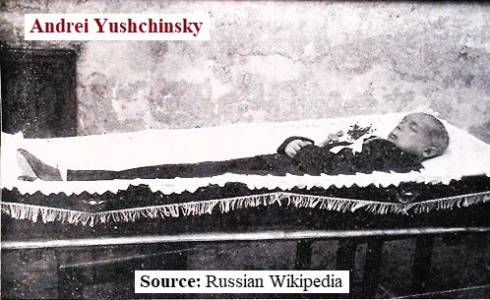
The trial of Beilis the Jew on a charge of ritual murder is over.1
The jury answered "No" to the two questions posed by the Tribunal, "Has there been a ritual murder? Was it committed by Beilis?"
After very long debates the Tribunal reached a "Not Guilty" verdict.
The facts of so strange a case are curious.
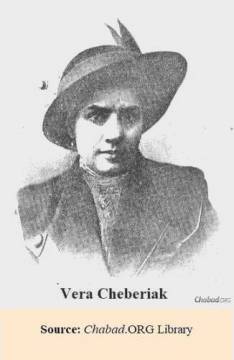
On March 12, 1911, Andrei Yushchinsky the eleven-year-old child of a humble Kievan family disappeared on his way to school. Five days passed before his corpse was found lying in the city's outskirts; the body showed forty-five wounds apparently inflicted with an awl.
The child's grandfather was the first individual to be arraigned. He had a record of misconduct and in addition stood to receive a certain sum of money upon the child's death.
It was established later that Andrei was a member of a gang of scammers headed by a woman named Vera (photograph on the left) the wife of a Post Office employee and furthermore that a brother of hers, who was acquainted with elementary notions of surgery, had slain Andrew for snitching on his buddies.
The suspicion that the child had been murdered in Vera's home solidified when a search of her house turned up clothes stained with blood. Moreover Andrei's pockets contained documents belonging to the Post Office employee.
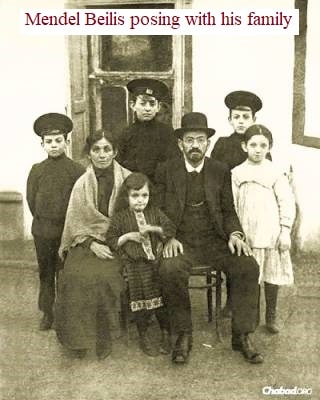
Reactionary and antisemitic organizations had from the beginning launched a virulent campaign against the Jews and circulated a version of the case which claimed that the wounds themselves comported with a ritual crime of the Hebrews. The coincidence of the murder with the Israelite feast of Passover contributed to etch this version in the minds of the Russian populace.
The Right deputies of the Duma echoed this popular rumour and one of them, Purishkevich, a fierce antisemite,2 distributed thousands of copies of a stamp showing Jews beheading children, and underneath a caption admonishing, "Christian, protect your children!"
It was necessary to find a culprit, and he was found: Mendel Beilis, the Jewish caretaker of a factory, accused by Shorbef [sic] the leader of the anti-secret societies and the organizer of two pogroms in Kiev.3
Beilis denied the accusation unremittingly ever since his imprisonment in August 1911. Twice the judges decreed his freedom, but his enemies managed to overturn their decision and keep him in jail.
The only evidence against him was the testimony of a six-year-old girl, daughter of Vera, who affirmed that she had seen a bearded Jew leading Andrei by the hand. Beilis has a beard.
The Jews were in an extreme state of alarm and they presented the Tribunal with a declaration signed by seven hundred rabbis who had testified under oath that the Jewish religion nowhere countenances a ritual entailing the spilling of blood.
The various Russian antisemitic groups contemplate redoubling their violent propaganda against the Jews.4
V.I. Lenin characterized him thus in early March 1912,
Never before has there been such avid, ferocious, reckless persecution of the Jews, and after them of other peoples, not belonging to the dominant nation. Anti-Semitism and the most crude nationalism became the only political platform of the government parties, and Purishkevich became the one full, undiluted and perfect personification of all the methods of rule by the present tsarist monarchy.("The Election Platform of the R.S.D.L.P." Works, 17, December 1910-April 1912, p. 507)
The schools, the press, the parliamentary rostrum—everything is being used to sow ignorant, savage and vicious hatred of the Jews. This dirty and despicable work is undertaken not only by the Black Hundred scum but also by reactionary professors, scholars, journalists and members of the Duma. Millions and thousands of millions of rubles are spent on poisoning the people's minds.("National Equality." Works, 20, December 1913-August 1914, p. 238)
November 16, 1913. El Progreso, diario independiente, year VII, number 1205, page 1.
Report from St. Petersburgh written on November 11. The acquittal of Beilis the Jew by a Kiev jury became known in this capital at 7:00 PM.
The newsroom of every journal overflowed with people awaiting news of the verdict anxiously.
When the telegram finally arrived, the reactionary and antisemitic elements voiced profound outrage.
Liberals, socialists and Jews, immense joy.
There were speeches, clapping and cheering in the student circles.
There were shouts of "Long live justice!"
Demonstrations and counter-demonstrations were organized.
The Police intervened and dispersed them with sable blows.
It is feared that the antisemitic elements will vent their resentment in some provinces by organizing pogroms (massacres of Jews).
The night has been quiet however.
November 22, 1913. El Progreso, diario independiente, year VII, number 1211, page 1.
The enemies of the Jews in Kiev attempted to stone Beilis at his house. The authorities entreat him to leave the city. His fellow Jews fear his flight would give antisemites the right to equate departure with guilt and to say that all other Jews must likewise be expelled.
In light of Beilis' quandary the Israelite colony of Paris, in which figure, as is well known, prominent individuals in the fields of industry and Banking, has rolled out a subscription to enable the persecuted Jew to establish residence in France's capital.1
November 24, 1913. La Voz de la Verdad, diario católico antiliberal con censura eclesiástica, year IV, number 996, page 1.
"Is it lawful for Catholics to take their money to firms or businesses of Freemasons and Jews who use it to combat the Church?"
"Definitely not; and when placing your savings, taking out all kinds of insurance, buying fertilizers, machinery, goods, etc., you should first check with:
Liga Nacional Antimasónica y Antisemita"The National Anti-masonic and Anti-semitic League will advise you free of charge. Please enclose a mailing stamp for the return postage."
35 Bailén Street, main floor
Madrid
November 28, 1913. El Progreso, diario independiente, year VII, number 1217, page 1.
We quote from the newspaper El Mundo:
"Sr. Hamann sends a courteous letter to us analyzing the initiative of our dear colleague Saturnino Ximénez (photograph below right)1 related to the necessity of holding a Sepharadim Congress in Toledo."
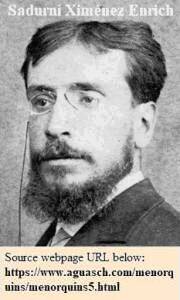
It is our pleasure to publish Sr. Hamann's letter and we leave the reply to our colleague. But we must say something of our own to Sr. Hamann concerning an idea he puts forth toward the end of his letter about establishing full freedom of worship in Spain before celebrating the Congress.
It is not possible for either a conservative or liberal Government to do that. This is the one issue that galvanizes the people of Spain to such an extent that our civil wars have not had a truer ideological base than the religious question. The exceptional leader Cánovas del Castillo, who had little faith in the people he governed, sweated it out trying to reach a consensus for Article 11 of our standing Constitution because the contrary viewpoints thought it too liberal.2 Consequently, Sr. Hamann, that idea of yours is undoable.
We believe that the Congress of the Israelites could under the present regime of tolerance go ahead in absolute freedom without the least harassment from anybody. Neither the authorities nor the Catholic faithful nor anyone else would dare to do anything against them. Everybody would respect and even compliment or take care of them, for Spanish gentility is very great and we incline to look after visitors like the Spanish Israelites.
Truly the idea of our colleague Ximénez is excellent and credits the enormous talent owned by the fellow.
Note: The antiquated formalities present in Sr. Hamann's letter are expunged.Dear Sir:
I have read your paper's well-grounded article entitled, "About the Sepharadim—The Jewish question—The need for a Congress," dated the twenty-first of the current month, with genuine interest and although I don't have a direct involvement in the matter, being a German citizen and a Protestant, still as an artless friend of Spain I am greatly enthused by the proposition tendered by the illustrious author of the article relevant to the holding of a Sepharadim Congress in Toledo. I grade this noble idea magnificent. I am certain that Spain would not only offer another splendid proof of her renowned hospitality and great gentility but would also lift her moral status before the whole world immensely.
On the other hand if I understand the article properly it is the author's wish—worthy of all praise—to see an indeterminate number of Sepharadim return to the beloved land of their ancestors. A logical corollary is that they will want to resume practising the Hebrew religion in the synagogues they left behind more than five centuries ago or in new temples yet to be constructed. But in order for this to happen, as well as for securing the Congress and guarantying it the maximum success, it becomes absolutely necessary to re-establish beforehand a full freedom of worship in Spain. Not only would the Jews and the dissidents gain with this great reform, the entire nation would much more, and even so the Catholic Church for thence it would reap greater respect.
Yours truly,
H. Hamann. November 24.
The relationship between Saturnino Ximénez and Zionism or Judaism is a complex one ... Ximénez endeavoured to divulge contemporary Spanish knowledge among the Sepharadite communities of the Eastern Mediterranean, as demonstrated by a letter he wrote on November 15, 1909, asking Menéndez Pelayo to supply him with material for a cycle of conferences in Salonica. In 1928 Pla met Ximénez in Stockholm and related that he still showed great interest in the Sepharadite communities all over Europe.Marc Mendoza, 2021: "Historical-archaeological works by Saturnino Ximénez during the period 1877-1899." Aula Orientalis: Revista de estudios del Próximo Oriente Antiguo, 39, 2, p. 270; handle.
December 9, 1913. El Norte de Galicia, diario político y de información y el de mayor circulación en Lugo y su provincia, epoch II, year XVI, number 3828, page 1.
How gorgeous, graceful and most beautiful is the Immaculate! Quam pulchra est! Her sole image is sufficient to enthrall the heart though painted with man's crude brush and viewed through human impurities.
(Next the author asserts that the Immaculate is endowed as well with mystical, moral, dogmatic and political significance)
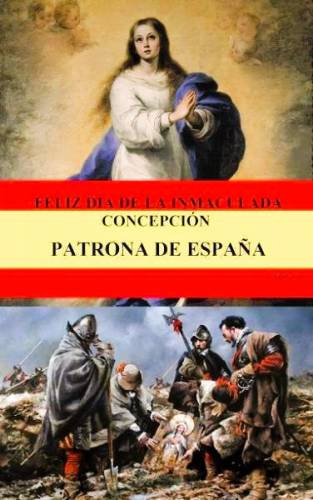
That Immaculate Virgin having under her feet the snake—symbol of cunning, tyranny and irreverence—says to us that only the nation or the government that places beneath its feet the earthly concupiscences, impiety and tyranny is great and powerful.
Let us open the history of the fatherland to verify this truth.
How beautiful, powerful and great were the Spain of Ferdinand and Isabella, the Spain of Charles and Philip!
(Next the author praises Spain's banishment of the Moors, her circumnavigation of the world, the conquest of the New World for God, the military victories, her touted sages, legislators, theologians, poets, philosophers and men of letters. He reminds the reader that her men-o'-war once ruled the seas and her armies sowed terror among the nations; Spain's glory outstripped the globe and Earth prostrated quietly in front of her, and all this transpired, he informs us, because Spain had pure faith, religiosity, Catholicism and tramped the insidious snake of heresy and impiety)
Let us turn the page...
Horror!!!...
What unhappy decadence we have sunk to!
Our faith lost, religious unity cloven, we have become ordinary grease, the slaves of nations that once were our vassals, the laughingstock of nations that once set their eyes upon us with terror. Without navy, Army, treasure or dignity we have become the servants of four Jews and the slaves of Freemasonry.
What ignominy! What stain!
[...]
ALVARO CASTRO CAMBA
(bold font mine.—EFC)
December 10, 1913. El Eco de Galicia, decano de la prensa gallega de América y de la española en Sud América, year XXII, number 796, page 2.
Jewish and Moorish converts to Catholicism adopted the surnames of their godparents, of those who baptized them or of those who granted them protection. It's what happens today with the Indians brought to the Plata Republics from the Pampas.1
The Negroes taken from Africa to be sold as slaves received the surname of their first master.
December 12, 1913. El Norte de Galicia, diario político y de información y el de mayor circulación en Lugo y su provincia, epoch II, year XVI, number 3831, page 3.
The governor has expelled six hundred students from the city over incidents related to the Beilis case.
Almanaque Gallego (para el año 1914), year XVII, pages 60-62. Manuel Castro López con la colaboración de distinguidos escritores y artistas. Buenos Aires: Talleres Heliográficos de Ricardo Radaelli.
The Synagogue. When there were more than ten Jews over thirteen years old in a town they looked for a house to convert to a synagogue, to meet together and recite their daily prayers there. The members of a prominent community did not tarry, they constructed a temple, furnished it with the sacred books and with all that is required for the three components of a spiritual life: prayer, meditation and reading.
It needs pointing out that Galaico-Portuguese Jews spoke of a "Esnoga" instead of a "Sinagoga"; we'll use both terms interchangeably.
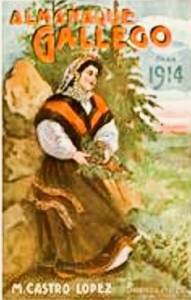
It ought to be known as well that Jews who settled in the Galician region, extending their trade and commerce primarily to cities and villages like Betanzos, Monforte de Lemos, A Coruña, Ourense, Pontevedra, Celanova and Ribadavia, were not as a rule segregated in Ghettos or Aljamas but mingled with their Christian neighbours freely until a feast of the Mosaic law congregated them before the Rabbi. However there were some exceptions to the rule. Some villages like Allariz did segregate them.
The Esnoga had to be built on the highest point of the Jewish quarter. No one dared to build his house taller than the temple or too far away to see it.
The beit Midrash, the spot in the Synagogue where prayers were read and offered to God, was prioritized for habilitation. This was a space of great sanctity which could not be dedicated to a separate use, so much so that a Esnoga may be turned into a beit Midrash, but a beit Midrash may not be turned into a Synagogue, being the holier of the two.
The temple's entrance faced the Echal, where the Sefer Torah scrolls are stored along with the lectern (Tebá).
Upon the sale of a Synagogue the first expenditure from the proceeds was reserved for the purchase of the five books of the Law plus the writings of the prophets. If these were ever sold, the proceeds could only go to purchase a Sefer Torah. Any cash left over had to be spent on something endowed with greater sanctity, according to what Menasseh-ben-Israel says in his Thesouro de los Dinim,1
Money obtained from the sale of Nedabá or Ribbon must be reserved for the construction of a Esnoga or the habilitation of a beit Midrash, for the purchase of a Tebá or ornaments for the Sefer or for the Sefer itself. If they should change their mind or forget to spend the money, they must spend it on something worthier than originally envisioned.
Holding to the principle of selling an item of lesser sanctity to buy one of greater, the Jewish sages maintain that a Synagogue with all its sacred objects—including the Sefer—may be sold to redeem captives, to marry orphans or to sustain the upkeep of the Talmud Torah because according to Hachanim whoever can explain the Sefer must be held in greater esteem than the sacred book itself.
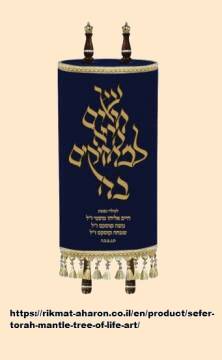
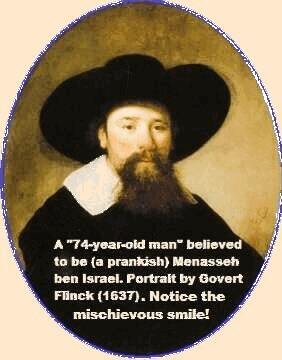
Ornaments of silver donated by devout Jews to the Synagogue could not be sold toward the purchase of anything profane. The Kaal accepted the donations for safekeeping, treating them as part of the temple's holy treasures.
The Sefer was clothed in a rich fabric (photograph to the right)2 embroidered with gold, silver or precious stones even, and this custom persists today in Synagogues of foreign communities abroad, but this cloak or cape could not be woven from fabric previously used for a profane task.
If a member of the "Esnoga" pledged to pay a Misvá (gift of cash or in deferred payments) and then cancelled the pledge because of a sudden turn of fortune the Kaal could exact his pledge from another member of the congregation subject to a full refund if the financial situation of the initial donor improved enough to permit this.
The Synagogue was as holy as everything that belonged to it. As in Christian temples propriety was a must: no eating, drinking, walking about, talking, sleeping, etc. Nevertheless the talmudin or caretakers could sleep on the midoasin.
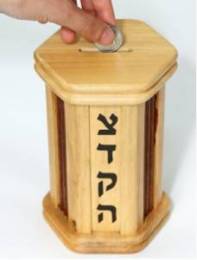
Out of respect for such a sacred place one could not enter the Synagogue just to seek respite from the cold of winter or from the heat of summer
The money boxes for Tzedakah (photograph on the right)3 or for the redemption of captives, alms and other offerings usually found in the temple, could not be opened and the amount of cash inside counted. Nor were funerals and exequies celebrated in the Synagogue unless the dead person had been an eminent individual widely admired.
It is also forbidden to take a shortcut by crossing two doors of the Synagogue, but the practice was lawful after Tefilá (praying).
When somebody dropped by a Synagogue it was mandatory to recite a psalm before leaving so as to confute any gossip that the visit had a profane motive.
One must never enter the Synagogue with the head covered, and any dust or dirt on one's clothes and shoes must be wiped away before heading inside.
The Synagogue was always clean, mopped and its candles lit to magnify and honour the Mosaic cult.
Worn-out Sefer mantles, Mezuzot (Shema Israel verses), Tefillin straps, the Echal or its curtains, the Tebá, went to a clean storerage room as sacred objects. Eventually they were fastened to the burial cloth of former Synagogue attendants.
A timeworn Sefer Torah was disposed of by sealing it inside an earthenware vessel and burying it in the grave of a Talmid.
A wax candle taken from the house of an idol-worshiper could not be lighted inside the temple.
If a mouse drowned in the Synagogue's oil receptacle all the oil in it had to be discarded.
The stub of a Synagogue candle could be taken home and used for reading but never to light a regular candle for its flame would be defiled.
Benito F. ALONSO 4
Orense, 1913

Benito F. Alonso started collaborating with Almanaque Gallego in 1903. On page 31 of the 1906 almanac he is described as follows:
He is a son of the province of Ourense who hails from a town on the borderland with Portugal. He is straightforward and festive. Deeply religious by nature and because of his studies in the diocesan seminary, clean-shaven, upright, he wrote The Bishops of Ourense but chose wedlock over priesthood, and that twice. He also wrote The Jews in Ourense, his latest book, which garnered a good reception from Hebrew intellectuals. Incapable of hurting a mosquito, a lover of peace, invariably smiling at and forbearing with his friends' pranks, he withal wrote The Wars against Portugal. The owner of one of the better houses embellishing Feijóo Square, well-heeled, he does not balk at standing behind a counter to turn the supposed bankruptcy of a retailer into a perfect liquidation with profit margin to boot.
January-February, 1914. Boletín de la Comisión Provincial de Monumentos históricos y artísticos de Orense, Volume V, number 94, pages 16-17.
The anatomical imprints of people seemingly visible on natural stone hardly draw my attention. They abound in all the continents, are venerated by all religious rites and have powered many superstitions in sundry locations.
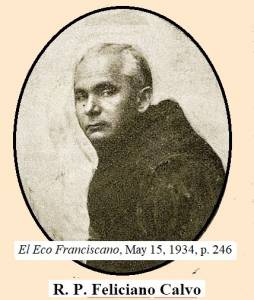
In this respect Mr. E. Salverte 1 writes,
Rock surfaces display such a plentiful variety of grooves and dimples of random shape and size that there will always be cavities on hand to call up some familiar object; and if our eyes are yearning to contemplate wonders it won't take us long to discover imprints manifestly carved on the hard stone by some supernatural power.
Muslims perceive the silohuette of Muhammad's head on the walls of a grotto near Medina and the hoofprint of his horse or camel engraved on a rock of Palestine as accurately as if it had been stamped on sand. Mount Carmel has the honour of preserving Elijah's footstep. In the environs of Nazareth that of Jonah is replicated four times beside the grave. Moses left us the impress of his back and of his arms on the stone of a cavern where he once hid. In the outskirts of Nazareth Christians revere the mark of the Virgin Mother's knee, the trace on a rock of Torrent Cedron of the feet and elbows of Jesus Christ and the footsteps of the Man-God on the very spot from where it is affirmed he ascended to his heavenly mansion.
Fr. FELICIANO CALVO, O.F.M.2
February 10, 1914. El Correo de Galicia, year XV, number 3972, page 1.
Departure by boat from Barcelona on May 6, 1914.
Return to Barcelona around June 22, 1914.
Fares (all expenses included): First class 2,200 Pesetas; second class 1,500 Pesetas; third class 900 Pesetas.
It can be anticipated that this eighth Pilgrimage to the Country of Christ will constitute a very brilliant manifestation of faith and a very congenial embrace between American and Spanish pilgrims.
The importance that surrounds this eighth pilgrimage and its successful reception in the New World are trussed by the most honourable participation of their Excellencies the Archbishop of the Republic of San Salvador and the Bishops of Havana, Pinar del Río (Cuba), Antioquía (Colombia), Trujillo (Peru) and Tulancingo (Mexico) who adverted to a concomitant inscription of numerous and distinguished members of their respective dioceses.
Itinerary. Barcelona, Alexandria, Cairo, visiting the Pyramids, Sphinx and Matarya, Port Said, Jaffa, Jerusalem, Bethlehem, Hortus Conclusus, St. John in the Mountains, Bethania, Jericho, Jordan River, Dead Sea, Haifa, Mount Carmel, Nazareth, Mount Tabor, Tiberius, Genezareth Lake, Magdala, Capharnaum, Bethsaida, Cana of Galilee, Beirut, Rhodes, Smyrna, Bosphorus Sea, Constantinople, Marmara Sea, Strait of Dardanelles, Piraeus, Athens, Messina Strait, Stromboli, Naples, Rome, Civita Vechia, Barcelona.
[...]
A telegram takes on average 12-18 hours to transit between Spain and Palestine. Regular mail takes nine days approximately.
Addendum. On March 31 La Voz de la Verdad newspaper stated that the organizing committee had managed to book the "magnificent yatch Ile de France" after surmounting great obstacles.
On May 6 the pilgrimage departed Barcelona with the bishops of Havana, Trujillo and Colombia presiding.
On May 9 Ile de France docked at Malta.
On May 13 the yatch arrived to Cairo. Incidentally Spanish pilgrimages "everywhere" were common at this time.
On May 14 the pilgrims went to see the Tree of the Virgin Mary in Matarya.
On May 17 the pilgrims began their tour of Jerusalem. They drove up Mount Zion admiring the German temple erected to the Virgin Mary near the summit; the German Benedictines showered the visitors with souvenirs and relics.
The rest of the tour mirrored the tour of 1902 (Chapter 5).
On June 22 Ile de France returned to Barcelona.
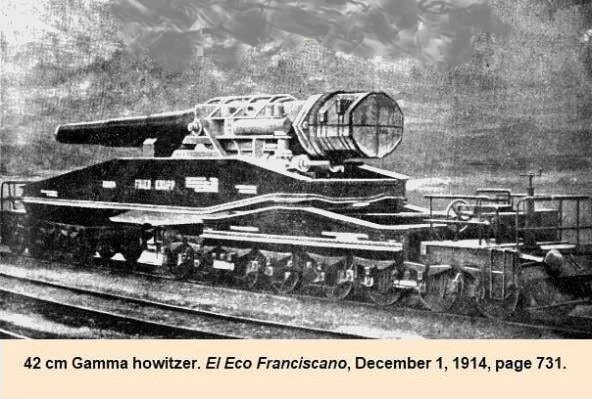
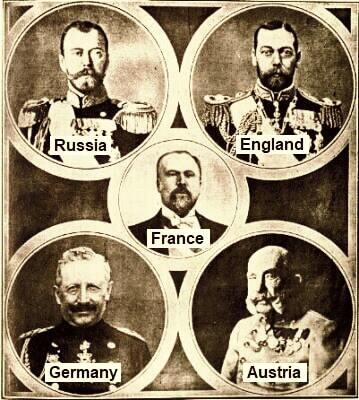
October 12, 1914. Gaceta de Galicia: Diario de Santiago, year 42, number 212, page 3.
Turkish troops are mustering in Palestine, Syria and northern Arabia, fostering the belief that Turkey will go to war eventually.
October 14, 1914. El Eco de Galicia, diario católico, year XI, number 2579, page 4.
They say from from Rome that Turkey is demonstrably making preparations for war. There is great military activity in Syria, Arabia and northern Palestine. Important points on the coasts and on the pathways leading to the interior of Syria and Palestine are being fortified. Everything suggests that Turkey's intervention in the war is imminent.
October 15, 1914. El Correo Gallego, year XXXVII, number 12151, page 2.
Reports from Sophia [capital of Bulgaria] state that Turkish minister Seti Beí has been summoned to Berlin urgently.
October 21, 1914. La Idea Moderna, epoch 2, year XXV, number 7163, page 3.
The British Government has protested Turkey's statement that it had purchased two German cruisers harassing the Russians, the Goeben and the Breslau.
October 22, 1914. El Eco de Galicia, diario católico, year XI, number 2587, page 4.
Madrid, 21. The Constantinople correspondent of the Roman newspaper Il Secolo telegraphs that it is now a genuine source for concern there to know what policy the Turkish Cabinet will adopt presently. The question, he adds, must not be raised in Constantinople. It will be in Berlin.
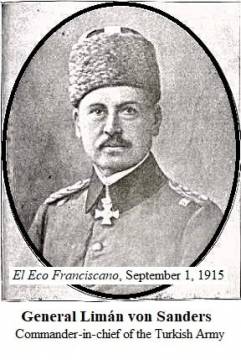
Turkey seems to have become a German colony. The Grand Vizier gives himself up blindly to the initiatives of German policy and he himself knows nothing about Turkey's immediate fate. Very highly placed Turkish dignitaries admit that the country will maintain a neutral stance or take part in the European conflict according to the impetus received from Germany.
The Kumkale and Seddulbähir fortresses have been bolstered with German artillery under the command of German officers.1
On the first day of the abolition of the capitulations 2 a slew of red cards were handed out on the streets of Istambul bearing the portrait of the German Emperor and underneath it a text in Turkish which read,
His Majesty the Sultan and 300 million Muslims dispersed all over Earth's surface, yet united in their respect for the Caliph, may rest assured that the Emperor of Germany will always be your friend.
The Emperor's signature appeared below this quotation from a speech delivered by the Emperor in Damascus in Novermber 1908.
The German officers wearing Turkish uniform are taking great pains to ready the Turkish army for war.
October 31, 1914. El Diario de Pontevedra, year XXXI, number 9152, page 3.
At 3:30 AM hostilities erupted between Turkey and Russia when two Turkish torpedo-boat destroyers entered the port of Odessa and sank a moored gunboat.
At 9:30 AM a Turkish cruiser bombarded the station and city of Feodosia (Crimea). Its shells damaged the Cathedral, the Greek church, the pier and port and set the Russian National Bank branch ablaze.
November 6, 1914. Progreso, diario independiente, year VIII, number 1477, page 3.
Madrid, 1:00-4:00 AM, urgent. London: A special edition of The Gazette publishes Britain's official declaration of war with Turkey. The British have annexed the Isle of Cyprus.
November 6, 1914. La Voz de la Verdad, diario católico antiliberal con censura eclesiástica, year V, number 1298, page 1.
Abstract. The note states that the Governments of the Triple Entente (France, England, Russia) guaranteed Turkey their full respect for Turkey's neutrality and for its territorial integrity from the onset of the war. However they witnessed Turkey's leaning toward Germany from the start, supplying arms, sheltering the cruisers Goeben and Breslau under the Turkish flag, decreeing an end to the capitulations and bombarding Russian ports on October 29. Even then the Triple Entente pressed Turkey to declare neutrality toward Germany, to curtail German influence in Turkey's Army and Navy and to banish all German officers. Turkey rejected these demands, and this forced the Triple Entente to order its ambassadors in Constantinople to abandon the country and return home.
The news from Palestine are pessimistic, even alarming, because the Arab population exudes great animosity toward Great Britain.
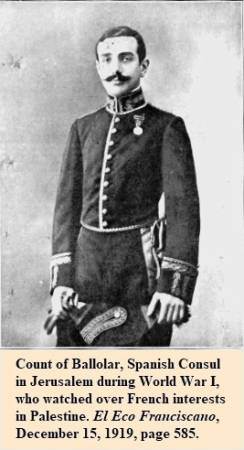
There are concentrations of many Turkish troops.
The greatest fear is that the British will attack the ports of Haifa or Jaffa and environs. If this were to happen a holy war against England would be proclaimed and the whole country would rise up in arms. The Missionaries are in great fear contemplating the possible excesses and violence of the Turks.
The French have entrusted the protection of their rights and interests to the Spanish consuls (the photograph on the left shows the Count of Ballolar who occupied the post of Spanish consul in Jerusalem at this time).
Germany has apparently obtained from the Turkish Government guarantees of respect for the Holy Places and for the Catholic Missionaries charged with their custody.
November 9, 1914. Gaceta de Galicia: Diario de Santiago, year 42, number 228, page 3.
A British cruiser has shelled the Turkish port of Gaza in Palestine.
November 10, 1914. El Eco de Galicia, diario católico, year XI, number 2606, page 4.
The British fleet has bombarded Jaffa, destroying the radio-telegraph station which linked the port with the entire coastline of Asia Minor.
The Turks flee inland.
The French and British consuls of Jerusalem and of other Palestinian cities have boarded a vessel for their personal safety.
December 1, 1914. La Voz de la Verdad, diario católico antiliberal con censura eclesiástica, year V, number 1323, page 2.
The authorities of Jaffa have stirred up the population against Christians. Should the Allies make a landing the Turks will set the city alight rather than surrender it.
The situation in Jerusalem can not be more critical.
December 13, 1914. Galicia Nueva, primer diario de Villagarcía, year VIII, number 2833, page 1.
The Turkish Navy has limited its operations on the Black Sea and along the coasts of Asia Minor, Palestine and Egypt because of a shortage and impending lack of coal.
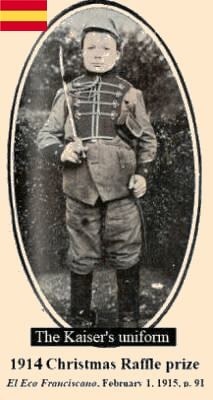
Turkey had negotiated with Britain the purchase of 80,000 tonnes of coal before the onset of the European war and received 30,000 tonnes in short notice. When war broke out between Germany and Austria, on the one hand, and France, England and Russia, on the other, the obvious hostile attitude of Turkey toward the Allies moved England to withhold shipment of the 50,000 tonnes outstanding. It is estimated that Turkey has 20,000 tonnes of British coal left and that this quantity will be consumed in the course of the month of December so that by next January the Turkish Navy will not have the coal it needs for operating.
Turkey has mines of its own in Kustamuni Province, bordering on the Black Sea not far from Constantinople, but their coal's gross calorific value is much smaller than Cardiff's or Newcastle's and this will make Turkish warships run too slow. Germany can not help out, and so it is estimated that around the start of the year 1915 the Turkish fleet will be moored dockside.
November 22, 1915. La Voz de la Verdad, diario católico antiliberal con censura eclesiástica, year VI, number 1728, page 1.
Paris. The insurrection of the Arabs in Syria and Palestine gains ground. Several Turkish and German envoys sent from Constantinople were made prisoner.
December 6, 1915. La Voz de la Verdad, diario católico antiliberal con censura eclesiástica, year VI, number 1743, page 1.
It is very probable that a direct rail service of fast luxury trains from Berlin to Constantinople will begin next week. In addition numerous trains already use the route to provision the German Army and supply Bulgarians and Turks with ammunitions.
News from Persia say that the people and the army conspire against the pro-England government. In India Muslims revolt against British dominion. British lives are in peril; many flock to the ports for safety. Entire Indian regiments have rebelled against England. In Egypt there is great effervescence amplified by the proximity of Arab troops fighting in the vicinity of the Suez Canal.
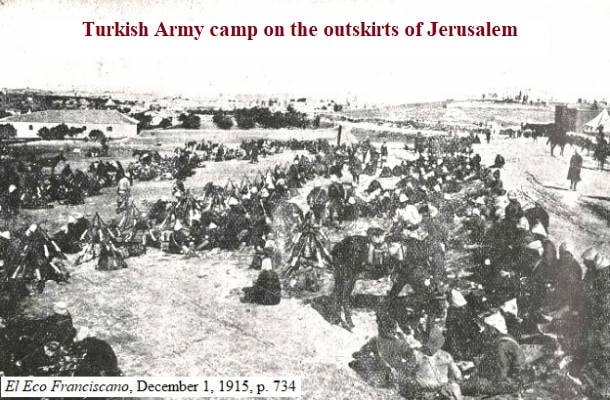
December 29, 1915. La Voz de la Verdad, diario católico antiliberal con censura eclesiástica, year VI, number 1765, page 1.
The Roman newspaper La Tribuna has published the following report from Constantinople concerning the preparations that Germans and Turks are making for the Egyptian campaign.
"It is affirmed in Germano-Turkish circles that the Egyptian campaign has already begun with vanguard military operations. According to these sources the generalissimo of the Army of Egypt had already for some weeks installed his headquarters in a certain palace of Pera. At that location a great number of German and Turkish officers work feverishly.
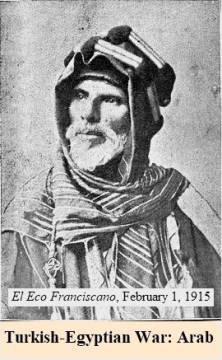
"Considerable quantities of matériel arrive daily from Constantinople at Haydar Pasha the main station on the Asiatic railway.
"Numerous pieces of heavy artillery accompanied by the corresponding personnel of German engineers and artillery specialists have been arriving to the capital of the Ottoman Empire for the past few weeks together with a great abundance of all kinds of war matériel.
"The pan-Islamic Centers of Istanbul are greatly worried 1 over news that numerous propaganda agents were sent over the past month to Arabia, Persia, Central Africa, Cyrenaica, Morocco, Afghanistan and India to preach an insurrection of all Muslims against Christians and to solicit their adhesion to the caliph of Constantinople who together with his allies will do battle in Egypt against the British occupiers. Secret agents entered Egypt via Sudan, but it's known they were all caught by the Anglo-Egyptian police.
"The news that a large fraction of the Persian population has risen up in arms versus both the Russians and the British has caused deep satisfaction here; but both remain the dominant force in that country despite disposing of limited contingents only. Withal newspapers partial to the Young Turks daydream about the Persian situation and assert that the movement begun there is the forerunner of a widespread rebellion of the Islamic world.2
"It is presumed that Germany will not send a large contingent to Egypt but dispatch a sufficient number of officers and petty officers to train the Turkish army ranks.3
"Constantinople affirms that 300,000 Turks will take part in the campaign of Egypt alongside 100,000 Germans plus an indeterminate number of Arab irregulars from the Holy Land whose adhesion is assumed guaranteed by the very efficient politico-religious propaganda carried out by pan-Islamic agents close to the sheiks and emirs of Arabia.
"A holy war is already being preached in the mosques."
Nauen. The British Minister of War is very worried about the insurrection of the Arab tribes of Mesopotamia.
The tribes of the Egyptian interior have also mutinied. All commerce has been halted in that region.
January 1, 1916. El Progreso, diario independiente, year X, number 1824, pages 1-2.
According to Le Temps the Turkish plans for Egypt have aroused a great stir in Jerusalem.
Military authorities drafted all able-bodied men between the ages of 18 and 60. The rest work in defence-related projects.
Railway lines are reserved for war transport. All cattle fit for packing or hauling has been impounded.
The local authorities compelled Italian Jews to choose between expulsion or renouncing their Italian citizenship. Many opted to renounce.
A minority will be deported to Italy aboard American cruisers.
Several Jewish newspapers written in Hebrew still circulate under the scrutiny of the authorities.
The question vexing Syrian public opinion is the situation of Baghdad and Mesopotamia as a consequence of the British expedition.
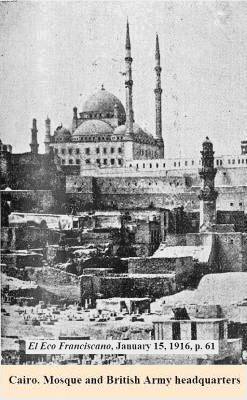
January 4, 1916. La Región, year VII, number 1791, page 2.
Reports from Egypt say that the Arabs have so frightened the English that entire units surrender when faced with the impossibility of fleeing.
Note: The photograph on the left comes from El Eco Franciscano, January 15, 1916. It shows British Army Headquarters in Cairo (a mosque).
January 20, 1916. La Voz de la Verdad, diario católico antiliberal con censura eclesiástica, year VII, number 1787, page 2.
London. Three hundred and fifty thousand Turks have breached the Egyptian border and are heading to the Sinai Peninsula.
February 9, 1916. La Voz de la Verdad, diario católico antiliberal con censura eclesiástica, year VII, number 1807, page 2.
London. It is said that the Italians will intervene in the Egyptian campaign sending a large and powerful army to defend Tripolitania and at the same time cooperate with the English in Egypt.1
February 9, 1916. La Voz de la Verdad, diario católico antiliberal con censura eclesiástica, year VII, number 1807, page 2.
Zurich. Rumour has it that the British Minister of War will travel to Petrograd soon to discuss matters of extraordinary military weight. Apparently the object of the visit is to persuade the Russians to launch a vigorous offensive to dissipate the Turkish menace versus Egypt.
February 15, 1916. La Región, year VII, number 1826, page 2.
Nauen. The English suffered an important defeat in Egypt. The losses in men and matériel is enormous.
February 21, 1916. La Voz de la Verdad, diario católico antiliberal con censura eclesiástica, year VII, number 1819, page 1.
The Germano-Turkish campaign versus Egypt is postponed until the end of the summer. The expedition will be led by Von Mackensen in lieu of Prince Leopold who is relieved of command due to delicate health.
February 24, 1916. El Correo Gallego, year XXXIX, number 12616, page 2.
Nauen. German submarines have torpedoed several British vessels along the Egyptian coast.
April 15, 1916. El Correo de Galicia, year XVII, number 4626, page 3.
The British Government has declared the entire territory of Egypt a war zone.
May 12, 1916. La Idea Moderna, epoch 2, year XXVII, number 7635, page 3.
Berlin. Dispatches from Egypt say that plague is spreading. Hundreds of people perish from such a terrible evil.
June 1, 1916. La Región, year VII, number 1915, page 2.
London. As a consequence of the defeat they suffered on May 25 the rebels of Egypt have surrendered and handed over their weapons and a large cache of ammunitions.
June 29, 1916. Galicia Nueva, primer diario de Villagarcía, year X, number 4179, page 2.
London, 28. News from Cairo state that the Turks are sending large reinforcements to Arabia in haste with the mission of protecting the sacred places of Islam from insurrectionist mobs.
July 28, 1916. El Norte de Galicia, diario político y de información y el de mayor circulación en Lugo y su provincia, epoch II, year XIX, number 4425, pages 2-3.
The mind fixates on Belgium and on Poland when pondering a future and far-off peace. Many people wonder: what will the eventual status of the two kingdoms be after the war?
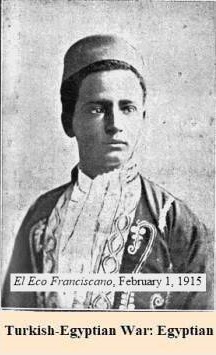
Withal few times have we heard the same question put forth regarding the Jewish race that inhabits Russia. The Jews of Russia have a legal status incompatible with civilization. The Russian peasant or soldier views the Jew as someone extraneous to humanity. Muscovite troops behaved reasonably well during their occupation of Lemberg.1 Only in the Jewish quarter did they massacre, pillage and commit all kind of excesses and abuses. This hatred, which predates the war, spurred a large segment of the Israelite population to emigrate from Russia to the United States or to London.
In the spring days of 1914 English newspapers examined the problem of Jewish immigration and its harmful impact on the interests of British workers. The war removed this topic from the concerns of public opinion, for the abundance of work dispelled the fear of Jewish access to the competitive labour market. But the unease revives with the introduction of compulsory military service, as I've had occasion to verify.
Russian Jews living in London retain their original citizenship. This enables them to dodge military service. They were initially invited to enlist voluntarily in the British Army. The invitation did not yield a good return.
And so it turns out that whereas native Englishmen are subject to military service—more or less effectively—the Israelites who fled Russia, sought asylum in England and used the advantages of British legislation in peacetime now use their foreigner status to advantage and elude the obligation to fight.
Is it out of cowardice? No, certainly not.
Mr. Vladimir Jabotinsky, a Zionist personality, submits the following explanation,
It's because the Israelites who are invited to enlist say, "An Englishman heading to war knows he is helping to ensure the freedom of the British race in the world. Can you assure us that if we go to war we will be promoting liberty for the Jewish race?"Because if Russia were in effect to triumph, if Tsarist Russia, martial, fanatical, were victorious in this war, would our enlistment have advanced the freedom of the Jewish race that inhabits its vast territory?
I plead with the English public to apprehend the feelings which surround their objection to serve. The Jews must do military service, but they must be treated like an ancient race that has suffered wrongs and has legitimate aspirations...
In short, the good Zionist proposes that special units designated with Hebrew names be assigned to fight in Egypt on the front line nearest Zion, naturally.
If British military operations should one day stretch from Egypt to Palestine—he says—the Jewish soldiers would be the ones called upon to give their lives for the redemption of the land that is Israel's hope. Therefore the enlistment must be administered rousing their enthusiasm, not threatening them with deportation.
It is clear from all this that the Jewish problem is much more complex, more wrenching than the Polish or Belgian one because the Israelites do not have a territory or even a territorial sentiment, setting aside the minority that pretends to restore the kingdom of Israel on biblical lands. The Jews must therefore fight as foreigners in all Armies, with no possibility of a collective glory or the hope of emancipation there where they are still oppressed and mistreated, as they are in Russia.
And this would be the opportunity for restoring the Jewish kingdom, or at least for promising the realization of the Zionist daydream, now that the Allies mean to tear Turkey apart. But not even this hope is given the poor Jews. And the very same Times which finds the Zionist writer's idea admirable—the creation of Israelite military units with Israelite names—hastens to add that any territorial pretensions of the Jews are not up for discussion presently...
JUAN PUJOL 2
(bold font mine.—EFC)
September 29, 1916. La Voz de la Verdad, diario católico antiliberal con censura eclesiástica, year VII, number 2215, page 2.
Nauen. The naval guns of the Allies bombarded the German Bank of Palestine and collaterally destroyed the Yankee consulate.
May 7, 1917. Galicia Nueva, primer diario de Villagarcía, year XI, number 4261, page 2.
London, 6. News from Cairo say that Ottoman troops evacuated Jaffa and other localities on the Palestine front.
June 14, 1917. El Progreso, diario independiente, year XI, number 2259, page 1.
For some time now the Ministry of State has been receiving requests from various bodies in Europe and America for an intervention of the Spanish Government before Turkey to annul the measures it has taken against the Israelites of Palestine.
Mr. Yahuda and Mr. Max Nordau had talks about the matter in several occasions with Mr. Alvarado the Spanish minister of State.1,2
Lately the Allies solicited the personal intervention of His Majesty Alfonso XIII to relieve the condition of the Israelites forced to evacuate their places of residence in Palestine.3
Following the earnest diplomatic efforts of the Government of His Majesty the Turkish Government has informed the Spanish Government that the military authorities of Palestine have been ordered to let the Hebrews return to their homes promptly.
November 20, 1917. El Progreso, diario independiente, year XI, number 2390, page 3.
London. British troops have taken the port of Jaffa without resistance. Jaffa is the starting point of the railway to Jerusalem.
After taking Jaffa the Australian and New Zealander troops continue their advance northward in pursuit of an enemy that apparently flees.
November 29, 1917. Galicia Nueva, primer diario de Villagarcía, year XI, number 4423, page 2.
London, 27. British cavalry took the town of Alenkarin, 4 miles west of Jerusalem.
December 4, 1917. Diario de Galicia, year X, number 2911, page 3.
Several thousand Israelites attended a Jewish gathering in London. The meeting resolved to send a message of gratitude to the British Government for its project to realize the Jewish hopes of renewed nationhood.
Several Jewish personalities pointed up the importance for the Jewish race of the English advance toward Jerusalem.
Lord Rothschild said that the gathering was the most important event in the fatherland's history since the Christian Era.1 He enjoined his fellow travellers to work hard to make sure that the return to the homeland would last.
Lord Robert Cecil remarked that the meeting marked the start of the Jewish people's liberation and rebirth on the same soil their forefathers had inhabited.2 He said that in plumping for the Jews the British Government abides by its traditional criterion of making liberty supreme and of endorsing each people's right to self-determination.
Rabbi Mark Sykes said that an united Jewish people should serve as a bridge between Asia and Europe, presuming that the Arab civilization will be restored in Baghdad.3
Cherif Abda spoke on behalf of the Arabs and said the Turkish Government had sentenced him to death for having taken part in the Arab Movement.4 He trusted the Entente powers to deliver all Arabs from slavery.
Insof Kasaham spoke on behalf of the Christians in Syria saying that Arabs today do not recognize any division along party lines or sects. He trusted France and England to grant these peoples the justice and freedom they long for.
Sokolow the leader of the Zionist movement in Europe said that agreement had been reached in principle among the representatives of the Jews, Arabs and Armenians to materialize the three nations' wishes.5
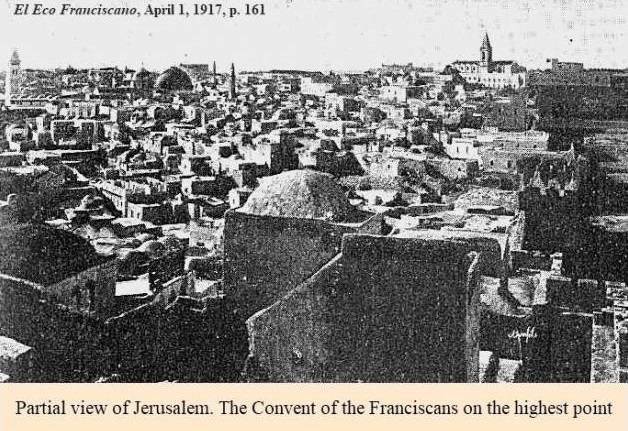
December 6, 1917. El Diario de Pontevedra, year XXXIV, number 10100, page 3.
News from Palestine indicate that British troops are on the outskirts of Jerusalem and that the Turks evacuated the city.
December 12, 1917. El Diario de Pontevedra, year XXXIV, number 10105, page 2.
The general who leads the British troops on the Palestine front sends details about the taking of Jerusalem to the British Government.
On December 8 the English forces attacked Turkish positions located west of Jerusalem.
Welsh and English county troops advanced from the hamlet of Bethlehem, repelling the enemy, skirted the Holy City on its eastern side and parked on the road to Jericho.
Simultaneously Londoner infantry battalions plus dismounted Cavalry troops attacked the strong Muslim positions situated to the West and Northwest of Jerusalem.
The Cavalry maneuvered in haste and went to camp for the night on the road from Jerusalem to Shechem.
With these movements the Holy City was left completely isolated and shortly thereafter it surrendered to General Allenby.1
He and his general staff along with several British politicians, the English governor of Palestine and representatives of France and Italy waited on a mountain track to safeguard the city and the Holy Places.
On the day before yesterday the English leader accompanied by commanding officers of the French and Italian contingents and by the heads of the French political mission entered Jerusalem officially.2
The taking of Jerusalem was delayed to avoid any damage to the Holy Places, the city or its environs.
Great care was taken to that end.
September 27, 1918. El Correo Gallego, year XLI, number 14738, page 2.
London. The correspondent of the Reuters Agency in Palestine recounts the warm welcome received by the British troops in Haifa even from the German colony which endured much pillaging by the Turks. Nearly all the German colony is Württemberger.
A perfect calm reigns over the city. The British have taken charge of the municipal administration.
The number of prisoners made by the Allies poses a serious problem. Many prisoners drop on the road, extenuated; they are picked up by the wagon drivers and placed inside. The parade is endless; a German general figures among them. The loot garnered is considerable and it includes several boxes of Turkish banknotes.
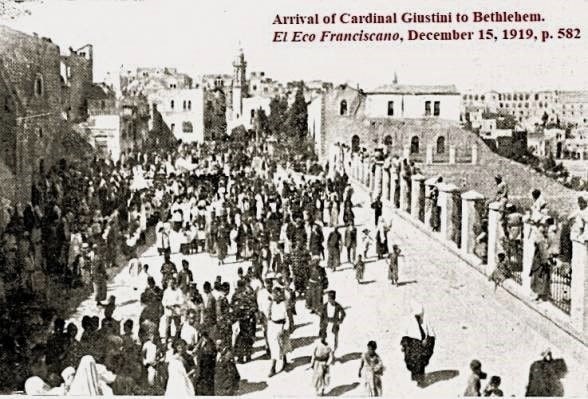
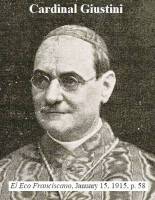
January 15, 1919. El Eco Franciscano, revista quincenal ilustrada, year XXXVI, number 608, pages 35-37.
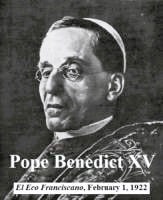
Monsignor Charmentant, distinguished Prelate and director of the schools of the East, proposes for possible consideration by the Peace Conference the convenience of handing Palestine or at least the Holy Places over to the Holy See in the sense of a "temporal dominion."
As regards Palestine—soil by all the nations desired, soil consecrated by the Redeemer of mankind, soil doused with the blood of Christians from every kingdom; holy places sustained with the alms of Catholics from all over the world, guarded and defended heroically for over seven centuries by the Franciscan Order, the most international Order present all over the round Earth, to whom Benedict XV, rewarding its secular sacrifices, has confirmed and given the holy places to in custody for the foreseeable future—we fully and ardently wish that the Holy Land be governed, respecting acquired rights, by an international Committee of Christian powers, one of whose members at least must represent the Roman Pontiff.
Catholics everywhere, we are going through grave moments when trammels will either be taken off or put on for centuries to come! Let us ask heaven for light and protection to fulfill the wishes of our most loving Father Benedict XV.1
FR. MANUEL PÉREZ
February 6, 1919. El Regional, year XXXVI, number 12193, page 2.
Palestine, i.e., the Holy Land, whose capital is Jerusalem, will be free of the Turkish yoke under the patronage of the League of Nations, which will designate a great power as the responsible agent.
This was in principle the decision adopted on January 30 at a meeting of the delegates to the Peace Conference.
According to reliable reports Great Britain will be the power responsible for guaranteeing the liberty of Palestine in consonance with the Zionist program.
The projects which envisioned Palestine as part of Arabia or as dependent upon Great Britain were apparently rejected.
The decision means the Hebrew dream (to have an independent territory) has materialized. Zionism is a fait accompli.
After a detailed, assiduous study of the question France approved the plan decidedly. The delegates of Arabia did not raise any objection.
Rumours that a North American protectorate would be established in Palestine proved groundless.
November 20, 1919. El Correo Gallego, year XLII, number 15091, page 3.
It has been ruled that Hebrew will be the official language of Palestine henceforth.1
April 28, 1920. Galicia Nueva, primer diario de Villagarcía, year XIV, number 2833, page 4.
London, 27. A dispatch from Cairo speaks of skirmishes between British troops and Arabs in Palestine.
Details are wanting, but it is believed that calm has been restored.
June 24, 1920. El Ideal Gallego, diario católico, regionalista e independiente, year IV, number 1020, page 1.
Rome, 23. Sir Herbert Samuel the new High Commissioner for Palestine has already left London for Jerusalem.1
He will stop over in Rome to hold an audience with the Pope.2
February 14, 1921. La Integridad, diario católico, year XXXIV, number 9249, page 1.
By telegraph. The king of Hejaz contended in London the legality of Great Britain's mandate in Palestine, considering it incompatible with the promises which Great Britain made some time ago.1,2 The Arabs request that a sovereign independent State be constituted, sustained by bureaucracy and English capital.
May 1, 1921. El Eco Franciscano, revista quincenal ilustrada, year XXXVIII, number 661, pages 200-202.
In the first place let it be known that he who writes these lines was present before, during and after the war; he witnessed all the political phases of Jerusalem, all the flip-flops in the hostilities, the victory and the armistice; he trembled with all Christians before the Muslims' fanatical reaction; he laboured to shield the churchly belongings from the greed of the Turkish Government and troops; with growing anxiety he watched from the height of the Judean mountains the advance of the Anglo-Egyptian army and the combats it sustained on the Sharon; he awaited impatiently the arrival of the day when the Holy Places passed from the usurping hands of the disgusting Muslim to the Christians who for so many centuries were unjustly dispossessed of them; and at times of anguish (for we were in the crossfire) he observed from the Basilica of Bethlehem terraces the displacements of the two enemy armies and the din produced by the countless machine guns and mighty artillery of the English whose shells swept the last Turkish forces away, not to mention watching the dogfights which caused us horror and forced us to retreat and go, almost out of breath, to prostrate ourselves before the Divine Infant in the Holy Grotto, beseeching him with tears in our eyes to return to the world that peace which he announced to mankind on the day of his birth here; I prayed for the poor Christians menaced by the riled Turk with internment; we prayed also for the security of our Sanctuaries; I witnessed the decisive battle of December 7-8, 1917, vigil of the Immaculate and an unforgettable day for Bethlehemites, who told me, "the Virgin has protected and liberated us on her Feast day"; and indeed, before noon on December 8, the English vanguard reached Jerusalem; finally we witnessed on December 12 [sic] the triumphal entrance of the English generalissimo Edmund Allenby to the Holy City. We saw with satisfaction that French and Italian units accompanied the English troops, and the remembrance of the Crusaders crossed my mind as some resemblance existed, given the enthusiasm of the multitude acclaiming the liberators of Jerusalem ceaselessly.
But many Protestant and especially Zionist or Jewish missions entered Jerusalem with the triumphant Allenby. Every one had freedom of access in Palestine beneath the military uniform whereas Catholic missions found closed doors no matter what stripe they wore. The Zionist missions were American, English, French and Italian. And it even appears that the Franco-Italian military extras in Palestine or at least the Italian ones (so writes the Italian newspaper, L'Avvenire d'Italia) did not come to Palestine but to camouflage the Zionist mission under their name and military insignia. The behaviour of the Colonel-Commandant of the Italian contingent is proof of this deft disguise; he was a most intelligent Hebrew of great ascendancy with the consular authority of that Nation, who later attended the conference of San Remo.1,2
While France and Italy disengaged from a political discussion of Palestine and repatriated in 1919 the armed units which guarded the Holy Sepulchre and the Holy Grotto of Bethlehem, the conference of San Remo approved the creation of an autonomous Jewish-Zionist state in Palestine, or as they said in Jerusalem, "was rolled that lump of unleavened bread baked under ash for the Jewish Passover." No one raised their voice to protest this theft and trampling of the rights of non-Hebrew Palestinians. Not even the organs of law-abiding parties raised the alarm against this enormous injustice sanctioned by the conference of San Remo. It was a conspiracy of silence, the complicity of Christian nations or of their representatives who endorsed so odd a motion, or better said, contrary to the rights of Catholics. Even the Catholic press failed in general to grasp the reach of the statute ratified at San Remo which condemns non-Jewish Palestinians to ostracism (I refer to the indigenous Christians and Muslims) for, according to the good law, they will be treated as foreigners in the country.3
Is is not that by writing these lines I intend to anathematize the ability and shrewdness of Zionist-Hebrews at work for their cause. Or Protestant England's assistance to Zionism to the extent of imposing a Zionist Government on Jerusalem; this can be partway understood, though it be an injustice promised to the Jews during the great war as a swap for the assistance that Jewish banking lent to England and for the services rendered by the great press. However that the representatives of Catholic Nations should approve a novel Zionist statute is an inconceivable thing against which one protests. It is an injustice and even a betrayal of Christianity for the bad tree can not yield good fruit. Withal the Western Nations did not ally with or fight alongside England—or their soldiers sacrifice their lives—so that afterward vanquished Jerusalem should be delivered to the degenerate Jewish lineage. Nor did Jerusalem's bells ring out merrily for that cause on the day of Jerusalem's conquest, nor was the Te Deum sung in all the Churches of the Christian-Catholic world. Faced with so great an injustice everyone kept mum. O servile, criminal silence!...
SPICULATOR
May 14, 1921. El Ideal Gallego, diario católico, regionalista e independiente, year V, number 1260, page 3.
London, 13. The situation in Palestine is ominous.
Jews and Muslims engage in continuous brawls.
June 16, 1921. La Integridad, diario católico, year XXXIV, number 9354, page 3.
By telegraph. Jaffa awaits a vessel bringing 500 Jews to this city.1,2,3
The alarmed citizenry plans to oppose the disembarkation.
The workers have resolved to impede the conveyance of Jews over the land.
As a result disorders have broken out in which two Jews were killed and eight injured.
June 17, 1921. La Voz de la Verdad, diario católico antiliberal con censura eclesiástica, year XI, number 3641, page 1.
The Pope presided over a secret Consistory attended by all the Cardinals resident in Rome and by the Cardinal of Warsaw.1,2
His Holiness delivered a short address lamenting the privileged and preponderant status of the Jews in Palestine—a situation he deems dangerous for the Christians—and bemoaning the plans of the Jews to convert a region that assembles together the most august mementos of the Christian Religion into a venue for pleasure.
"We the Christians," said the Pope in closing, "must grapple with the Society of Nations for a study of the framework of England's mandate in Palestine."
June 20, 1921. La Integridad, diario católico, year XXXIV, number 9357, page 1.
Winston Churchill the English Minister of the Colonies has tabled in the House of Commons a proposed budget worth more than 27 million Sterling Pounds.1
Those millions will cover the expenses of the so-called Middle East, i.e., Mesopotamia and Palestine.
Churchill wishes that both countries should be autonomous and have their own Government.
He proposes the crowning of an Arab sovereign elected by the natives for Mesopotamia with the sole condition that he should be a persona grata to Great Britain.
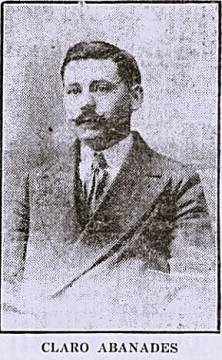
In other words, he wishes that the ancient country where Chaldeans and Assyrians forged a great empire be granted a sovereign without sovereignty, something like a cork oak without cork or like an English walnut tree without walnuts. England will provide the cork and the walnuts in exchange for the miserly production of the valleys of the Tigris, Euphrates and Shatt Al-Arab.2
According to Churchill it is necessary to prepare a Palestinian home for the Jewish race. There a people was formed whom Titus dissolved and whom Great Britain wants to reorganize.
Churchill says that Great Britain must curb the egress of Israelites from Palestine because Albion promised to create a nation for them there.3
Churchill discounts the curse that weighs down on the deicides. A new Julian tries to settle Judaism where Our Lord Jesus Christ was crucified by the accursed race, where Godfrey refused to be crowned king because they had set a crown of thorns on the Son of God there.
Will England succeed? No, she will not succeed. The mere attempt has already cost a lot of blood. Christians and Muslims are upset and protest the English desire. The Jews are not wanted there. The mere news that an expedition of Jews is going to arrive in Jaffa has riled its inhabitants and stirred them to block the disembarkation by all means at their disposal, disregarding the orders coming from Great Britain promising to interfere not in the internal affairs of the country.
The Jews will never jell into a people because it has been decreed so already. Twenty centuries have elapsed and, in spite of the efforts exerted to the contrary, the Jews are still scattered all over the world.
Withal England carries the destroying spirit in her. She wants to assert her dominion over the world, and presently she strives for anarchy to take hold in those formerly peaceful regions of Asia. The arrival of Jews will spark riots and wars.
The thing is to rattle the peoples; and Albion brings that off indeed...
Clarabana 4
June 25, 1921. El Compostelano, diario independiente, year II, number 412, page 1.
The politicians of Great Britain labour to establish the home of the deicide race in Palestine.
The ambitions of the Jews enjoy the support of the "makers" of nations.
The Jewish people, encouraged by England, wish to put their footprint and to create a nationality in the holy places where the mysteries of mankind's Redemption transpired.
Let us recall à propos the famous letter that Lord Balfour published and addressed to the multimillionaire Jewish Lord Rothschild.1,2
Dear Lord Rothschild,I have much pleasure in conveying to you, on behalf of His Majesty's Government, the following declaration of sympathy with Jewish Zionist aspirations which has been submitted to, and approved by, the Cabinet.
His Majesty's Government view with favour the establishment in Palestine of a national home for the Jewish people, and will use their best endeavours to facilitate the achievement of this object, it being clearly understood that nothing shall be done which may prejudice the civil and religious rights of existing non-Jewish communities in Palestine, or the rights and political status enjoyed by Jews in any other country.
I should be grateful if you would bring this declaration to the knowledge of the Zionist Federation.
Yours sincerely,
Arthur James Balfour 3
The above letter was a promise. And the Englishmen whom the mandate of Palestine was entrusted to endeavour to fulfill that promise.
But the protests have not tarried. The Muslims protest, the Catholics protest, the schimatics and the Protestants protest. The majority of the population in Palestine opposes the invasion of the Jews and the upheavals triggered by the arrival of Jews have been of such magnitude that we do not hesitate to assert that if the current of immigration is not curtailed war will break out anew in that land of wonders, font of the most marvellous poetry and site where mankind's greatest event occurred.
* * *

The protestation of the Sovereign Pontiff would not be wanting. The Holiness of Benedict XV too opposes the projects of Great Britain.
The Pope at the latest Consistory has expressed his fears that the Jews will possess the Holy Places. The Pope has said,
You will certainly remember that at the secret Consistory of March 10, 1919, we displayed our considerable worry at the turn of events in Palestine after the war; a land consecrated by the Divine Redeemer in his mortal life and beloved of Us and of every Christian heart. And that apprehension of ours, far from diminishing, is increasing by the day.The soil where Christianity and Charity bloomed—visited by Godfrey of Bouillon, Tancred the Brave, Raymond of Saint-Gilles, Hugh the Great, Richard the Lionheart, the Baldwin dynasty and the Knights Templar—is purposed to be given to the descendants of the assassins of the Son of God.
His Holiness reveals in his speech that he experienced great joy when the Allied troops recovered the places trodden by the Saviour, but he appends,
That joy of ours was not exempt from the concern, expressed in the cited Consistorial address, that after such a magnificent and happy event the Israelites could find themselves in a situation of preponderance or privilege in Palestine. Judging by the current state of affairs what we feared has been amply realized. It is public knowledge that the situation of Christians in Palestine not only has not improved but has worsened considerably under the new regulations promulgated there which tend—if not intentionally, certainly objectively—to eject Christianity from the positions it had until now in order to install Hebrews in them.
And the Pope's voice rises presently to demand justice and exhort everyone to peace with these words,
Since the status of Palestine is not definitively enacted, We raise our voice forthwith so that when the time arrives to give stable governance to Palestine the inalienable rights of the Catholic Church and of all Christians shall be guaranteed. We certainly do not wish to infringe the rights of the Hebrew element, but we understand that theirs must not overlap the Christians' rights in any way. And to this end we fervently exhort the Governments of all Christian nations, non-Catholic included, to watch over and to contend before the Society of Nations which, it is said, must peruse the conditions binding the English mandate in Palestine.Christendom must not consent that Hebrews become the landlords of those regions full of holy reminders.
The sea of Tyre on which the ships of the prophet King sailed to inspect the lofty cedars of Lebanon's mountains and the Sidonian purple or that sea which borders Galilee's meadows and the plain of Ashkelon must not be—shall not be—though Albion the current lady of the seas tries her hardest—fee of the race cursed for the greatest crime in History...
Clarabana 4
September 9, 1921. La Integridad, diario católico, year XXXIV, number 9425, page 1.
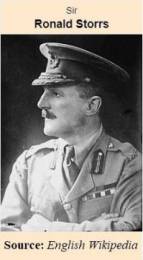
Great importance is attributed to the private audience that His Holiness granted General Storrs the military governor of Jerusalem who stopped over in Rome on his way to London a short while ago; he is now in London conferring with the central authorities.1
The imprudent behaviour of the Zionist organizations and their violent interpretation of the Balfour Declaration on the "national Home for the Jews in Palestine" has altered the public mood markedly. This together with the voluntary distancing of several prominent American Zionists will probably bring about the revision of the original tenets for the Mandate of Palestine.
Although the High Commissioner in Palestine is Jewish, the military governor of Jerusalem is Anglican, the son of a distinguished dignitary of the Anglican Church. His personal view sides with those who worry over the safeguard of Christian interests in Palestine, in light of which the private audience of the governor with the Pope assumes exceptional importance.
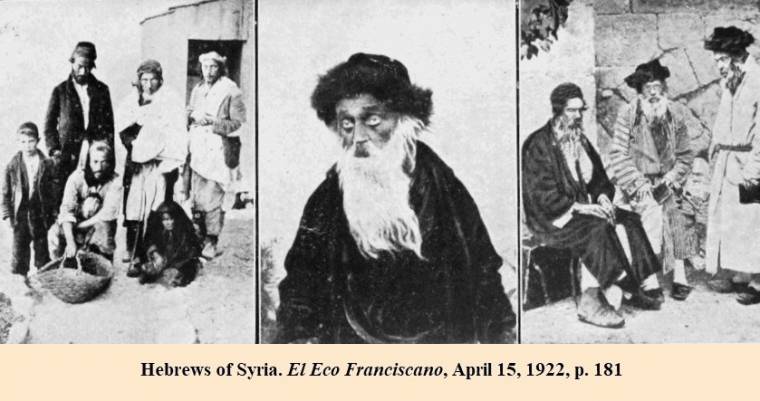
July 5, 1922. El Compostelano, diario independiente, year III, number 719, page 1.
Here is the literal text of the communication which Cardinal Gasparri the secretary of the Holy See has sent to the Society of Nations regarding the project of the British mandate over Palestine.1,2
The Holy See does not oppose that Jews have civil rights in Palestine equal to those enjoyed by other nationalities and religious confessions; but it can not give its consent to:First. That Jews should obtain a privileged and preponderant position in respect of the remainder of nationalities and religious confessions.
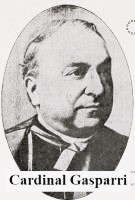
Second. That the rights of Christian denominations be insufficiently guaranteed.
In regard to the first point the project [i.e., the British Mandate] pretends to establish an absolute economic, administrative and political preponderance of the Jewish element to the detriment of the remainder of nationalities.
Such a project is in disagreement with Article 22 of the Treaty of Versailles which sets down the nature and goal of any mandate.
In regard to the second point article 14 of the project must be gone over; it establishes that a special Commission shall examine and regulate all the affairs and claims pertaining to the various religious confessions.
The Commission, made up of an unspecified number of members, must include representatives of all the religions whose interests hang in the balance. Evidently the Holy See can not consent that Catholic affairs be administered by representatives unelected by the hierarchical authorities.
The Commission must also ensure that holy places and religious buildings especially venerated by the followers of a particular religion shall be under continual inspection by appropriate corporations authorized by the adherents to that particular religion. The terms of article 14 are so vague that it breeds numerous difficulties when sanctuaries involve more than one religious confession.
It is therefore necessary to forestall the strife that will plague this Commission and expose article 14 as unworkable. The Holy See volunteers the suggestion that the Commission's members be instead the Consuls assigned to Jerusalem by the powers with representation on the Council of the League of Nations.
July 28, 1922. El Ideal Gallego, diario católico, regionalista e independiente, year VI, number 1586, page 2.
An Arab Delegation of Palestine has sent a note to the League of Nations protesting the ratification of the British mandate over Palestine.
They also protest the establishment of a national Jewish State.
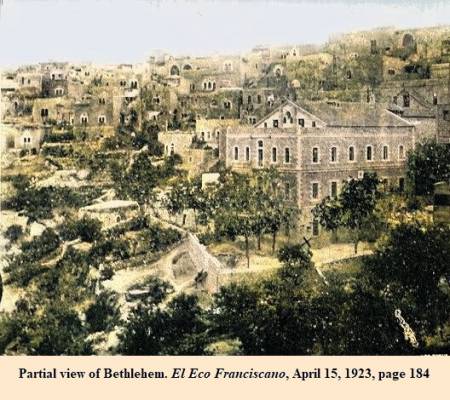
March 15, 1923. El Eco Franciscano, revista quincenal ilustrada, year XL, number 706, page 139.
At long last the census of Palestine was published after a wait of several months. The census did not bring great satisfaction to the Jews, they expected to number more. Palestine has 757,182 inhabitants. These are distributed by faith allegiance as follows: 590,890 Muslims; 83,794 Jews and 73,024 Christians. The remainder groups various other faiths. The official figures were published in the newspaper Palestine Weekly which bemoans the fact that although there were 100,000 Jews before the [First World] war and at least 25,000 had immigrated since, presently the Jews number only 83,794. The paper comforts itself with the Christian statistic, for subtracting the 3,000 Armenian orphans and the 5,000 Westerners who will soon depart the country from the census figure of 73,024 means that the number of Christians in Palestine will drop to 65,000 approximately.
The same could be said by us about the Jews. Although it is true that many come from Europe and North America it is also true that many go back, disillusioned with not finding the plenty and wealth they had hoped for in their fancied land of promise of their forefathers and disappointed too with the mistrust of Jews who have dwelled in this country since antiquity and who publicly protested the newcomers' behaviour, saying that Zionists only ruin the peace they had previously enjoyed with the indigenous population.1 In this regard the Great Rabbi deemed it his duty to publish an open letter to the Israelite workers and employers calling out the bad impression they have given everyone with their mockery of religious practices.
Contravening the widest possible freedom of religion guaranteed by Article 15 of the Mandate for Palestine—approved in London during July 1922—the Great Rabbi was notified that no European Jew may change his religion without a permit from the corresponding government, that no Jew will be allowed to change religion until they are twenty years old and that those who wish to do so must first appear before the Great Rabbi who must legalize their conversion to another religion if he fails to dissuade them. This procedure hampers significantly the switch to the Catholic religion by the few Jews who, convinced of Judaism's falsehood, wished to embrace Catholicism; the odd case of this nature had been occurring.
Thus are regulations arbitrarily understood and interpreted!
ARACIL Y PONS.
Jerusalem. February 1923.
April 27, 1923. El Compostelano, diario independiente, year IV, number 958, pages 1-2.
In order to tender some justification for her policy and desiring to mete a light sedative to the bristly tempers England declared that since Arabs are incapable of governing themselves, all the more are they incapable of occupying the high echelons of the State... those with the highest pay.
Facts indicate that the opposite is true. In the previous administration of Palestine, before the British occupation, there was less bureaucracy, fewer parasites, not a single Hebrew, and yet matters worked out equally well. A substantive example. Four or five employees managed everything at the Treasury, Jerusalem's chief livelihood. Now 89 do not suffice. Of these more than a third are Hebrews who altogether garner annually the nice sum of 23,895 Egyptian liras ≡ 621,270 gold Francs. Thus prospers poor Palestine under the Hebrews' protection!
All Arab city dwellers educated and taught in the flourishing European boarding schools which are plentiful in Palestine speak three or four languages fluently.
Zionist organs expose clearly the source of the trouble in Palestine. In one of the tragic instances when Hebrew discontent vented most vividly shortly after the disorders of Jaffa (they judged British protection sparse), The Jewish Chronicle of July 22, 1921, wrote on page 22,
It is very difficult to discover the source of this problem and apply a remedy to it. It is not enough to say that the Arab population is up in arms because of the Balfour Declaration...; it is necessary to examine the root and origin of everything. Let us examine the main causes foremost: except for the British holders of top Government jobs the rest of the civil servants knows nothing and lacks initiative. They do not understand the temperament of Arabs or Hebrews. Most are army veterans, officers and lower ranks... It is necessary to grasp that not one had the least acquaintance with or training to handle civilian affairs.
No comments are necessary.
Since we have remembered the bitter moments currently experienced by Palestine we shall also remember how the peacetime works and unfolds in the Anglo-Zionist kingdom.
Say the tattletales...that when the Hebrew Committee informed Sir H. Samuel about the turmoil in Jaffa he replied, "If Hebrew leaders express their mistrust publicly I am prepared to quit my post; but it may be that a substitute High Commissioner will be sent who is a friend of the Arabs!" Wherefore peace once more shone in the clear sky of Palestine between the British crafters of the Kingdom of Zion and the raw material of this same Kingdom, Hebrew immigrants.
Thus calm abode patiently, stubbornly, until the Zionist intrusion reached in our days all public administration branches. Today all the gros bonnets of the administration are Zionists: Sir Samuel the High Commissioner; Mr. Bentroich the Legal Secretary, Minister of Grace and Justice; Mr. Solomon the Director of Customs; Mr. Beeds the Civil Secretary, Minister of the Interior; Mr. Montefiori the Chief of Police, have at their beck and call a bureaucracy that is more than 50% made up of fanatical Zionists and whose top and best-paid jobs are in the hands of Zionists.1,2,3
Understandably under such conditions Zionism has found it easy to accomplish veritable miracles in the span of a few months.
Fra Luis Aldrey Pereira.
Bethlehem. April 10, 1923.
July 1, 1923. El Eco Franciscano, revista quincenal ilustrada, year XL, number 713, page 294.
Lately we have managed to convert some adults. On Holy Saturday [March 31, 1923] our parish priest in Bethlehem baptized a Muslim youth nineteen years old. In the month of April the same parish priest baptized a 25-year-old Jew and the parish priest of Jerusalem a 37-year-old Jew. Following the Baptism they received Holy Communion and the Sacrament of Confirmation.
* * *
Sir Ellis Kadoorie the well-known philanthrope has left an inheritance of 100,000 Pounds Sterling to the English government destined for the schools of Palestine and Mesopotamia.1 By decision of the same government and of the executors of his will the entire sum will go toward the construction of Hebrew schools in Palestine.2,3
Catholic missionaries need similar legacies so that considerably more work might be done for the good cause.
* * *
We know from the local newspapers that the amount of Palestinian land purchased by the Jews is 775,000 donums to date (1 donum = 900 square meters). The land purchases are distributed as follows. 180,000 donums in Judea (i.e., Jerusalem and environs); 170,000 donums in Samaria; 235,000 donums in the Lower Galilee; 100,000 donums in the Upper Galilee and 90,000 donums east of the Jordan River.
Total: 775,000 donums = 697.500.000 square meters of land have passed from indigenous to Israelite ownership.4
Fr. ANTONIO ARACIL.
Jerusalem, May 1923.
November 17, 1923. El Ideal Gallego, diario católico, regionalista e independiente, year VII, number 1923, page 6.
Spurred by material and political interests, though racial and religious angles were adduced for the attempt, the Jews wanted to restore the kingdom of Israel; but the weight of facts, more powerful than the handiwork of men, is felling the work done and even its original aims.
As in the memorable construction of the Tower of Babel when God's finger bred confusion in the languages to punish human folly at the precise moment when Pride thought herself victorious, so it is with the Zionist adventure: when Jewish banks had bestowed their gold, nations their acquiescence, England espoused the project and thousands of Israelites from all corners of the globe had settled in their ancient homeland, presently a "national home," lo! the Zionist leadership recently gathered at the Carlsbad Congress resolves that the "current circumstances do not permit the creation of a Jewish fatherland in Palestine".1
Should the solemn fiasco be pinned on the immigration of the "undesirables, ill-suited, rapacious and troublemakers," for whom a British correspondent urges immediate repatriation? Must the determinant factors be imputed to the unyielding soil and expensive tillage, to the aggravation that Jews experience on changing their traditional career in commerce for a new one in agriculture, to the immigrants' steep mortality rate—a point brought up by some writers also—or might all these factors rather be merely the means by which God's providence has watched over the Holy Land?
* * *
The hard and bitter word of failure and defeat is not from our harvest.
Writes a Judeo-Palestinian newspaper, the Doar Hajon,2
We are witnessing here in Jerusalem wholesale emigration like never before was seen since the colony started. Hebrews leave the country en masse. It is heartrending to see the faces of those poor men and hear their bitter tales. Any effort to contain the migratory flow would prove futile because it would always meet the same response: our patience is limited, we have no faith in the future. Meantime, while this is happening, no prospects of an improvement are forthcoming. The emigrants know that America has shut its doors, that London has thousands of unemployed, that there is revolution in Mexico, that the yellow fever ravages Brazil, that persecution of the Jews is on the order of the day in Argentina—notwithstanding the emigration runs on. What does it matter if 30,000 arrive when 20,000 depart, and the former are unfamiliar with the tough living conditions of the country?
J. POLO BENITO.
December 1, 1923. El Eco Franciscano, revista quincenal ilustrada, year XL, number 723, page 536.
On October 1 the so-called Patriarchal University of Jerusalem opened its doors in the premises of the old Latin Patriarchal Seminary to 250 young men from all over Palestine, Catholics and Muslims.1,2 Its main object is to have an Arab College where Arab language and literature are taught alongside Medicine, Law, Architecture, Social Works, Commerce, etc.
* * *
The Muslims also try to found another Muslim university in Palestine that may serve as an intellectual and religious center for the formation of ulemas and ministers of the Islamic cult, muftis, qadis, lawyers, orators and teachers, according to the manifesto published by the high Muslim Legislative Council of Palestine.3,4,5,6 They already have a new Arab library housing about 3,000 volumes in the dependencies of the Mosque of Omar.7
* * *
The Jews are having not a few headaches establishing their national home in Palestine. Systematic opposition of the Arabs on the one hand and insufficiency on the other compel many Jews to purchase every week the return ticket to the distant countries of Europe and America. May they enjoy a good voyage and never return.
* * *
Emir Abdullah the sovereign of Transjordan, ordained King of that country last May, has come to Jerusalem.8 He was already attacked by an influential Bedouin chieftain of that region who, at the head of a strong band of rebels, besieged Amman the kingdom's new capital with the intention of deposing him.9 This once the coup failed and the rebel chieftain got the worse share with many dead and wounded.
Fr. ANTONIO ARACIL, O.F.M.10
Jerusalem, October 1923.
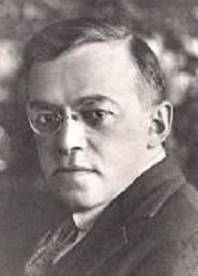
Source: Wikipedia.
Ziv Jabotinsky (1880-1940) was a Zionist author and partisan. He joined the movement prior to the Kishinev pogrom of 1903. As more pogroms loomed, he created the Jewish Self-Defense Organization throughout Russia. He learned modern Hebrew and changed his name from Vladimir to Ziv ("Wolf"). He co-edited Yevreiskaya Zhyzn (Jewish Life) in 1904 and railed against assimilation and the Bund. In 1938 he advised European Jews to emigrate to Palestine as fast as possible. When Great Britain restricted Jewish immigration to Palestine in 1939 Jabotinsky first proposed an armed uprising against the British, then offered them his collaboration at the outbreak of the Second World War. The mortal remains of Jabotinsky and his wife were moved to Israel in 1964. Full article here.
It is utterly impossible to obtain the voluntary consent of Palestinian Arabs for converting "Palestine" into a country of Jewish majority.
My readers have a broad idea of the history of colonization. I suggest that they consider all precedents they are acquainted with and find one instance of colonization done with the consent of the native population. There is no such precedent.
We cannot offer Palestinian Arabs adequate compensation in return for Palestine. Hence there is no chance of reaching a voluntary agreement.
Zionist colonization must either stop or proceed without regard for the native population.
That is our Arab policy. Not what it should be, but what is, whether we admit it or not. What need, otherwise, of the Balfour Declaration? Or of the Mandate? Their worth to us is that an external Power has undertaken a work of administration and security that will make it impossible for the native population to hamper our work.
And all of us without exception are demanding day after day that this external Power carry out this task vigorously and resolutely.
The only disagreement on this matter between our "militarists" and our "vegetarians" is that the former prefer the iron wall to be made of Jewish soldiers whereas the latter are happy to let British soldiers do it.
We hold that Zionism is moral and just. And since it is moral and just, justice must be done whether Joseph, Simon, Ivan or Achmet agrees with us or not.
As long as the Arabs retain the least hope of getting rid of us they will not trade it for either kind words or bread and butter because they are not a rabble but a living people. And a living people yields in such vital matters only when all hope vanishes. Then they will brush aside their extremist leaders whose watchword is "Never!" and hand the leadership over to moderates.
And when that happens I am convinced that we Jews will be found ready to give them satisfactory guarantees that both peoples can live together in peace as good neighbours.
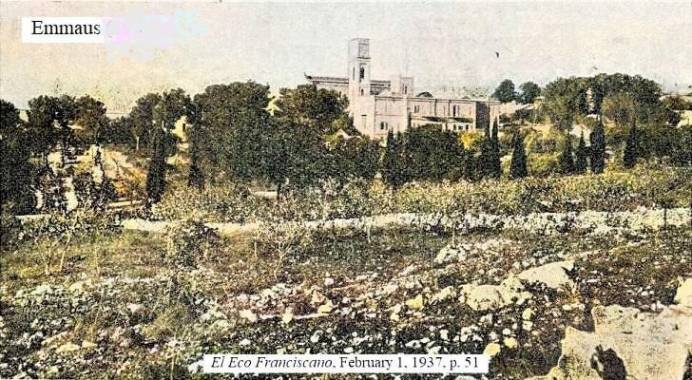
Baseline source: Encyclopedia Britannica entry.
During the First World War the great powers planned the future of Palestine without regard for indigenous feelings. During 1915-16 Great Britain seemed to promise the Arabs an independent kingdom if they would turn on their fellow Muslims of the Ottoman Empire. The Arabs went ahead and betrayed the Ummah. In May 1916 Great Britain, France and Tsarist Russia double-crossed the Arabs and schemed a post-war Palestine under multinational administration. On November 2, 1917, the Arthur Balfour declaration double-crossed the crumbling provisional government of Petrograd and promised the Zionists a Jewish national home in Palestine.
Palestine was hard-hit by the war. In addition to wartime destruction the population was struck with famine, epidemics and Ottoman reprisals against Arab separatists. Major battles took place at Gaza before the British with some French and Italian detachments captured Jerusalem in December 1917. The rest of Palestine was taken by October 1918.1
The Palestinians made clear their opposition to the Zionist goals early, in February 1919 and March 1920.2 However the peace conference of San Remo (Italy) in April dismissed the Arab complaints and summarily assigned Syria and Lebanon to France and Palestine to Great Britain.3 The hope of founding an autonomous Arab Palestine within a broader Arab federation evaporated. That same April anti-Zionist riots erupted at Jerusalem.
Sir Herbert Samuel was appointed the first high commissioner in July.4 His administration proceeded to implement the Balfour Declaration.
On May 1, 1921, graver anti-Zionist riots broke out in Jaffa and spread farther afield.5,6 Nearly 100 persons were killed. An Arab delegation of notables visited London in August–November to demand the annulment of the Balfour Declaration and its replacement with a Palestinian government elected democratically by Muslims, Christians and Jews.7
In June 1922 the British government issued a White Paper equivocating that Great Britain did “not contemplate that Palestine as a whole should be converted into a Jewish National Home, but that such a Home should be founded in Palestine".8
The following month the Council of the League of Nations approved the mandate for Palestine. Its preamble incorporated the Balfour Declaration and justified its inclusion by pointing to the ancestral link between the Jews and Palestine. Article 2 made England responsible for placing Palestine under such “political, administrative and economic conditions as will secure the establishment of the Jewish National Home ... and the development of self-governing institutions.” Article 4 postulated a Jewish Agency to advise and cooperate with the British administration in matters appertaining to the Jewish national home. Article 6 enjoined the British administration to encourage the Jewish colonization of Palestine.
On September 29, 1923, the British mandate went into force officially.
British rule in Palestine was in general conscientious, efficient and responsible. The British developed administrative institutions, municipal services, public works and transport. They laid water pipelines, expanded ports, extended railway lines and supplied electricity. They were less assiduous in promoting education particularly in the Arab sector, and they were hampered by the prevailing animosity and violence between Arabs and Jews.
In the history of colonization there is no precedent for an imperialist power respecting the will of the conquered people.
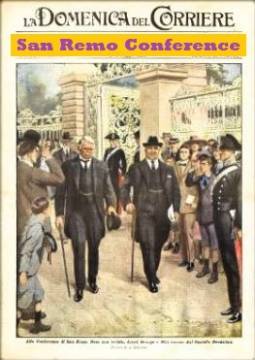
This does not deter ingenuous indigenous people from initially welcoming the new overlord, glad to be rid of the old one.1
There is also no historical precedent for an imperialist power undertaking a colonization project to settle a separate nationality.
England the first post-war colonizer of Palestine is responsible for the mess it left behind in 1948.
France, Italy and the U.S. share secondary responsability for giving their consent to the statute of the British mandate for Palestine at the San Remo Conference of April 1920.2
The Arabs own their share of guilt for having turned on their Muslim brothers, the Turks, during the First World War.3
In 1920 the Hebrews closed a 28-year mortgage on a house with the down payment made by the British administration of Sir Herbert Samuel.
What guilt could the Hebrew beneficiaries possibly have?
The baseline source of historical information states,
The years 1923–29 were relatively quiet; Arab passivity was partly due to the drop in Jewish immigration in 1926–28. In 1927 the number of Jewish emigrants exceeded that of immigrants, and in 1928 there was a net Jewish immigration of only 10 persons.1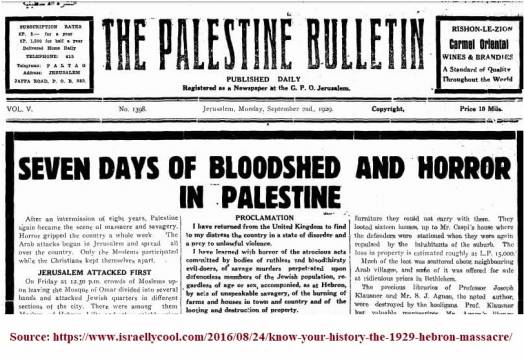
In August 1929 a dispute in Jerusalem concerning religious practices at the Western Wall—sacred to Jews as the only remnant of the Second Temple of Jerusalem and to Muslims as the site of the Dome of the Rock—flared up into serious communal clashes in Jerusalem, Zefat, and Hebron. Some 250 were killed and 570 wounded, the Arab casualties being mostly at the hands of British security forces.
A royal commission of inquiry under the aegis of Sir Walter Shaw attributed the clashes to the fact that "the Arabs have come to see in Jewish immigration not only a menace to their livelihood but a possible overlord of the future".2 A second royal commission, headed by Sir John Hope Simpson, issued a report stating that there was at that time no margin of land available for agricultural settlement by new immigrants. These two reports raised in an acute form the question of where Britain's duty lay if its specific obligations to the Zionists under the Balfour Declaration clashed with its general obligations to the Arabs under Article 22 of the Covenant of the League of Nations.3
Encyclopedia Britannica (superscripts mine.—EFC).
Accessed August 22, 2024.
England waffled for the first time following the August 1929 riots. On October 20, 1930, the government published the Passfield White Paper. Then it caved in to Zionist pressure and rescinded the Paper in a letter written by Prime Minister Ramsay Macdonald to Chaim Weizmann on February 13, 1931.4,5
When your rudder starts to jam, head swiftly to port.
Prime Minister Ramsay Macdonald should have done in 1930 what England did in 1948.6
The long-standing but frequently ignored lesson taught by the dénouement of the British Mandate is that no country should meddle in the internal affairs of other nations or peoples even if the intervention is begun with the best of intentions in mind, for the road to hell is paved with good intentions.
| When I Was a Child in Ferrol, Spain (1953-65) |